Computer Science Thesis Topics

This page provides a comprehensive list of computer science thesis topics , carefully curated to support students in identifying and selecting innovative and relevant areas for their academic research. Whether you are at the beginning of your research journey or are seeking a specific area to explore further, this guide aims to serve as an essential resource. With an expansive array of topics spread across various sub-disciplines of computer science, this list is designed to meet a diverse range of interests and academic needs. From the complexities of artificial intelligence to the intricate designs of web development, each category is equipped with 40 specific topics, offering a breadth of possibilities to inspire your next big thesis project. Explore our guide to find not only a topic that resonates with your academic ambitions but also one that has the potential to contribute significantly to the field of computer science.

1000 Computer Science Thesis Topics and Ideas

Academic Writing, Editing, Proofreading, And Problem Solving Services
Get 10% off with 24start discount code, browse computer science thesis topics:, artificial intelligence thesis topics, augmented reality thesis topics, big data analytics thesis topics, bioinformatics thesis topics, blockchain technology thesis topics, cloud computing thesis topics, computer engineering thesis topics, computer vision thesis topics, cybersecurity thesis topics, data science thesis topics, digital transformation thesis topics, distributed systems and networks thesis topics, geographic information systems (gis) thesis topics, human-computer interaction (hci) thesis topics, image processing thesis topics, information system thesis topics, information technology thesis topics.
- Internet Of Things (IoT) Thesis Topics
Machine Learning Thesis Topics
Neural networks thesis topics, programming thesis topics, quantum computing thesis topics, robotics thesis topics, software engineering thesis topics, web development thesis topics.
- Ethical Implications of AI in Decision-Making Processes
- The Role of AI in Personalized Medicine: Opportunities and Challenges
- Advances in AI-Driven Predictive Analytics in Retail
- AI in Autonomous Vehicles: Safety, Regulation, and Technology Integration
- Natural Language Processing: Improving Human-Machine Interaction
- The Future of AI in Cybersecurity: Threats and Defenses
- Machine Learning Algorithms for Real-Time Data Processing
- AI and the Internet of Things: Transforming Smart Home Technology
- The Impact of Deep Learning on Image Recognition Technologies
- Reinforcement Learning: Applications in Robotics and Automation
- AI in Finance: Algorithmic Trading and Risk Assessment
- Bias and Fairness in AI: Addressing Socio-Technical Challenges
- The Evolution of AI in Education: Customized Learning Experiences
- AI for Environmental Conservation: Tracking and Predictive Analysis
- The Role of Artificial Neural Networks in Weather Forecasting
- AI in Agriculture: Predictive Analytics for Crop and Soil Management
- Emotional Recognition AI: Implications for Mental Health Assessments
- AI in Space Exploration: Autonomous Rovers and Mission Planning
- Enhancing User Experience with AI in Video Games
- AI-Powered Virtual Assistants: Trends, Effectiveness, and User Trust
- The Integration of AI in Traditional Industries: Case Studies
- Generative AI Models in Art and Creativity
- AI in LegalTech: Document Analysis and Litigation Prediction
- Healthcare Diagnostics: AI Applications in Radiology and Pathology
- AI and Blockchain: Enhancing Security in Decentralized Systems
- Ethics of AI in Surveillance: Privacy vs. Security
- AI in E-commerce: Personalization Engines and Customer Behavior Analysis
- The Future of AI in Telecommunications: Network Optimization and Service Delivery
- AI in Manufacturing: Predictive Maintenance and Quality Control
- Challenges of AI in Elderly Care: Ethical Considerations and Technological Solutions
- The Role of AI in Public Safety and Emergency Response
- AI for Content Creation: Impact on Media and Journalism
- AI-Driven Algorithms for Efficient Energy Management
- The Role of AI in Cultural Heritage Preservation
- AI and the Future of Public Transport: Optimization and Management
- Enhancing Sports Performance with AI-Based Analytics
- AI in Human Resources: Automating Recruitment and Employee Management
- Real-Time Translation AI: Breaking Language Barriers
- AI in Mental Health: Tools for Monitoring and Therapy Assistance
- The Future of AI Governance: Regulation and Standardization
- AR in Medical Training and Surgery Simulation
- The Impact of Augmented Reality in Retail: Enhancing Consumer Experience
- Augmented Reality for Enhanced Navigation Systems
- AR Applications in Maintenance and Repair in Industrial Settings
- The Role of AR in Enhancing Online Education
- Augmented Reality in Cultural Heritage: Interactive Visitor Experiences
- Developing AR Tools for Improved Sports Coaching and Training
- Privacy and Security Challenges in Augmented Reality Applications
- The Future of AR in Advertising: Engagement and Measurement
- User Interface Design for AR: Principles and Best Practices
- AR in Automotive Industry: Enhancing Driving Experience and Safety
- Augmented Reality for Emergency Response Training
- AR and IoT: Converging Technologies for Smart Environments
- Enhancing Physical Rehabilitation with AR Applications
- The Role of AR in Enhancing Public Safety and Awareness
- Augmented Reality in Fashion: Virtual Fitting and Personalized Shopping
- AR for Environmental Education: Interactive and Immersive Learning
- The Use of AR in Building and Architecture Planning
- AR in the Entertainment Industry: Games and Live Events
- Implementing AR in Museums and Art Galleries for Interactive Learning
- Augmented Reality for Real Estate: Virtual Tours and Property Visualization
- AR in Consumer Electronics: Integration in Smart Devices
- The Development of AR Applications for Children’s Education
- AR for Enhancing User Engagement in Social Media Platforms
- The Application of AR in Field Service Management
- Augmented Reality for Disaster Management and Risk Assessment
- Challenges of Content Creation for Augmented Reality
- Future Trends in AR Hardware: Wearables and Beyond
- Legal and Ethical Considerations of Augmented Reality Technology
- AR in Space Exploration: Tools for Simulation and Training
- Interactive Shopping Experiences with AR: The Future of Retail
- AR in Wildlife Conservation: Educational Tools and Awareness
- The Impact of AR on the Publishing Industry: Interactive Books and Magazines
- Augmented Reality and Its Role in Automotive Manufacturing
- AR for Job Training: Bridging the Skill Gap in Various Industries
- The Role of AR in Therapy: New Frontiers in Mental Health Treatment
- The Future of Augmented Reality in Sports Broadcasting
- AR as a Tool for Enhancing Public Art Installations
- Augmented Reality in the Tourism Industry: Personalized Travel Experiences
- The Use of AR in Security Training: Realistic and Safe Simulations
- The Role of Big Data in Improving Healthcare Outcomes
- Big Data and Its Impact on Consumer Behavior Analysis
- Privacy Concerns in Big Data: Ethical and Legal Implications
- The Application of Big Data in Predictive Maintenance for Manufacturing
- Real-Time Big Data Processing: Tools and Techniques
- Big Data in Financial Services: Fraud Detection and Risk Management
- The Evolution of Big Data Technologies: From Hadoop to Spark
- Big Data Visualization: Techniques for Effective Communication of Insights
- The Integration of Big Data and Artificial Intelligence
- Big Data in Smart Cities: Applications in Traffic Management and Energy Use
- Enhancing Supply Chain Efficiency with Big Data Analytics
- Big Data in Sports Analytics: Improving Team Performance and Fan Engagement
- The Role of Big Data in Environmental Monitoring and Sustainability
- Big Data and Social Media: Analyzing Sentiments and Trends
- Scalability Challenges in Big Data Systems
- The Future of Big Data in Retail: Personalization and Customer Experience
- Big Data in Education: Customized Learning Paths and Student Performance Analysis
- Privacy-Preserving Techniques in Big Data
- Big Data in Public Health: Epidemiology and Disease Surveillance
- The Impact of Big Data on Insurance: Tailored Policies and Pricing
- Edge Computing in Big Data: Processing at the Source
- Big Data and the Internet of Things: Generating Insights from IoT Data
- Cloud-Based Big Data Analytics: Opportunities and Challenges
- Big Data Governance: Policies, Standards, and Management
- The Role of Big Data in Crisis Management and Response
- Machine Learning with Big Data: Building Predictive Models
- Big Data in Agriculture: Precision Farming and Yield Optimization
- The Ethics of Big Data in Research: Consent and Anonymity
- Cross-Domain Big Data Integration: Challenges and Solutions
- Big Data and Cybersecurity: Threat Detection and Prevention Strategies
- Real-Time Streaming Analytics in Big Data
- Big Data in the Media Industry: Content Optimization and Viewer Insights
- The Impact of GDPR on Big Data Practices
- Quantum Computing and Big Data: Future Prospects
- Big Data in E-Commerce: Optimizing Logistics and Inventory Management
- Big Data Talent: Education and Skill Development for Data Scientists
- The Role of Big Data in Political Campaigns and Voting Behavior Analysis
- Big Data and Mental Health: Analyzing Patterns for Better Interventions
- Big Data in Genomics and Personalized Medicine
- The Future of Big Data in Autonomous Driving Technologies
- The Role of Bioinformatics in Personalized Medicine
- Next-Generation Sequencing Data Analysis: Challenges and Opportunities
- Bioinformatics and the Study of Genetic Diseases
- Computational Models for Understanding Protein Structure and Function
- Bioinformatics in Drug Discovery and Development
- The Impact of Big Data on Bioinformatics: Data Management and Analysis
- Machine Learning Applications in Bioinformatics
- Bioinformatics Approaches for Cancer Genomics
- The Development of Bioinformatics Tools for Metagenomics Analysis
- Ethical Considerations in Bioinformatics: Data Sharing and Privacy
- The Role of Bioinformatics in Agricultural Biotechnology
- Bioinformatics and Viral Evolution: Tracking Pathogens and Outbreaks
- The Integration of Bioinformatics and Systems Biology
- Bioinformatics in Neuroscience: Mapping the Brain
- The Future of Bioinformatics in Non-Invasive Prenatal Testing
- Bioinformatics and the Human Microbiome: Health Implications
- The Application of Artificial Intelligence in Bioinformatics
- Structural Bioinformatics: Computational Techniques for Molecular Modeling
- Comparative Genomics: Insights into Evolution and Function
- Bioinformatics in Immunology: Vaccine Design and Immune Response Analysis
- High-Performance Computing in Bioinformatics
- The Challenge of Proteomics in Bioinformatics
- RNA-Seq Data Analysis and Interpretation
- Cloud Computing Solutions for Bioinformatics Data
- Computational Epigenetics: DNA Methylation and Histone Modification Analysis
- Bioinformatics in Ecology: Biodiversity and Conservation Genetics
- The Role of Bioinformatics in Forensic Analysis
- Mobile Apps and Tools for Bioinformatics Research
- Bioinformatics and Public Health: Epidemiological Studies
- The Use of Bioinformatics in Clinical Diagnostics
- Genetic Algorithms in Bioinformatics
- Bioinformatics for Aging Research: Understanding the Mechanisms of Aging
- Data Visualization Techniques in Bioinformatics
- Bioinformatics and the Development of Therapeutic Antibodies
- The Role of Bioinformatics in Stem Cell Research
- Bioinformatics and Cardiovascular Diseases: Genomic Insights
- The Impact of Machine Learning on Functional Genomics in Bioinformatics
- Bioinformatics in Dental Research: Genetic Links to Oral Diseases
- The Future of CRISPR Technology and Bioinformatics
- Bioinformatics and Nutrition: Genomic Insights into Diet and Health
- Blockchain for Enhancing Cybersecurity in Various Industries
- The Impact of Blockchain on Supply Chain Transparency
- Blockchain in Healthcare: Patient Data Management and Security
- The Application of Blockchain in Voting Systems
- Blockchain and Smart Contracts: Legal Implications and Applications
- Cryptocurrencies: Market Trends and the Future of Digital Finance
- Blockchain in Real Estate: Improving Property and Land Registration
- The Role of Blockchain in Managing Digital Identities
- Blockchain for Intellectual Property Management
- Energy Sector Innovations: Blockchain for Renewable Energy Distribution
- Blockchain and the Future of Public Sector Operations
- The Impact of Blockchain on Cross-Border Payments
- Blockchain for Non-Fungible Tokens (NFTs): Applications in Art and Media
- Privacy Issues in Blockchain Applications
- Blockchain in the Automotive Industry: Supply Chain and Beyond
- Decentralized Finance (DeFi): Opportunities and Challenges
- The Role of Blockchain in Combating Counterfeiting and Fraud
- Blockchain for Sustainable Environmental Practices
- The Integration of Artificial Intelligence with Blockchain
- Blockchain Education: Curriculum Development and Training Needs
- Blockchain in the Music Industry: Rights Management and Revenue Distribution
- The Challenges of Blockchain Scalability and Performance Optimization
- The Future of Blockchain in the Telecommunications Industry
- Blockchain and Consumer Data Privacy: A New Paradigm
- Blockchain for Disaster Recovery and Business Continuity
- Blockchain in the Charity and Non-Profit Sectors
- Quantum Resistance in Blockchain: Preparing for the Quantum Era
- Blockchain and Its Impact on Traditional Banking and Financial Institutions
- Legal and Regulatory Challenges Facing Blockchain Technology
- Blockchain for Improved Logistics and Freight Management
- The Role of Blockchain in the Evolution of the Internet of Things (IoT)
- Blockchain and the Future of Gaming: Transparency and Fair Play
- Blockchain for Academic Credentials Verification
- The Application of Blockchain in the Insurance Industry
- Blockchain and the Future of Content Creation and Distribution
- Blockchain for Enhancing Data Integrity in Scientific Research
- The Impact of Blockchain on Human Resources: Employee Verification and Salary Payments
- Blockchain and the Future of Retail: Customer Loyalty Programs and Inventory Management
- Blockchain and Industrial Automation: Trust and Efficiency
- Blockchain for Digital Marketing: Transparency and Consumer Engagement
- Multi-Cloud Strategies: Optimization and Security Challenges
- Advances in Cloud Computing Architectures for Scalable Applications
- Edge Computing: Extending the Reach of Cloud Services
- Cloud Security: Novel Approaches to Data Encryption and Threat Mitigation
- The Impact of Serverless Computing on Software Development Lifecycle
- Cloud Computing and Sustainability: Energy-Efficient Data Centers
- Cloud Service Models: Comparative Analysis of IaaS, PaaS, and SaaS
- Cloud Migration Strategies: Best Practices and Common Pitfalls
- The Role of Cloud Computing in Big Data Analytics
- Implementing AI and Machine Learning Workloads on Cloud Platforms
- Hybrid Cloud Environments: Management Tools and Techniques
- Cloud Computing in Healthcare: Compliance, Security, and Use Cases
- Cost-Effective Cloud Solutions for Small and Medium Enterprises (SMEs)
- The Evolution of Cloud Storage Solutions: Trends and Technologies
- Cloud-Based Disaster Recovery Solutions: Design and Reliability
- Blockchain in Cloud Services: Enhancing Transparency and Trust
- Cloud Networking: Managing Connectivity and Traffic in Cloud Environments
- Cloud Governance: Managing Compliance and Operational Risks
- The Future of Cloud Computing: Quantum Computing Integration
- Performance Benchmarking of Cloud Services Across Different Providers
- Privacy Preservation in Cloud Environments
- Cloud Computing in Education: Virtual Classrooms and Learning Management Systems
- Automation in Cloud Deployments: Tools and Strategies
- Cloud Auditing and Monitoring Techniques
- Mobile Cloud Computing: Challenges and Future Trends
- The Role of Cloud Computing in Digital Media Production and Distribution
- Security Risks in Multi-Tenancy Cloud Environments
- Cloud Computing for Scientific Research: Enabling Complex Simulations
- The Impact of 5G on Cloud Computing Services
- Federated Clouds: Building Collaborative Cloud Environments
- Managing Software Dependencies in Cloud Applications
- The Economics of Cloud Computing: Cost Models and Pricing Strategies
- Cloud Computing in Government: Security Protocols and Citizen Services
- Cloud Access Security Brokers (CASBs): Security Enforcement Points
- DevOps in the Cloud: Strategies for Continuous Integration and Deployment
- Predictive Analytics in Cloud Computing
- The Role of Cloud Computing in IoT Deployment
- Implementing Robust Cybersecurity Measures in Cloud Architecture
- Cloud Computing in the Financial Sector: Handling Sensitive Data
- Future Trends in Cloud Computing: The Role of AI in Cloud Optimization
- Advances in Microprocessor Design and Architecture
- FPGA-Based Design: Innovations and Applications
- The Role of Embedded Systems in Consumer Electronics
- Quantum Computing: Hardware Development and Challenges
- High-Performance Computing (HPC) and Parallel Processing
- Design and Analysis of Computer Networks
- Cyber-Physical Systems: Design, Analysis, and Security
- The Impact of Nanotechnology on Computer Hardware
- Wireless Sensor Networks: Design and Optimization
- Cryptographic Hardware: Implementations and Security Evaluations
- Machine Learning Techniques for Hardware Optimization
- Hardware for Artificial Intelligence: GPUs vs. TPUs
- Energy-Efficient Hardware Designs for Sustainable Computing
- Security Aspects of Mobile and Ubiquitous Computing
- Advanced Algorithms for Computer-Aided Design (CAD) of VLSI
- Signal Processing in Communication Systems
- The Development of Wearable Computing Devices
- Computer Hardware Testing: Techniques and Tools
- The Role of Hardware in Network Security
- The Evolution of Interface Designs in Consumer Electronics
- Biometric Systems: Hardware and Software Integration
- The Integration of IoT Devices in Smart Environments
- Electronic Design Automation (EDA) Tools and Methodologies
- Robotics: Hardware Design and Control Systems
- Hardware Accelerators for Deep Learning Applications
- Developments in Non-Volatile Memory Technologies
- The Future of Computer Hardware in the Era of Quantum Computing
- Hardware Solutions for Data Storage and Retrieval
- Power Management Techniques in Embedded Systems
- Challenges in Designing Multi-Core Processors
- System on Chip (SoC) Design Trends and Challenges
- The Role of Computer Engineering in Aerospace Technology
- Real-Time Systems: Design and Implementation Challenges
- Hardware Support for Virtualization Technology
- Advances in Computer Graphics Hardware
- The Impact of 5G Technology on Mobile Computing Hardware
- Environmental Impact Assessment of Computer Hardware Production
- Security Vulnerabilities in Modern Microprocessors
- Computer Hardware Innovations in the Automotive Industry
- The Role of Computer Engineering in Medical Device Technology
- Deep Learning Approaches to Object Recognition
- Real-Time Image Processing for Autonomous Vehicles
- Computer Vision in Robotic Surgery: Techniques and Challenges
- Facial Recognition Technology: Innovations and Privacy Concerns
- Machine Vision in Industrial Automation and Quality Control
- 3D Reconstruction Techniques in Computer Vision
- Enhancing Sports Analytics with Computer Vision
- Augmented Reality: Integrating Computer Vision for Immersive Experiences
- Computer Vision for Environmental Monitoring
- Thermal Imaging and Its Applications in Computer Vision
- Computer Vision in Retail: Customer Behavior and Store Layout Optimization
- Motion Detection and Tracking in Security Systems
- The Role of Computer Vision in Content Moderation on Social Media
- Gesture Recognition: Methods and Applications
- Computer Vision in Agriculture: Pest Detection and Crop Analysis
- Advances in Medical Imaging: Machine Learning and Computer Vision
- Scene Understanding and Contextual Inference in Images
- The Development of Vision-Based Autonomous Drones
- Optical Character Recognition (OCR): Latest Techniques and Applications
- The Impact of Computer Vision on Virtual Reality Experiences
- Biometrics: Enhancing Security Systems with Computer Vision
- Computer Vision for Wildlife Conservation: Species Recognition and Behavior Analysis
- Underwater Image Processing: Challenges and Techniques
- Video Surveillance: The Evolution of Algorithmic Approaches
- Advanced Driver-Assistance Systems (ADAS): Leveraging Computer Vision
- Computational Photography: Enhancing Image Capture Techniques
- The Integration of AI in Computer Vision: Ethical and Technical Considerations
- Computer Vision in the Gaming Industry: From Design to Interaction
- The Future of Computer Vision in Smart Cities
- Pattern Recognition in Historical Document Analysis
- The Role of Computer Vision in the Manufacturing of Customized Products
- Enhancing Accessibility with Computer Vision: Tools for the Visually Impaired
- The Use of Computer Vision in Behavioral Research
- Predictive Analytics with Computer Vision in Sports
- Image Synthesis with Generative Adversarial Networks (GANs)
- The Use of Computer Vision in Remote Sensing
- Real-Time Video Analytics for Public Safety
- The Role of Computer Vision in Telemedicine
- Computer Vision and the Internet of Things (IoT): A Synergistic Approach
- Future Trends in Computer Vision: Quantum Computing and Beyond
- Advances in Cryptography: Post-Quantum Cryptosystems
- Artificial Intelligence in Cybersecurity: Threat Detection and Response
- Blockchain for Enhanced Security in Distributed Networks
- The Impact of IoT on Cybersecurity: Vulnerabilities and Solutions
- Cybersecurity in Cloud Computing: Best Practices and Tools
- Ethical Hacking: Techniques and Ethical Implications
- The Role of Human Factors in Cybersecurity Breaches
- Privacy-preserving Technologies in an Age of Surveillance
- The Evolution of Ransomware Attacks and Defense Strategies
- Secure Software Development: Integrating Security in DevOps (DevSecOps)
- Cybersecurity in Critical Infrastructure: Challenges and Innovations
- The Future of Biometric Security Systems
- Cyber Warfare: State-sponsored Attacks and Defense Mechanisms
- The Role of Cybersecurity in Protecting Digital Identities
- Social Engineering Attacks: Prevention and Countermeasures
- Mobile Security: Protecting Against Malware and Exploits
- Wireless Network Security: Protocols and Practices
- Data Breaches: Analysis, Consequences, and Mitigation
- The Ethics of Cybersecurity: Balancing Privacy and Security
- Regulatory Compliance and Cybersecurity: GDPR and Beyond
- The Impact of 5G Technology on Cybersecurity
- The Role of Machine Learning in Cyber Threat Intelligence
- Cybersecurity in Automotive Systems: Challenges in a Connected Environment
- The Use of Virtual Reality for Cybersecurity Training and Simulation
- Advanced Persistent Threats (APT): Detection and Response
- Cybersecurity for Smart Cities: Challenges and Solutions
- Deep Learning Applications in Malware Detection
- The Role of Cybersecurity in Healthcare: Protecting Patient Data
- Supply Chain Cybersecurity: Identifying Risks and Solutions
- Endpoint Security: Trends, Challenges, and Future Directions
- Forensic Techniques in Cybersecurity: Tracking and Analyzing Cyber Crimes
- The Influence of International Law on Cyber Operations
- Protecting Financial Institutions from Cyber Frauds and Attacks
- Quantum Computing and Its Implications for Cybersecurity
- Cybersecurity and Remote Work: Emerging Threats and Strategies
- IoT Security in Industrial Applications
- Cyber Insurance: Risk Assessment and Management
- Security Challenges in Edge Computing Environments
- Anomaly Detection in Network Security Using AI Techniques
- Securing the Software Supply Chain in Application Development
- Big Data Analytics: Techniques and Applications in Real-time
- Machine Learning Algorithms for Predictive Analytics
- Data Science in Healthcare: Improving Patient Outcomes with Predictive Models
- The Role of Data Science in Financial Market Predictions
- Natural Language Processing: Emerging Trends and Applications
- Data Visualization Tools and Techniques for Enhanced Business Intelligence
- Ethics in Data Science: Privacy, Fairness, and Transparency
- The Use of Data Science in Environmental Science for Sustainability Studies
- The Impact of Data Science on Social Media Marketing Strategies
- Data Mining Techniques for Detecting Patterns in Large Datasets
- AI and Data Science: Synergies and Future Prospects
- Reinforcement Learning: Applications and Challenges in Data Science
- The Role of Data Science in E-commerce Personalization
- Predictive Maintenance in Manufacturing Through Data Science
- The Evolution of Recommendation Systems in Streaming Services
- Real-time Data Processing with Stream Analytics
- Deep Learning for Image and Video Analysis
- Data Governance in Big Data Analytics
- Text Analytics and Sentiment Analysis for Customer Feedback
- Fraud Detection in Banking and Insurance Using Data Science
- The Integration of IoT Data in Data Science Models
- The Future of Data Science in Quantum Computing
- Data Science for Public Health: Epidemic Outbreak Prediction
- Sports Analytics: Performance Improvement and Injury Prevention
- Data Science in Retail: Inventory Management and Customer Journey Analysis
- Data Science in Smart Cities: Traffic and Urban Planning
- The Use of Blockchain in Data Security and Integrity
- Geospatial Analysis for Environmental Monitoring
- Time Series Analysis in Economic Forecasting
- Data Science in Education: Analyzing Trends and Student Performance
- Predictive Policing: Data Science in Law Enforcement
- Data Science in Agriculture: Yield Prediction and Soil Health
- Computational Social Science: Analyzing Societal Trends
- Data Science in Energy Sector: Consumption and Optimization
- Personalization Technologies in Healthcare Through Data Science
- The Role of Data Science in Content Creation and Media
- Anomaly Detection in Network Security Using Data Science Techniques
- The Future of Autonomous Vehicles: Data Science-Driven Innovations
- Multimodal Data Fusion Techniques in Data Science
- Scalability Challenges in Data Science Projects
- The Role of Digital Transformation in Business Model Innovation
- The Impact of Digital Technologies on Customer Experience
- Digital Transformation in the Banking Sector: Trends and Challenges
- The Use of AI and Robotics in Digital Transformation of Manufacturing
- Digital Transformation in Healthcare: Telemedicine and Beyond
- The Influence of Big Data on Decision-Making Processes in Corporations
- Blockchain as a Driver for Transparency in Digital Transformation
- The Role of IoT in Enhancing Operational Efficiency in Industries
- Digital Marketing Strategies: SEO, Content, and Social Media
- The Integration of Cyber-Physical Systems in Industrial Automation
- Digital Transformation in Education: Virtual Learning Environments
- Smart Cities: The Role of Digital Technologies in Urban Planning
- Digital Transformation in the Retail Sector: E-commerce Evolution
- The Future of Work: Impact of Digital Transformation on Workplaces
- Cybersecurity Challenges in a Digitally Transformed World
- Mobile Technologies and Their Impact on Digital Transformation
- The Role of Digital Twin Technology in Industry 4.0
- Digital Transformation in the Public Sector: E-Government Services
- Data Privacy and Security in the Age of Digital Transformation
- Digital Transformation in the Energy Sector: Smart Grids and Renewable Energy
- The Use of Augmented Reality in Training and Development
- The Role of Virtual Reality in Real Estate and Architecture
- Digital Transformation and Sustainability: Reducing Environmental Footprint
- The Role of Digital Transformation in Supply Chain Optimization
- Digital Transformation in Agriculture: IoT and Smart Farming
- The Impact of 5G on Digital Transformation Initiatives
- The Influence of Digital Transformation on Media and Entertainment
- Digital Transformation in Insurance: Telematics and Risk Assessment
- The Role of AI in Enhancing Customer Service Operations
- The Future of Digital Transformation: Trends and Predictions
- Digital Transformation and Corporate Governance
- The Role of Leadership in Driving Digital Transformation
- Digital Transformation in Non-Profit Organizations: Challenges and Benefits
- The Economic Implications of Digital Transformation
- The Cultural Impact of Digital Transformation on Organizations
- Digital Transformation in Transportation: Logistics and Fleet Management
- User Experience (UX) Design in Digital Transformation
- The Role of Digital Transformation in Crisis Management
- Digital Transformation and Human Resource Management
- Implementing Change Management in Digital Transformation Projects
- Scalability Challenges in Distributed Systems: Solutions and Strategies
- Blockchain Technology: Enhancing Security and Transparency in Distributed Networks
- The Role of Edge Computing in Distributed Systems
- Designing Fault-Tolerant Systems in Distributed Networks
- The Impact of 5G Technology on Distributed Network Architectures
- Machine Learning Algorithms for Network Traffic Analysis
- Load Balancing Techniques in Distributed Computing
- The Use of Distributed Ledger Technology Beyond Cryptocurrencies
- Network Function Virtualization (NFV) and Its Impact on Service Providers
- The Evolution of Software-Defined Networking (SDN) in Enterprise Environments
- Implementing Robust Cybersecurity Measures in Distributed Systems
- Quantum Computing: Implications for Network Security in Distributed Systems
- Peer-to-Peer Network Protocols and Their Applications
- The Internet of Things (IoT): Network Challenges and Communication Protocols
- Real-Time Data Processing in Distributed Sensor Networks
- The Role of Artificial Intelligence in Optimizing Network Operations
- Privacy and Data Protection Strategies in Distributed Systems
- The Future of Distributed Computing in Cloud Environments
- Energy Efficiency in Distributed Network Systems
- Wireless Mesh Networks: Design, Challenges, and Applications
- Multi-Access Edge Computing (MEC): Use Cases and Deployment Challenges
- Consensus Algorithms in Distributed Systems: From Blockchain to New Applications
- The Use of Containers and Microservices in Building Scalable Applications
- Network Slicing for 5G: Opportunities and Challenges
- The Role of Distributed Systems in Big Data Analytics
- Managing Data Consistency in Distributed Databases
- The Impact of Distributed Systems on Digital Transformation Strategies
- Augmented Reality over Distributed Networks: Performance and Scalability Issues
- The Application of Distributed Systems in Smart Grid Technology
- Developing Distributed Applications Using Serverless Architectures
- The Challenges of Implementing IPv6 in Distributed Networks
- Distributed Systems for Disaster Recovery: Design and Implementation
- The Use of Virtual Reality in Distributed Network Environments
- Security Protocols for Ad Hoc Networks in Emergency Situations
- The Role of Distributed Networks in Enhancing Mobile Broadband Services
- Next-Generation Protocols for Enhanced Network Reliability and Performance
- The Application of Blockchain in Securing Distributed IoT Networks
- Dynamic Resource Allocation Strategies in Distributed Systems
- The Integration of Distributed Systems with Existing IT Infrastructure
- The Future of Autonomous Systems in Distributed Networking
- The Integration of GIS with Remote Sensing for Environmental Monitoring
- GIS in Urban Planning: Techniques for Sustainable Development
- The Role of GIS in Disaster Management and Response Strategies
- Real-Time GIS Applications in Traffic Management and Route Planning
- The Use of GIS in Water Resource Management
- GIS and Public Health: Tracking Epidemics and Healthcare Access
- Advances in 3D GIS: Technologies and Applications
- GIS in Agricultural Management: Precision Farming Techniques
- The Impact of GIS on Biodiversity Conservation Efforts
- Spatial Data Analysis for Crime Pattern Detection and Prevention
- GIS in Renewable Energy: Site Selection and Resource Management
- The Role of GIS in Historical Research and Archaeology
- GIS and Machine Learning: Integrating Spatial Analysis with Predictive Models
- Cloud Computing and GIS: Enhancing Accessibility and Data Processing
- The Application of GIS in Managing Public Transportation Systems
- GIS in Real Estate: Market Analysis and Property Valuation
- The Use of GIS for Environmental Impact Assessments
- Mobile GIS Applications: Development and Usage Trends
- GIS and Its Role in Smart City Initiatives
- Privacy Issues in the Use of Geographic Information Systems
- GIS in Forest Management: Monitoring and Conservation Strategies
- The Impact of GIS on Tourism: Enhancing Visitor Experiences through Technology
- GIS in the Insurance Industry: Risk Assessment and Policy Design
- The Development of Participatory GIS (PGIS) for Community Engagement
- GIS in Coastal Management: Addressing Erosion and Flood Risks
- Geospatial Analytics in Retail: Optimizing Location and Consumer Insights
- GIS for Wildlife Tracking and Habitat Analysis
- The Use of GIS in Climate Change Studies
- GIS and Social Media: Analyzing Spatial Trends from User Data
- The Future of GIS: Augmented Reality and Virtual Reality Applications
- GIS in Education: Tools for Teaching Geographic Concepts
- The Role of GIS in Land Use Planning and Zoning
- GIS for Emergency Medical Services: Optimizing Response Times
- Open Source GIS Software: Development and Community Contributions
- GIS and the Internet of Things (IoT): Converging Technologies for Advanced Monitoring
- GIS for Mineral Exploration: Techniques and Applications
- The Role of GIS in Municipal Management and Services
- GIS and Drone Technology: A Synergy for Precision Mapping
- Spatial Statistics in GIS: Techniques for Advanced Data Analysis
- Future Trends in GIS: The Integration of AI for Smarter Solutions
- The Evolution of User Interface (UI) Design: From Desktop to Mobile and Beyond
- The Role of HCI in Enhancing Accessibility for Disabled Users
- Virtual Reality (VR) and Augmented Reality (AR) in HCI: New Dimensions of Interaction
- The Impact of HCI on User Experience (UX) in Software Applications
- Cognitive Aspects of HCI: Understanding User Perception and Behavior
- HCI and the Internet of Things (IoT): Designing Interactive Smart Devices
- The Use of Biometrics in HCI: Security and Usability Concerns
- HCI in Educational Technologies: Enhancing Learning through Interaction
- Emotional Recognition and Its Application in HCI
- The Role of HCI in Wearable Technology: Design and Functionality
- Advanced Techniques in Voice User Interfaces (VUIs)
- The Impact of HCI on Social Media Interaction Patterns
- HCI in Healthcare: Designing User-Friendly Medical Devices and Software
- HCI and Gaming: Enhancing Player Engagement and Experience
- The Use of HCI in Robotic Systems: Improving Human-Robot Interaction
- The Influence of HCI on E-commerce: Optimizing User Journeys and Conversions
- HCI in Smart Homes: Interaction Design for Automated Environments
- Multimodal Interaction: Integrating Touch, Voice, and Gesture in HCI
- HCI and Aging: Designing Technology for Older Adults
- The Role of HCI in Virtual Teams: Tools and Strategies for Collaboration
- User-Centered Design: HCI Strategies for Developing User-Focused Software
- HCI Research Methodologies: Experimental Design and User Studies
- The Application of HCI Principles in the Design of Public Kiosks
- The Future of HCI: Integrating Artificial Intelligence for Smarter Interfaces
- HCI in Transportation: Designing User Interfaces for Autonomous Vehicles
- Privacy and Ethics in HCI: Addressing User Data Security
- HCI and Environmental Sustainability: Promoting Eco-Friendly Behaviors
- Adaptive Interfaces: HCI Design for Personalized User Experiences
- The Role of HCI in Content Creation: Tools for Artists and Designers
- HCI for Crisis Management: Designing Systems for Emergency Use
- The Use of HCI in Sports Technology: Enhancing Training and Performance
- The Evolution of Haptic Feedback in HCI
- HCI and Cultural Differences: Designing for Global User Bases
- The Impact of HCI on Digital Marketing: Creating Engaging User Interactions
- HCI in Financial Services: Improving User Interfaces for Banking Apps
- The Role of HCI in Enhancing User Trust in Technology
- HCI for Public Safety: User Interfaces for Security Systems
- The Application of HCI in the Film and Television Industry
- HCI and the Future of Work: Designing Interfaces for Remote Collaboration
- Innovations in HCI: Exploring New Interaction Technologies and Their Applications
- Deep Learning Techniques for Advanced Image Segmentation
- Real-Time Image Processing for Autonomous Driving Systems
- Image Enhancement Algorithms for Underwater Imaging
- Super-Resolution Imaging: Techniques and Applications
- The Role of Image Processing in Remote Sensing and Satellite Imagery Analysis
- Machine Learning Models for Medical Image Diagnosis
- The Impact of AI on Photographic Restoration and Enhancement
- Image Processing in Security Systems: Facial Recognition and Motion Detection
- Advanced Algorithms for Image Noise Reduction
- 3D Image Reconstruction Techniques in Tomography
- Image Processing for Agricultural Monitoring: Crop Disease Detection and Yield Prediction
- Techniques for Panoramic Image Stitching
- Video Image Processing: Real-Time Streaming and Data Compression
- The Application of Image Processing in Printing Technology
- Color Image Processing: Theory and Practical Applications
- The Use of Image Processing in Biometrics Identification
- Computational Photography: Image Processing Techniques in Smartphone Cameras
- Image Processing for Augmented Reality: Real-time Object Overlay
- The Development of Image Processing Algorithms for Traffic Control Systems
- Pattern Recognition and Analysis in Forensic Imaging
- Adaptive Filtering Techniques in Image Processing
- Image Processing in Retail: Customer Tracking and Behavior Analysis
- The Role of Image Processing in Cultural Heritage Preservation
- Image Segmentation Techniques for Cancer Detection in Medical Imaging
- High Dynamic Range (HDR) Imaging: Algorithms and Display Techniques
- Image Classification with Deep Convolutional Neural Networks
- The Evolution of Edge Detection Algorithms in Image Processing
- Image Processing for Wildlife Monitoring: Species Recognition and Behavior Analysis
- Application of Wavelet Transforms in Image Compression
- Image Processing in Sports: Enhancing Broadcasts and Performance Analysis
- Optical Character Recognition (OCR) Improvements in Document Scanning
- Multi-Spectral Imaging for Environmental and Earth Studies
- Image Processing for Space Exploration: Analysis of Planetary Images
- Real-Time Image Processing for Event Surveillance
- The Influence of Quantum Computing on Image Processing Speed and Security
- Machine Vision in Manufacturing: Defect Detection and Quality Control
- Image Processing in Neurology: Visualizing Brain Functions
- Photogrammetry and Image Processing in Geology: 3D Terrain Mapping
- Advanced Techniques in Image Watermarking for Copyright Protection
- The Future of Image Processing: Integrating AI for Automated Editing
- The Evolution of Enterprise Resource Planning (ERP) Systems in the Digital Age
- Information Systems for Managing Distributed Workforces
- The Role of Information Systems in Enhancing Supply Chain Management
- Cybersecurity Measures in Information Systems
- The Impact of Big Data on Decision Support Systems
- Blockchain Technology for Information System Security
- The Development of Sustainable IT Infrastructure in Information Systems
- The Use of AI in Information Systems for Business Intelligence
- Information Systems in Healthcare: Improving Patient Care and Data Management
- The Influence of IoT on Information Systems Architecture
- Mobile Information Systems: Development and Usability Challenges
- The Role of Geographic Information Systems (GIS) in Urban Planning
- Social Media Analytics: Tools and Techniques in Information Systems
- Information Systems in Education: Enhancing Learning and Administration
- Cloud Computing Integration into Corporate Information Systems
- Information Systems Audit: Practices and Challenges
- User Interface Design and User Experience in Information Systems
- Privacy and Data Protection in Information Systems
- The Future of Quantum Computing in Information Systems
- The Role of Information Systems in Environmental Management
- Implementing Effective Knowledge Management Systems
- The Adoption of Virtual Reality in Information Systems
- The Challenges of Implementing ERP Systems in Multinational Corporations
- Information Systems for Real-Time Business Analytics
- The Impact of 5G Technology on Mobile Information Systems
- Ethical Issues in the Management of Information Systems
- Information Systems in Retail: Enhancing Customer Experience and Management
- The Role of Information Systems in Non-Profit Organizations
- Development of Decision Support Systems for Strategic Planning
- Information Systems in the Banking Sector: Enhancing Financial Services
- Risk Management in Information Systems
- The Integration of Artificial Neural Networks in Information Systems
- Information Systems and Corporate Governance
- Information Systems for Disaster Response and Management
- The Role of Information Systems in Sports Management
- Information Systems for Public Health Surveillance
- The Future of Information Systems: Trends and Predictions
- Information Systems in the Film and Media Industry
- Business Process Reengineering through Information Systems
- Implementing Customer Relationship Management (CRM) Systems in E-commerce
- Emerging Trends in Artificial Intelligence and Machine Learning
- The Future of Cloud Services and Technology
- Cybersecurity: Current Threats and Future Defenses
- The Role of Information Technology in Sustainable Energy Solutions
- Internet of Things (IoT): From Smart Homes to Smart Cities
- Blockchain and Its Impact on Information Technology
- The Use of Big Data Analytics in Predictive Modeling
- Virtual Reality (VR) and Augmented Reality (AR): The Next Frontier in IT
- The Challenges of Digital Transformation in Traditional Businesses
- Wearable Technology: Health Monitoring and Beyond
- 5G Technology: Implementation and Impacts on IT
- Biometrics Technology: Uses and Privacy Concerns
- The Role of IT in Global Health Initiatives
- Ethical Considerations in the Development of Autonomous Systems
- Data Privacy in the Age of Information Overload
- The Evolution of Software Development Methodologies
- Quantum Computing: The Next Revolution in IT
- IT Governance: Best Practices and Standards
- The Integration of AI in Customer Service Technology
- IT in Manufacturing: Industrial Automation and Robotics
- The Future of E-commerce: Technology and Trends
- Mobile Computing: Innovations and Challenges
- Information Technology in Education: Tools and Trends
- IT Project Management: Approaches and Tools
- The Role of IT in Media and Entertainment
- The Impact of Digital Marketing Technologies on Business Strategies
- IT in Logistics and Supply Chain Management
- The Development and Future of Autonomous Vehicles
- IT in the Insurance Sector: Enhancing Efficiency and Customer Engagement
- The Role of IT in Environmental Conservation
- Smart Grid Technology: IT at the Intersection of Energy Management
- Telemedicine: The Impact of IT on Healthcare Delivery
- IT in the Agricultural Sector: Innovations and Impact
- Cyber-Physical Systems: IT in the Integration of Physical and Digital Worlds
- The Influence of Social Media Platforms on IT Development
- Data Centers: Evolution, Technologies, and Sustainability
- IT in Public Administration: Improving Services and Transparency
- The Role of IT in Sports Analytics
- Information Technology in Retail: Enhancing the Shopping Experience
- The Future of IT: Integrating Ethical AI Systems
Internet of Things (IoT) Thesis Topics
- Enhancing IoT Security: Strategies for Safeguarding Connected Devices
- IoT in Smart Cities: Infrastructure and Data Management Challenges
- The Application of IoT in Precision Agriculture: Maximizing Efficiency and Yield
- IoT and Healthcare: Opportunities for Remote Monitoring and Patient Care
- Energy Efficiency in IoT: Techniques for Reducing Power Consumption in Devices
- The Role of IoT in Supply Chain Management and Logistics
- Real-Time Data Processing Using Edge Computing in IoT Networks
- Privacy Concerns and Data Protection in IoT Systems
- The Integration of IoT with Blockchain for Enhanced Security and Transparency
- IoT in Environmental Monitoring: Systems for Air Quality and Water Safety
- Predictive Maintenance in Industrial IoT: Strategies and Benefits
- IoT in Retail: Enhancing Customer Experience through Smart Technology
- The Development of Standard Protocols for IoT Communication
- IoT in Smart Homes: Automation and Security Systems
- The Role of IoT in Disaster Management: Early Warning Systems and Response Coordination
- Machine Learning Techniques for IoT Data Analytics
- IoT in Automotive: The Future of Connected and Autonomous Vehicles
- The Impact of 5G on IoT: Enhancements in Speed and Connectivity
- IoT Device Lifecycle Management: From Creation to Decommissioning
- IoT in Public Safety: Applications for Emergency Response and Crime Prevention
- The Ethics of IoT: Balancing Innovation with Consumer Rights
- IoT and the Future of Work: Automation and Labor Market Shifts
- Designing User-Friendly Interfaces for IoT Applications
- IoT in the Energy Sector: Smart Grids and Renewable Energy Integration
- Quantum Computing and IoT: Potential Impacts and Applications
- The Role of AI in Enhancing IoT Solutions
- IoT for Elderly Care: Technologies for Health and Mobility Assistance
- IoT in Education: Enhancing Classroom Experiences and Learning Outcomes
- Challenges in Scaling IoT Infrastructure for Global Coverage
- The Economic Impact of IoT: Industry Transformations and New Business Models
- IoT and Tourism: Enhancing Visitor Experiences through Connected Technologies
- Data Fusion Techniques in IoT: Integrating Diverse Data Sources
- IoT in Aquaculture: Monitoring and Managing Aquatic Environments
- Wireless Technologies for IoT: Comparing LoRa, Zigbee, and NB-IoT
- IoT and Intellectual Property: Navigating the Legal Landscape
- IoT in Sports: Enhancing Training and Audience Engagement
- Building Resilient IoT Systems against Cyber Attacks
- IoT for Waste Management: Innovations and System Implementations
- IoT in Agriculture: Drones and Sensors for Crop Monitoring
- The Role of IoT in Cultural Heritage Preservation: Monitoring and Maintenance
- Advanced Algorithms for Supervised and Unsupervised Learning
- Machine Learning in Genomics: Predicting Disease Propensity and Treatment Outcomes
- The Use of Neural Networks in Image Recognition and Analysis
- Reinforcement Learning: Applications in Robotics and Autonomous Systems
- The Role of Machine Learning in Natural Language Processing and Linguistic Analysis
- Deep Learning for Predictive Analytics in Business and Finance
- Machine Learning for Cybersecurity: Detection of Anomalies and Malware
- Ethical Considerations in Machine Learning: Bias and Fairness
- The Integration of Machine Learning with IoT for Smart Device Management
- Transfer Learning: Techniques and Applications in New Domains
- The Application of Machine Learning in Environmental Science
- Machine Learning in Healthcare: Diagnosing Conditions from Medical Images
- The Use of Machine Learning in Algorithmic Trading and Stock Market Analysis
- Machine Learning in Social Media: Sentiment Analysis and Trend Prediction
- Quantum Machine Learning: Merging Quantum Computing with AI
- Feature Engineering and Selection in Machine Learning
- Machine Learning for Enhancing User Experience in Mobile Applications
- The Impact of Machine Learning on Digital Marketing Strategies
- Machine Learning for Energy Consumption Forecasting and Optimization
- The Role of Machine Learning in Enhancing Network Security Protocols
- Scalability and Efficiency of Machine Learning Algorithms
- Machine Learning in Drug Discovery and Pharmaceutical Research
- The Application of Machine Learning in Sports Analytics
- Machine Learning for Real-Time Decision-Making in Autonomous Vehicles
- The Use of Machine Learning in Predicting Geographical and Meteorological Events
- Machine Learning for Educational Data Mining and Learning Analytics
- The Role of Machine Learning in Audio Signal Processing
- Predictive Maintenance in Manufacturing Through Machine Learning
- Machine Learning and Its Implications for Privacy and Surveillance
- The Application of Machine Learning in Augmented Reality Systems
- Deep Learning Techniques in Medical Diagnosis: Challenges and Opportunities
- The Use of Machine Learning in Video Game Development
- Machine Learning for Fraud Detection in Financial Services
- The Role of Machine Learning in Agricultural Optimization and Management
- The Impact of Machine Learning on Content Personalization and Recommendation Systems
- Machine Learning in Legal Tech: Document Analysis and Case Prediction
- Adaptive Learning Systems: Tailoring Education Through Machine Learning
- Machine Learning in Space Exploration: Analyzing Data from Space Missions
- Machine Learning for Public Sector Applications: Improving Services and Efficiency
- The Future of Machine Learning: Integrating Explainable AI
- Innovations in Convolutional Neural Networks for Image and Video Analysis
- Recurrent Neural Networks: Applications in Sequence Prediction and Analysis
- The Role of Neural Networks in Predicting Financial Market Trends
- Deep Neural Networks for Enhanced Speech Recognition Systems
- Neural Networks in Medical Imaging: From Detection to Diagnosis
- Generative Adversarial Networks (GANs): Applications in Art and Media
- The Use of Neural Networks in Autonomous Driving Technologies
- Neural Networks for Real-Time Language Translation
- The Application of Neural Networks in Robotics: Sensory Data and Movement Control
- Neural Network Optimization Techniques: Overcoming Overfitting and Underfitting
- The Integration of Neural Networks with Blockchain for Data Security
- Neural Networks in Climate Modeling and Weather Forecasting
- The Use of Neural Networks in Enhancing Internet of Things (IoT) Devices
- Graph Neural Networks: Applications in Social Network Analysis and Beyond
- The Impact of Neural Networks on Augmented Reality Experiences
- Neural Networks for Anomaly Detection in Network Security
- The Application of Neural Networks in Bioinformatics and Genomic Data Analysis
- Capsule Neural Networks: Improving the Robustness and Interpretability of Deep Learning
- The Role of Neural Networks in Consumer Behavior Analysis
- Neural Networks in Energy Sector: Forecasting and Optimization
- The Evolution of Neural Network Architectures for Efficient Learning
- The Use of Neural Networks in Sentiment Analysis: Techniques and Challenges
- Deep Reinforcement Learning: Strategies for Advanced Decision-Making Systems
- Neural Networks for Precision Medicine: Tailoring Treatments to Individual Genetic Profiles
- The Use of Neural Networks in Virtual Assistants: Enhancing Natural Language Understanding
- The Impact of Neural Networks on Pharmaceutical Research
- Neural Networks for Supply Chain Management: Prediction and Automation
- The Application of Neural Networks in E-commerce: Personalization and Recommendation Systems
- Neural Networks for Facial Recognition: Advances and Ethical Considerations
- The Role of Neural Networks in Educational Technologies
- The Use of Neural Networks in Predicting Economic Trends
- Neural Networks in Sports: Analyzing Performance and Strategy
- The Impact of Neural Networks on Digital Security Systems
- Neural Networks for Real-Time Video Surveillance Analysis
- The Integration of Neural Networks in Edge Computing Devices
- Neural Networks for Industrial Automation: Improving Efficiency and Accuracy
- The Future of Neural Networks: Towards More General AI Applications
- Neural Networks in Art and Design: Creating New Forms of Expression
- The Role of Neural Networks in Enhancing Public Health Initiatives
- The Future of Neural Networks: Challenges in Scalability and Generalization
- The Evolution of Programming Paradigms: Functional vs. Object-Oriented Programming
- Advances in Compiler Design and Optimization Techniques
- The Impact of Programming Languages on Software Security
- Developing Programming Languages for Quantum Computing
- Machine Learning in Automated Code Generation and Optimization
- The Role of Programming in Developing Scalable Cloud Applications
- The Future of Web Development: New Frameworks and Technologies
- Cross-Platform Development: Best Practices in Mobile App Programming
- The Influence of Programming Techniques on Big Data Analytics
- Real-Time Systems Programming: Challenges and Solutions
- The Integration of Programming with Blockchain Technology
- Programming for IoT: Languages and Tools for Device Communication
- Secure Coding Practices: Preventing Cyber Attacks through Software Design
- The Role of Programming in Data Visualization and User Interface Design
- Advances in Game Programming: Graphics, AI, and Network Play
- The Impact of Programming on Digital Media and Content Creation
- Programming Languages for Robotics: Trends and Future Directions
- The Use of Artificial Intelligence in Enhancing Programming Productivity
- Programming for Augmented and Virtual Reality: New Challenges and Techniques
- Ethical Considerations in Programming: Bias, Fairness, and Transparency
- The Future of Programming Education: Interactive and Adaptive Learning Models
- Programming for Wearable Technology: Special Considerations and Challenges
- The Evolution of Programming in Financial Technology
- Functional Programming in Enterprise Applications
- Memory Management Techniques in Programming: From Garbage Collection to Manual Control
- The Role of Open Source Programming in Accelerating Innovation
- The Impact of Programming on Network Security and Cryptography
- Developing Accessible Software: Programming for Users with Disabilities
- Programming Language Theories: New Models and Approaches
- The Challenges of Legacy Code: Strategies for Modernization and Integration
- Energy-Efficient Programming: Optimizing Code for Green Computing
- Multithreading and Concurrency: Advanced Programming Techniques
- The Impact of Programming on Computational Biology and Bioinformatics
- The Role of Scripting Languages in Automating System Administration
- Programming and the Future of Quantum Resistant Cryptography
- Code Review and Quality Assurance: Techniques and Tools
- Adaptive and Predictive Programming for Dynamic Environments
- The Role of Programming in Enhancing E-commerce Technology
- Programming for Cyber-Physical Systems: Bridging the Gap Between Digital and Physical
- The Influence of Programming Languages on Computational Efficiency and Performance
- Quantum Algorithms: Development and Applications Beyond Shor’s and Grover’s Algorithms
- The Role of Quantum Computing in Solving Complex Biological Problems
- Quantum Cryptography: New Paradigms for Secure Communication
- Error Correction Techniques in Quantum Computing
- Quantum Computing and Its Impact on Artificial Intelligence
- The Integration of Classical and Quantum Computing: Hybrid Models
- Quantum Machine Learning: Theoretical Foundations and Practical Applications
- Quantum Computing Hardware: Advances in Qubit Technology
- The Application of Quantum Computing in Financial Modeling and Risk Assessment
- Quantum Networking: Establishing Secure Quantum Communication Channels
- The Future of Drug Discovery: Applications of Quantum Computing
- Quantum Computing in Cryptanalysis: Threats to Current Cryptography Standards
- Simulation of Quantum Systems for Material Science
- Quantum Computing for Optimization Problems in Logistics and Manufacturing
- Theoretical Limits of Quantum Computing: Understanding Quantum Complexity
- Quantum Computing and the Future of Search Algorithms
- The Role of Quantum Computing in Climate Science and Environmental Modeling
- Quantum Annealing vs. Universal Quantum Computing: Comparative Studies
- Implementing Quantum Algorithms in Quantum Programming Languages
- The Impact of Quantum Computing on Public Key Cryptography
- Quantum Entanglement: Experiments and Applications in Quantum Networks
- Scalability Challenges in Quantum Processors
- The Ethics and Policy Implications of Quantum Computing
- Quantum Computing in Space Exploration and Astrophysics
- The Role of Quantum Computing in Developing Next-Generation AI Systems
- Quantum Computing in the Energy Sector: Applications in Smart Grids and Nuclear Fusion
- Noise and Decoherence in Quantum Computers: Overcoming Practical Challenges
- Quantum Computing for Predicting Economic Market Trends
- Quantum Sensors: Enhancing Precision in Measurement and Imaging
- The Future of Quantum Computing Education and Workforce Development
- Quantum Computing in Cybersecurity: Preparing for a Post-Quantum World
- Quantum Computing and the Internet of Things: Potential Intersections
- Practical Quantum Computing: From Theory to Real-World Applications
- Quantum Supremacy: Milestones and Future Goals
- The Role of Quantum Computing in Genetics and Genomics
- Quantum Computing for Material Discovery and Design
- The Challenges of Quantum Programming Languages and Environments
- Quantum Computing in Art and Creative Industries
- The Global Race for Quantum Computing Supremacy: Technological and Political Aspects
- Quantum Computing and Its Implications for Software Engineering
- Advances in Humanoid Robotics: New Developments and Challenges
- Robotics in Healthcare: From Surgery to Rehabilitation
- The Integration of AI in Robotics: Enhanced Autonomy and Learning Capabilities
- Swarm Robotics: Coordination Strategies and Applications
- The Use of Robotics in Hazardous Environments: Deep Sea and Space Exploration
- Soft Robotics: Materials, Design, and Applications
- Robotics in Agriculture: Automation of Farming and Harvesting Processes
- The Role of Robotics in Manufacturing: Increased Efficiency and Flexibility
- Ethical Considerations in the Deployment of Robots in Human Environments
- Autonomous Vehicles: Technological Advances and Regulatory Challenges
- Robotic Assistants for the Elderly and Disabled: Improving Quality of Life
- The Use of Robotics in Education: Teaching Science, Technology, Engineering, and Math (STEM)
- Robotics and Computer Vision: Enhancing Perception and Decision Making
- The Impact of Robotics on Employment and the Workforce
- The Development of Robotic Systems for Environmental Monitoring and Conservation
- Machine Learning Techniques for Robotic Perception and Navigation
- Advances in Robotic Surgery: Precision and Outcomes
- Human-Robot Interaction: Building Trust and Cooperation
- Robotics in Retail: Automated Warehousing and Customer Service
- Energy-Efficient Robots: Design and Utilization
- Robotics in Construction: Automation and Safety Improvements
- The Role of Robotics in Disaster Response and Recovery Operations
- The Application of Robotics in Art and Creative Industries
- Robotics and the Future of Personal Transportation
- Ethical AI in Robotics: Ensuring Safe and Fair Decision-Making
- The Use of Robotics in Logistics: Drones and Autonomous Delivery Vehicles
- Robotics in the Food Industry: From Production to Service
- The Integration of IoT with Robotics for Enhanced Connectivity
- Wearable Robotics: Exoskeletons for Rehabilitation and Enhanced Mobility
- The Impact of Robotics on Privacy and Security
- Robotic Pet Companions: Social Robots and Their Psychological Effects
- Robotics for Planetary Exploration and Colonization
- Underwater Robotics: Innovations in Oceanography and Marine Biology
- Advances in Robotics Programming Languages and Tools
- The Role of Robotics in Minimizing Human Exposure to Contaminants and Pathogens
- Collaborative Robots (Cobots): Working Alongside Humans in Shared Spaces
- The Use of Robotics in Entertainment and Sports
- Robotics and Machine Ethics: Programming Moral Decision-Making
- The Future of Military Robotics: Opportunities and Challenges
- Sustainable Robotics: Reducing the Environmental Impact of Robotic Systems
- Agile Methodologies: Evolution and Future Trends
- DevOps Practices: Improving Software Delivery and Lifecycle Management
- The Impact of Microservices Architecture on Software Development
- Containerization Technologies: Docker, Kubernetes, and Beyond
- Software Quality Assurance: Modern Techniques and Tools
- The Role of Artificial Intelligence in Automated Software Testing
- Blockchain Applications in Software Development and Security
- The Integration of Continuous Integration and Continuous Deployment (CI/CD) in Software Projects
- Cybersecurity in Software Engineering: Best Practices for Secure Coding
- Low-Code and No-Code Development: Implications for Professional Software Development
- The Future of Software Engineering Education
- Software Sustainability: Developing Green Software and Reducing Carbon Footprints
- The Role of Software Engineering in Healthcare: Telemedicine and Patient Data Management
- Privacy by Design: Incorporating Privacy Features at the Development Stage
- The Impact of Quantum Computing on Software Engineering
- Software Engineering for Augmented and Virtual Reality: Challenges and Innovations
- Cloud-Native Applications: Design, Development, and Deployment
- Software Project Management: Agile vs. Traditional Approaches
- Open Source Software: Community Engagement and Project Sustainability
- The Evolution of Graphical User Interfaces in Application Development
- The Challenges of Integrating IoT Devices into Software Systems
- Ethical Issues in Software Engineering: Bias, Accountability, and Regulation
- Software Engineering for Autonomous Vehicles: Safety and Regulatory Considerations
- Big Data Analytics in Software Development: Enhancing Decision-Making Processes
- The Future of Mobile App Development: Trends and Technologies
- The Role of Software Engineering in Artificial Intelligence: Frameworks and Algorithms
- Performance Optimization in Software Applications
- Adaptive Software Development: Responding to Changing User Needs
- Software Engineering in Financial Services: Compliance and Security Challenges
- User Experience (UX) Design in Software Engineering
- The Role of Software Engineering in Smart Cities: Infrastructure and Services
- The Impact of 5G on Software Development and Deployment
- Real-Time Systems in Software Engineering: Design and Implementation Challenges
- Cross-Platform Development Challenges: Ensuring Consistency and Performance
- Software Testing Automation: Tools and Trends
- The Integration of Cyber-Physical Systems in Software Engineering
- Software Engineering in the Entertainment Industry: Game Development and Beyond
- The Application of Machine Learning in Predicting Software Bugs
- The Role of Software Engineering in Cybersecurity Defense Strategies
- Accessibility in Software Engineering: Creating Inclusive and Usable Software
- Progressive Web Apps (PWAs): Advantages and Implementation Challenges
- The Future of Web Accessibility: Standards and Practices
- Single-Page Applications (SPAs) vs. Multi-Page Applications (MPAs): Performance and Usability
- The Impact of Serverless Computing on Web Development
- The Evolution of CSS for Modern Web Design
- Security Best Practices in Web Development: Defending Against XSS and CSRF Attacks
- The Role of Web Development in Enhancing E-commerce User Experience
- The Use of Artificial Intelligence in Web Personalization and User Engagement
- The Future of Web APIs: Standards, Security, and Scalability
- Responsive Web Design: Techniques and Trends
- JavaScript Frameworks: Vue.js, React.js, and Angular – A Comparative Analysis
- Web Development for IoT: Interfaces and Connectivity Solutions
- The Impact of 5G on Web Development and User Experiences
- The Use of Blockchain Technology in Web Development for Enhanced Security
- Web Development in the Cloud: Using AWS, Azure, and Google Cloud
- Content Management Systems (CMS): Trends and Future Developments
- The Application of Web Development in Virtual and Augmented Reality
- The Importance of Web Performance Optimization: Tools and Techniques
- Sustainable Web Design: Practices for Reducing Energy Consumption
- The Role of Web Development in Digital Marketing: SEO and Social Media Integration
- Headless CMS: Benefits and Challenges for Developers and Content Creators
- The Future of Web Typography: Design, Accessibility, and Performance
- Web Development and Data Protection: Complying with GDPR and Other Regulations
- Real-Time Web Communication: Technologies like WebSockets and WebRTC
- Front-End Development Tools: Efficiency and Innovation in Workflow
- The Challenges of Migrating Legacy Systems to Modern Web Architectures
- Microfrontends Architecture: Designing Scalable and Decoupled Web Applications
- The Impact of Cryptocurrencies on Web Payment Systems
- User-Centered Design in Web Development: Methods for Engaging Users
- The Role of Web Development in Business Intelligence: Dashboards and Reporting Tools
- Web Development for Mobile Platforms: Optimization and Best Practices
- The Evolution of E-commerce Platforms: From Web to Mobile Commerce
- Web Security in E-commerce: Protecting Transactions and User Data
- Dynamic Web Content: Server-Side vs. Client-Side Rendering
- The Future of Full Stack Development: Trends and Skills
- Web Design Psychology: How Design Influences User Behavior
- The Role of Web Development in the Non-Profit Sector: Fundraising and Community Engagement
- The Integration of AI Chatbots in Web Development
- The Use of Motion UI in Web Design: Enhancing Aesthetics and User Interaction
- The Future of Web Development: Predictions and Emerging Technologies
We trust that this comprehensive list of computer science thesis topics will serve as a valuable starting point for your research endeavors. With 1000 unique and carefully selected topics distributed across 25 key areas of computer science, students are equipped to tackle complex questions and contribute meaningful advancements to the field. As you proceed to select your thesis topic, consider not only your personal interests and career goals but also the potential impact of your research. We encourage you to explore these topics thoroughly and choose one that will not only challenge you but also push the boundaries of technology and innovation.
The Range of Computer Science Thesis Topics
Computer science stands as a dynamic and ever-evolving field that continuously reshapes how we interact with the world. At its core, the discipline encompasses not just the study of algorithms and computation, but a broad spectrum of practical and theoretical knowledge areas that drive innovation in various sectors. This article aims to explore the rich landscape of computer science thesis topics, offering students and researchers a glimpse into the potential areas of study that not only challenge the intellect but also contribute significantly to technological progress. As we delve into the current issues, recent trends, and future directions of computer science, it becomes evident that the possibilities for research are both vast and diverse. Whether you are intrigued by the complexities of artificial intelligence, the robust architecture of networks and systems, or the innovative approaches in cybersecurity, computer science offers a fertile ground for developing thesis topics that are as impactful as they are intellectually stimulating.
Current Issues in Computer Science
One of the prominent current issues in computer science revolves around data security and privacy. As digital transformation accelerates across industries, the massive influx of data generated poses significant challenges in terms of its protection and ethical use. Cybersecurity threats have become more sophisticated, with data breaches and cyber-attacks causing major concerns for organizations worldwide. This ongoing battle demands continuous improvements in security protocols and the development of robust cybersecurity measures. Computer science thesis topics in this area can explore new cryptographic methods, intrusion detection systems, and secure communication protocols to fortify digital defenses. Research could also delve into the ethical implications of data collection and use, proposing frameworks that ensure privacy while still leveraging data for innovation.
Another critical issue facing the field of computer science is the ethical development and deployment of artificial intelligence (AI) systems. As AI technologies become more integrated into daily life and critical infrastructure, concerns about bias, fairness, and accountability in AI systems have intensified. Thesis topics could focus on developing algorithms that address these ethical concerns, including techniques for reducing bias in machine learning models and methods for increasing transparency and explainability in AI decisions. This research is crucial for ensuring that AI technologies promote fairness and do not perpetuate or exacerbate existing societal inequalities.
Furthermore, the rapid pace of technological change presents a challenge in terms of sustainability and environmental impact. The energy consumption of large data centers, the carbon footprint of producing and disposing of electronic waste, and the broader effects of high-tech innovations on the environment are significant concerns within computer science. Thesis research in this domain could focus on creating more energy-efficient computing methods, developing algorithms that reduce power consumption, or innovating recycling technologies that address the issue of e-waste. This research not only contributes to the field of computer science but also plays a crucial role in ensuring that technological advancement does not come at an unsustainable cost to the environment.
These current issues highlight the dynamic nature of computer science and its direct impact on society. Addressing these challenges through focused research and innovative thesis topics not only advances the field but also contributes to resolving some of the most pressing problems facing our global community today.
Recent Trends in Computer Science
In recent years, computer science has witnessed significant advancements in the integration of artificial intelligence (AI) and machine learning (ML) across various sectors, marking one of the most exciting trends in the field. These technologies are not just reshaping traditional industries but are also at the forefront of driving innovations in areas like healthcare, finance, and autonomous systems. Thesis topics within this trend could explore the development of advanced ML algorithms that enhance predictive analytics, improve automated decision-making, or refine natural language processing capabilities. Additionally, AI’s role in ethical decision-making and its societal impacts offers a rich vein of inquiry for research, focusing on mitigating biases and ensuring that AI systems operate transparently and justly.
Another prominent trend in computer science is the rapid growth of blockchain technology beyond its initial application in cryptocurrencies. Blockchain is proving its potential in creating more secure, decentralized, and transparent networks for a variety of applications, from enhancing supply chain logistics to revolutionizing digital identity verification processes. Computer science thesis topics could investigate novel uses of blockchain for ensuring data integrity in digital transactions, enhancing cybersecurity measures, or even developing new frameworks for blockchain integration into existing technological infrastructures. The exploration of blockchain’s scalability, speed, and energy consumption also presents critical research opportunities that are timely and relevant.
Furthermore, the expansion of the Internet of Things (IoT) continues to be a significant trend, with more devices becoming connected every day, leading to increasingly smart environments. This proliferation poses unique challenges and opportunities for computer science research, particularly in terms of scalability, security, and new data management strategies. Thesis topics might focus on optimizing network protocols to handle the massive influx of data from IoT devices, developing solutions to safeguard against IoT-specific security vulnerabilities, or innovative applications of IoT in urban planning, smart homes, or healthcare. Research in this area is crucial for advancing the efficiency and functionality of IoT systems and for ensuring they can be safely and effectively integrated into modern life.
These recent trends underscore the vibrant and ever-evolving nature of computer science, reflecting its capacity to influence and transform an array of sectors through technological innovation. The continual emergence of new research topics within these trends not only enriches the academic discipline but also provides substantial benefits to society by addressing practical challenges and enhancing the capabilities of technology in everyday life.
Future Directions in Computer Science
As we look toward the future, one of the most anticipated areas in computer science is the advancement of quantum computing. This emerging technology promises to revolutionize problem-solving in fields that require immense computational power, such as cryptography, drug discovery, and complex system modeling. Quantum computing has the potential to process tasks at speeds unachievable by classical computers, offering breakthroughs in materials science and encryption methods. Computer science thesis topics might explore the theoretical underpinnings of quantum algorithms, the development of quantum-resistant cryptographic systems, or practical applications of quantum computing in industry-specific scenarios. Research in this area not only contributes to the foundational knowledge of quantum mechanics but also paves the way for its integration into mainstream computing, marking a significant leap forward in computational capabilities.
Another promising direction in computer science is the advancement of autonomous systems, particularly in robotics and vehicle automation. The future of autonomous technologies hinges on improving their safety, reliability, and decision-making processes under uncertain conditions. Thesis topics could focus on the enhancement of machine perception through computer vision and sensor fusion, the development of more sophisticated AI-driven decision frameworks, or ethical considerations in the deployment of autonomous systems. As these technologies become increasingly prevalent, research will play a crucial role in addressing the societal and technical challenges they present, ensuring their beneficial integration into daily life and industry operations.
Additionally, the ongoing expansion of artificial intelligence applications poses significant future directions for research, especially in the realm of AI ethics and policy. As AI systems become more capable and widespread, their impact on privacy, employment, and societal norms continues to grow. Future thesis topics might delve into the development of guidelines and frameworks for responsible AI, studies on the impact of AI on workforce dynamics, or innovations in transparent and fair AI systems. This research is vital for guiding the ethical evolution of AI technologies, ensuring they enhance societal well-being without diminishing human dignity or autonomy.
These future directions in computer science not only highlight the field’s potential for substantial technological advancements but also underscore the importance of thoughtful consideration of their broader implications. By exploring these areas in depth, computer science research can lead the way in not just technological innovation, but also in shaping a future where technology and ethics coexist harmoniously for the betterment of society.
In conclusion, the field of computer science is not only foundational to the technological advancements that characterize the modern age but also crucial in solving some of the most pressing challenges of our time. The potential thesis topics discussed in this article reflect a mere fraction of the opportunities that lie in the realms of theory, application, and innovation within this expansive field. As emerging technologies such as quantum computing, artificial intelligence, and blockchain continue to evolve, they open new avenues for research that could potentially redefine existing paradigms. For students embarking on their thesis journey, it is essential to choose a topic that not only aligns with their academic passions but also contributes to the ongoing expansion of computer science knowledge. By pushing the boundaries of what is known and exploring uncharted territories, students can leave a lasting impact on the field and pave the way for future technological breakthroughs. As we look forward, it’s clear that computer science will continue to be a key driver of change, making it an exciting and rewarding area for academic and professional growth.
Thesis Writing Services by iResearchNet
At iResearchNet, we specialize in providing exceptional thesis writing services tailored to meet the diverse needs of students, particularly those pursuing advanced topics in computer science. Understanding the pivotal role a thesis plays in a student’s academic career, we offer a suite of services designed to assist students in crafting papers that are not only well-researched and insightful but also perfectly aligned with their academic objectives. Here are the key features of our thesis writing services:
- Expert Degree-Holding Writers : Our team consists of writers who hold advanced degrees in computer science and related fields. Their academic and professional backgrounds ensure that they bring a wealth of knowledge and expertise to your thesis.
- Custom Written Works : Every thesis we produce is tailor-made to meet the specific requirements and guidelines provided by the student. This bespoke approach ensures that each paper is unique and of the highest quality.
- In-depth Research : We pride ourselves on conducting thorough and comprehensive research for every thesis. Our writers utilize the latest resources, databases, and scholarly articles to gather the most relevant and up-to-date information.
- Custom Formatting : Each thesis is formatted according to academic standards and the specific requirements of the student’s program, whether it’s APA, MLA, Chicago/Turabian, or Harvard style.
- Top Quality : Quality is at the core of our services. From language clarity to factual accuracy, each thesis is crafted to meet the highest academic standards.
- Customized Solutions : Recognizing that every student’s needs are different, we offer customized solutions that cater to individual preferences and requirements.
- Flexible Pricing : We provide a range of pricing options to accommodate students’ different budgets, ensuring that our services are accessible to everyone.
- Short Deadlines : Our services are designed to accommodate even the tightest deadlines, with the ability to handle requests that require a turnaround as quick as 3 hours.
- Timely Delivery : We guarantee timely delivery of all our papers, helping students meet their submission deadlines without compromising on quality.
- 24/7 Support : Our customer support team is available around the clock to answer any questions and provide assistance whenever needed.
- Absolute Privacy : We maintain a strict privacy policy to ensure that all client information is kept confidential and secure.
- Easy Order Tracking : Our client portal allows for easy tracking of orders, giving students the ability to monitor the progress of their thesis writing process.
- Money-Back Guarantee : We offer a money-back guarantee to ensure that all students are completely satisfied with our services.
At iResearchNet, we are dedicated to supporting students by providing them with high-quality, reliable, and professional thesis writing services. By choosing us, students can be confident that they are receiving expert help that not only meets but exceeds their expectations. Whether you are tackling complex topics in computer science or any other academic discipline, our team is here to help you achieve academic success.
Order Your Custom Thesis Paper Today!
Are you ready to take the next step towards academic excellence in computer science? At iResearchNet, we are committed to helping you achieve your academic goals with our premier thesis writing services. Our team of expert writers is equipped to handle the most challenging topics and tightest deadlines, ensuring that you receive a top-quality, custom-written thesis that not only meets but exceeds your academic requirements.
Don’t let the stress of thesis writing hold you back. Whether you’re grappling with complex algorithms, innovative software solutions, or groundbreaking data analysis, our custom thesis papers are crafted to provide you with the insights and depth needed to excel. With flexible pricing, personalized support, and guaranteed confidentiality, you can trust iResearchNet to be your partner in your academic journey.
Act now to secure your future! Visit our website to place your order or speak with one of our representatives to learn more about how we can assist you. Remember, when you choose iResearchNet, you’re not just getting a thesis paper; you’re investing in your success. Order your custom thesis paper today and take the first step towards standing out in the competitive field of computer science. With iResearchNet, you’re one step closer to not only completing your degree but also making a significant impact in the world of technology.
ORDER HIGH QUALITY CUSTOM PAPER

- Write my thesis
- Thesis writers
- Buy thesis papers
- Bachelor thesis
- Master's thesis
- Thesis editing services
- Thesis proofreading services
- Buy a thesis online
- Write my dissertation
- Dissertation proposal help
- Pay for dissertation
- Custom dissertation
- Dissertation help online
- Buy dissertation online
- Cheap dissertation
- Dissertation editing services
- Write my research paper
- Buy research paper online
- Pay for research paper
- Research paper help
- Order research paper
- Custom research paper
- Cheap research paper
- Research papers for sale
- Thesis subjects
- How It Works
100 Great Computer Science Research Topics Ideas for 2023
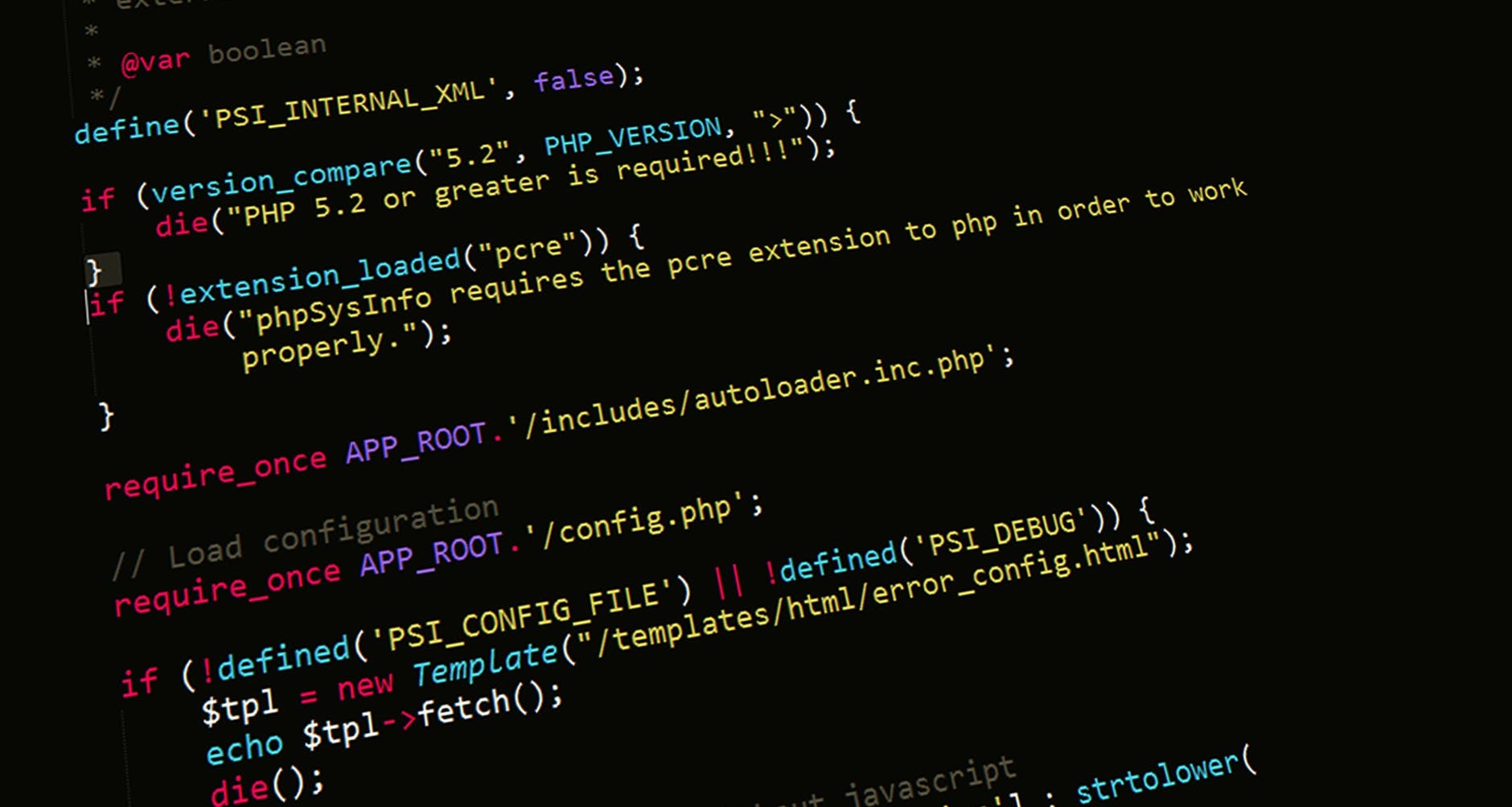
Being a computer student in 2023 is not easy. Besides studying a constantly evolving subject, you have to come up with great computer science research topics at some point in your academic life. If you’re reading this article, you’re among many other students that have also come to this realization.
Interesting Computer Science Topics
Awesome research topics in computer science, hot topics in computer science, topics to publish a journal on computer science.
- Controversial Topics in Computer Science
Fun AP Computer Science Topics
Exciting computer science ph.d. topics, remarkable computer science research topics for undergraduates, incredible final year computer science project topics, advanced computer science topics, unique seminars topics for computer science, exceptional computer science masters thesis topics, outstanding computer science presentation topics.
- Key Computer Science Essay Topics
Main Project Topics for Computer Science
- We Can Help You with Computer Science Topics
Whether you’re earnestly searching for a topic or stumbled onto this article by accident, there is no doubt that every student needs excellent computer science-related topics for their paper. A good topic will not only give your essay or research a good direction but will also make it easy to come up with supporting points. Your topic should show all your strengths as well.
Fortunately, this article is for every student that finds it hard to generate a suitable computer science topic. The following 100+ topics will help give you some inspiration when creating your topics. Let’s get into it.
One of the best ways of making your research paper interesting is by coming up with relevant topics in computer science . Here are some topics that will make your paper immersive:
- Evolution of virtual reality
- What is green cloud computing
- Ways of creating a Hopefield neural network in C++
- Developments in graphic systems in computers
- The five principal fields in robotics
- Developments and applications of nanotechnology
- Differences between computer science and applied computing
Your next research topic in computer science shouldn’t be tough to find once you’ve read this section. If you’re looking for simple final year project topics in computer science, you can find some below.
- Applications of the blockchain technology in the banking industry
- Computational thinking and how it influences science
- Ways of terminating phishing
- Uses of artificial intelligence in cyber security
- Define the concepts of a smart city
- Applications of the Internet of Things
- Discuss the applications of the face detection application
Whenever a topic is described as “hot,” it means that it is a trendy topic in computer science. If computer science project topics for your final years are what you’re looking for, have a look at some below:
- Applications of the Metaverse in the world today
- Discuss the challenges of machine learning
- Advantages of artificial intelligence
- Applications of nanotechnology in the paints industry
- What is quantum computing?
- Discuss the languages of parallel computing
- What are the applications of computer-assisted studies?
Perhaps you’d like to write a paper that will get published in a journal. If you’re searching for the best project topics for computer science students that will stand out in a journal, check below:
- Developments in human-computer interaction
- Applications of computer science in medicine
- Developments in artificial intelligence in image processing
- Discuss cryptography and its applications
- Discuss methods of ransomware prevention
- Applications of Big Data in the banking industry
- Challenges of cloud storage services in 2023
Controversial Topics in Computer Science
Some of the best computer science final year project topics are those that elicit debates or require you to take a stand. You can find such topics listed below for your inspiration:
- Can robots be too intelligent?
- Should the dark web be shut down?
- Should your data be sold to corporations?
- Will robots completely replace the human workforce one day?
- How safe is the Metaverse for children?
- Will artificial intelligence replace actors in Hollywood?
- Are social media platforms safe anymore?
Are you a computer science student looking for AP topics? You’re in luck because the following final year project topics for computer science are suitable for you.
- Standard browser core with CSS support
- Applications of the Gaussian method in C++ development in integrating functions
- Vital conditions of reducing risk through the Newton method
- How to reinforce machine learning algorithms.
- How do artificial neural networks function?
- Discuss the advancements in computer languages in machine learning
- Use of artificial intelligence in automated cars
When studying to get your doctorate in computer science, you need clear and relevant topics that generate the reader’s interest. Here are some Ph.D. topics in computer science you might consider:
- Developments in information technology
- Is machine learning detrimental to the human workforce?
- How to write an algorithm for deep learning
- What is the future of 5G in wireless networks
- Statistical data in Maths modules in Python
- Data retention automation from a website using API
- Application of modern programming languages
Looking for computer science topics for research is not easy for an undergraduate. Fortunately, these computer science project topics should make your research paper easy:
- Ways of using artificial intelligence in real estate
- Discuss reinforcement learning and its applications
- Uses of Big Data in science and medicine
- How to sort algorithms using Haskell
- How to create 3D configurations for a website
- Using inverse interpolation to solve non-linear equations
- Explain the similarities between the Internet of Things and artificial intelligence
Your dissertation paper is one of the most crucial papers you’ll ever do in your final year. That’s why selecting the best ethics in computer science topics is a crucial part of your paper. Here are some project topics for the computer science final year.
- How to incorporate numerical methods in programming
- Applications of blockchain technology in cloud storage
- How to come up with an automated attendance system
- Using dynamic libraries for site development
- How to create cubic splines
- Applications of artificial intelligence in the stock market
- Uses of quantum computing in financial modeling
Your instructor may want you to challenge yourself with an advanced science project. Thus, you may require computer science topics to learn and research. Here are some that may inspire you:
- Discuss the best cryptographic protocols
- Advancement of artificial intelligence used in smartphones
- Briefly discuss the types of security software available
- Application of liquid robots in 2023
- How to use quantum computers to solve decoherence problem
- macOS vs. Windows; discuss their similarities and differences
- Explain the steps taken in a cyber security audit
When searching for computer science topics for a seminar, make sure they are based on current research or events. Below are some of the latest research topics in computer science:
- How to reduce cyber-attacks in 2023
- Steps followed in creating a network
- Discuss the uses of data science
- Discuss ways in which social robots improve human interactions
- Differentiate between supervised and unsupervised machine learning
- Applications of robotics in space exploration
- The contrast between cyber-physical and sensor network systems
Are you looking for computer science thesis topics for your upcoming projects? The topics below are meant to help you write your best paper yet:
- Applications of computer science in sports
- Uses of computer technology in the electoral process
- Using Fibonacci to solve the functions maximum and their implementations
- Discuss the advantages of using open-source software
- Expound on the advancement of computer graphics
- Briefly discuss the uses of mesh generation in computational domains
- How much data is generated from the internet of things?
A computer science presentation requires a topic relevant to current events. Whether your paper is an assignment or a dissertation, you can find your final year computer science project topics below:
- Uses of adaptive learning in the financial industry
- Applications of transitive closure on graph
- Using RAD technology in developing software
- Discuss how to create maximum flow in the network
- How to design and implement functional mapping
- Using artificial intelligence in courier tracking and deliveries
- How to make an e-authentication system
Key Computer Science Essay Topics
You may be pressed for time and require computer science master thesis topics that are easy. Below are some topics that fit this description:
- What are the uses of cloud computing in 2023
- Discuss the server-side web technologies
- Compare and contrast android and iOS
- How to come up with a face detection algorithm
- What is the future of NFTs
- How to create an artificial intelligence shopping system
- How to make a software piracy prevention algorithm
One major mistake students make when writing their papers is selecting topics unrelated to the study at hand. This, however, will not be an issue if you get topics related to computer science, such as the ones below:
- Using blockchain to create a supply chain management system
- How to protect a web app from malicious attacks
- Uses of distributed information processing systems
- Advancement of crowd communication software since COVID-19
- Uses of artificial intelligence in online casinos
- Discuss the pillars of math computations
- Discuss the ethical concerns arising from data mining
We Can Help You with Computer Science Topics, Essays, Thesis, and Research Papers
We hope that this list of computer science topics helps you out of your sticky situation. We do offer other topics in different subjects. Additionally, we also offer professional writing services tailor-made for you.
We understand what students go through when searching the internet for computer science research paper topics, and we know that many students don’t know how to write a research paper to perfection. However, you shouldn’t have to go through all this when we’re here to help.
Don’t waste any more time; get in touch with us today and get your paper done excellently.
Leave a Reply Cancel reply
We use cookies to give you the best experience possible. By continuing we’ll assume you’re on board with our cookie policy

- A Research Guide
- Research Paper Topics
30 Interesting Computer Science Research Paper Topics

Read Also: Realible Term Paper Service That Will Exceed Your Expectations
- Biotechnology, medicine, and computer science
- Neuron networks and machine learning
- Big data analysis
- Virtual reality and its connection to human perception
- The success of computer-assisted education
- Computer assistance in support services
- Database architecture and management
- Human-computer interactions. The importance of usability
- The limits of computation and communication
- Computers and media. Where is the line between art and math modeling?
- Why there are so much programming languages?
- Digital security versus private information
- Encrypting and decrypting
- Quantum computers. Are they the future?
- Is the evolution of search algorithms finished?
- The importance of open source software
- Portable gadgets and the peculiarities of software development for them
- Cloud storages: advantages and disadvantages
- Computer viruses: the main principles of work and the hazards
- DDOS attacks, their danger on the global scale and their prevention
- Is SCRUM methodology the best-invented one for computer science?
- The online medicine apps: can they sometimes substitute the treatment of real doctors?
- 5G Wireless System: is it the future?
- Windows, macOS, UNIX – what OS is the most perspective now?
- Biometric systems and recognizing
- Ethical hacking. Who are the “white hat hackers”?
- Cyborgs: is it sci-fi or nearest future?
- The ATM and bank security
- The evolution of torrents
- What is blockchain?
By clicking "Log In", you agree to our terms of service and privacy policy . We'll occasionally send you account related and promo emails.
Sign Up for your FREE account
For enquiries call:
+1-469-442-0620

- Programming
Latest Computer Science Research Topics for 2024
Home Blog Programming Latest Computer Science Research Topics for 2024
Everybody sees a dream—aspiring to become a doctor, astronaut, or anything that fits your imagination. If you were someone who had a keen interest in looking for answers and knowing the “why” behind things, you might be a good fit for research. Further, if this interest revolved around computers and tech, you would be an excellent computer researcher!
As a tech enthusiast, you must know how technology is making our life easy and comfortable. With a single click, Google can get you answers to your silliest query or let you know the best restaurants around you. Do you know what generates that answer? Want to learn about the science going on behind these gadgets and the internet?
For this, you will have to do a bit of research. Here we will learn about top computer science thesis topics and computer science thesis ideas.
Why is Research in Computer Science Important?
Computers and technology are becoming an integral part of our lives. We are dependent on them for most of our work. With the changing lifestyle and needs of the people, continuous research in this sector is required to ease human work. However, you need to be a certified researcher to contribute to the field of computers. You can check out Advance Computer Programming certification to learn and advance in the versatile language and get hands-on experience with all the topics of C# application development.
1. Innovation in Technology
Research in computer science contributes to technological advancement and innovations. We end up discovering new things and introducing them to the world. Through research, scientists and engineers can create new hardware, software, and algorithms that improve the functionality, performance, and usability of computers and other digital devices.
2. Problem-Solving Capabilities
From disease outbreaks to climate change, solving complex problems requires the use of advanced computer models and algorithms. Computer science research enables scholars to create methods and tools that can help in resolving these challenging issues in a blink of an eye.
3. Enhancing Human Life
Computer science research has the potential to significantly enhance human life in a variety of ways. For instance, researchers can produce educational software that enhances student learning or new healthcare technology that improves clinical results. If you wish to do Ph.D., these can become interesting computer science research topics for a PhD.
4. Security Assurance
As more sensitive data is being transmitted and kept online, security is our main concern. Computer science research is crucial for creating new security systems and tactics that defend against online threats.
Top Computer Science Research Topics
Before starting with the research, knowing the trendy research paper ideas for computer science exploration is important. It is not so easy to get your hands on the best research topics for computer science; spend some time and read about the following mind-boggling ideas before selecting one.
1. Integrated Blockchain and Edge Computing Systems: A Survey, Some Research Issues, and Challenges
Welcome to the era of seamless connectivity and unparalleled efficiency! Blockchain and edge computing are two cutting-edge technologies that have the potential to revolutionize numerous sectors. Blockchain is a distributed ledger technology that is decentralized and offers a safe and transparent method of storing and transferring data.
As a young researcher, you can pave the way for a more secure, efficient, and scalable architecture that integrates blockchain and edge computing systems. So, let's roll up our sleeves and get ready to push the boundaries of technology with this exciting innovation!
Blockchain helps to reduce latency and boost speed. Edge computing, on the other hand, entails processing data close to the generation source, such as sensors and IoT devices. Integrating edge computing with blockchain technologies can help to achieve safer, more effective, and scalable architecture.
Moreover, this research title for computer science might open doors of opportunities for you in the financial sector.
2. A Survey on Edge Computing Systems and Tools
With the rise in population, the data is multiplying by manifolds each day. It's high time we find efficient technology to store it. However, more research is required for the same.
Say hello to the future of computing with edge computing! The edge computing system can store vast amounts of data to retrieve in the future. It also provides fast access to information in need. It maintains computing resources from the cloud and data centers while processing.
Edge computing systems bring processing power closer to the data source, resulting in faster and more efficient computing. But what tools are available to help us harness the power of edge computing?
As a part of this research, you will look at the newest edge computing tools and technologies to see how they can improve your computing experience. Here are some of the tools you might get familiar with upon completion of this research:
- Apache NiFi: A framework for data processing that enables users to gather, transform, and transfer data from edge devices to cloud computing infrastructure.
- Microsoft Azure IoT Edge: A platform in the cloud that enables the creation and deployment of cutting-edge intelligent applications.
- OpenFog Consortium: An organization that supports the advancement of fog computing technologies and architectures is the OpenFog Consortium.
3. Machine Learning: Algorithms, Real-world Applications, and Research Directions
Machine learning is the superset of Artificial Intelligence; a ground-breaking technology used to train machines to mimic human action and work. ML is used in everything from virtual assistants to self-driving cars and is revolutionizing the way we interact with computers. But what is machine learning exactly, and what are some of its practical uses and future research directions?
To find answers to such questions, it can be a wonderful choice to pick from the pool of various computer science dissertation ideas.
You will discover how computers learn several actions without explicit programming and see how they perform beyond their current capabilities. However, to understand better, having some basic programming knowledge always helps. KnowledgeHut’s Programming course for beginners will help you learn the most in-demand programming languages and technologies with hands-on projects.
During the research, you will work on and study
- Algorithm: Machine learning includes many algorithms, from decision trees to neural networks.
- Applications in the Real-world: You can see the usage of ML in many places. It can early detect and diagnose diseases like cancer. It can detect fraud when you are making payments. You can also use it for personalized advertising.
- Research Trend: The most recent developments in machine learning research, include explainable AI, reinforcement learning, and federated learning.
While a single research paper is not enough to bring the light on an entire domain as vast as machine learning; it can help you witness how applicable it is in numerous fields, like engineering, data science & analysis, business intelligence, and many more.
Whether you are a data scientist with years of experience or a curious tech enthusiast, machine learning is an intriguing and vital field that's influencing the direction of technology. So why not dig deeper?
4. Evolutionary Algorithms and their Applications to Engineering Problems
Imagine a system that can solve most of your complex queries. Are you interested to know how these systems work? It is because of some algorithms. But what are they, and how do they work? Evolutionary algorithms use genetic operators like mutation and crossover to build new generations of solutions rather than starting from scratch.
This research topic can be a choice of interest for someone who wants to learn more about algorithms and their vitality in engineering.
Evolutionary algorithms are transforming the way we approach engineering challenges by allowing us to explore enormous solution areas and optimize complex systems.
The possibilities are infinite as long as this technology is developed further. Get ready to explore the fascinating world of evolutionary algorithms and their applications in addressing engineering issues.
5. The Role of Big Data Analytics in the Industrial Internet of Things
Datasets can have answers to most of your questions. With good research and approach, analyzing this data can bring magical results. Welcome to the world of data-driven insights! Big Data Analytics is the transformative process of extracting valuable knowledge and patterns from vast and complex datasets, boosting innovation and informed decision-making.
This field allows you to transform the enormous amounts of data produced by IoT devices into insightful knowledge that has the potential to change how large-scale industries work. It's like having a crystal ball that can foretell.
Big data analytics is being utilized to address some of the most critical issues, from supply chain optimization to predictive maintenance. Using it, you can find patterns, spot abnormalities, and make data-driven decisions that increase effectiveness and lower costs for several industrial operations by analyzing data from sensors and other IoT devices.
The area is so vast that you'll need proper research to use and interpret all this information. Choose this as your computer research topic to discover big data analytics' most compelling applications and benefits. You will see that a significant portion of industrial IoT technology demands the study of interconnected systems, and there's nothing more suitable than extensive data analysis.
6. An Efficient Lightweight Integrated Blockchain (ELIB) Model for IoT Security and Privacy
Are you concerned about the security and privacy of your Internet of Things (IoT) devices? As more and more devices become connected, it is more important than ever to protect the security and privacy of data. If you are interested in cyber security and want to find new ways of strengthening it, this is the field for you.
ELIB is a cutting-edge solution that offers private and secure communication between IoT devices by fusing the strength of blockchain with lightweight cryptography. This architecture stores encrypted data on a distributed ledger so only parties with permission can access it.
But why is ELIB so practical and portable? ELIB uses lightweight cryptography to provide quick and effective communication between devices, unlike conventional blockchain models that need complicated and resource-intensive computations.
Due to its increasing vitality, it is gaining popularity as a research topic as someone aware that this framework works and helps reinstate data security is highly demanded in financial and banking.
7. Natural Language Processing Techniques to Reveal Human-Computer Interaction for Development Research Topics
Welcome to the world where machines decode the beauty of the human language. With natural language processing (NLP) techniques, we can analyze the interactions between humans and computers to reveal valuable insights for development research topics. It is also one of the most crucial PhD topics in computer science as NLP-based applications are gaining more and more traction.
Etymologically, natural language processing (NLP) is a potential technique that enables us to examine and comprehend natural language data, such as discussions between people and machines. Insights on user behaviour, preferences, and pain areas can be gleaned from these encounters utilizing NLP approaches.
But which specific areas should we leverage on using NLP methods? This is precisely what you’ll discover while doing this computer science research.
Gear up to learn more about the fascinating field of NLP and how it can change how we design and interact with technology, whether you are a UX designer, a data scientist, or just a curious tech lover and linguist.
8. All One Needs to Know About Fog Computing and Related Edge Computing Paradigms: A Complete Survey
If you are an IoT expert or a keen lover of the Internet of Things, you should leap and move forward to discovering Fog Computing. With the rise of connected devices and the Internet of Things (IoT), traditional cloud computing models are no longer enough. That's where fog computing and related edge computing paradigms come in.
Fog computing is a distributed approach that brings processing and data storage closer to the devices that generate and consume data by extending cloud computing to the network's edge.
As computing technologies are significantly used today, the area has become a hub for researchers to delve deeper into the underlying concepts and devise more and more fog computing frameworks. You can also contribute to and master this architecture by opting for this stand-out topic for your research.
Tips and Tricks to Write Computer Research Topics
Before starting to explore these hot research topics in computer science you may have to know about some tips and tricks that can easily help you.
- Know your interest.
- Choose the topic wisely.
- Make proper research about the demand of the topic.
- Get proper references.
- Discuss with experts.
By following these tips and tricks, you can write a compelling and impactful computer research topic that contributes to the field's advancement and addresses important research gaps.
From machine learning and artificial intelligence to blockchain, edge computing, and big data analytics, numerous trending computer research topics exist to explore.
One of the most important trends is using cutting-edge technology to address current issues. For instance, new IIoT security and privacy opportunities are emerging by integrating blockchain and edge computing. Similarly, the application of natural language processing methods is assisting in revealing human-computer interaction and guiding the creation of new technologies.
Another trend is the growing emphasis on sustainability and moral considerations in technological development. Researchers are looking into how computer science might help in innovation.
With the latest developments and leveraging cutting-edge tools and techniques, researchers can make meaningful contributions to the field and help shape the future of technology. Going for Full-stack Developer online training will help you master the latest tools and technologies.
Frequently Asked Questions (FAQs)
Research in computer science is mainly focused on different niches. It can be theoretical or technical as well. It completely depends upon the candidate and his focused area. They may do research for inventing new algorithms or many more to get advanced responses in that field.
Yes, moreover it would be a very good opportunity for the candidate. Because computer science students may have a piece of knowledge about the topic previously. They may find Easy thesis topics for computer science to fulfill their research through KnowledgeHut.
There are several scopes available for computer science. A candidate can choose different subjects such as AI, database management, software design, graphics, and many more.

Ramulu Enugurthi
Ramulu Enugurthi, a distinguished computer science expert with an M.Tech from IIT Madras, brings over 15 years of software development excellence. Their versatile career spans gaming, fintech, e-commerce, fashion commerce, mobility, and edtech, showcasing adaptability in multifaceted domains. Proficient in building distributed and microservices architectures, Ramulu is renowned for tackling modern tech challenges innovatively. Beyond technical prowess, he is a mentor, sharing invaluable insights with the next generation of developers. Ramulu's journey of growth, innovation, and unwavering commitment to excellence continues to inspire aspiring technologists.
Avail your free 1:1 mentorship session.
Something went wrong
Upcoming Programming Batches & Dates

- Advisers & Contacts
- Bachelor of Arts & Bachelor of Science in Engineering
- Prerequisites
- Declaring Computer Science for AB Students
- Declaring Computer Science for BSE Students
- Class of '25, '26 & '27 - Departmental Requirements
- Class of 2024 - Departmental Requirements
- COS126 Information
- Important Steps and Deadlines
- Independent Work Seminars
- Guidelines and Useful Information
Undergraduate Research Topics
- AB Junior Research Workshops
- Undergraduate Program FAQ
- How to Enroll
- Requirements
- Certificate Program FAQ
- Interdepartmental Committee
- Minor Program
- Funding for Student Group Activities
- Mailing Lists and Policies
- Study Abroad
- Jobs & Careers
- Admissions Requirements
- Breadth Requirements
- Pre-FPO Checklist
- FPO Checklist
- M.S.E. Track
- M.Eng. Track
- Departmental Internship Policy (for Master's students)
- General Examination
- Fellowship Opportunities
- Travel Reimbursement Policy
- Communication Skills
- Course Schedule
- Course Catalog
- Research Areas
- Interdisciplinary Programs
- Technical Reports
- Computing Facilities
- Researchers
- Technical Staff
- Administrative Staff
- Graduate Students
- Undergraduate Students
- Graduate Alumni
- Climate and Inclusion Committee
- Resources for Undergraduate & Graduate Students
- Outreach Initiatives
- Resources for Faculty & Staff
- Spotlight Stories
- Job Openings
- Undergraduate Program
- Independent Work & Theses
Suggested Undergraduate Research Topics
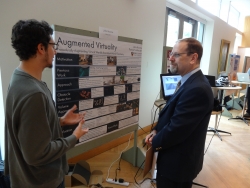
How to Contact Faculty for IW/Thesis Advising
Send the professor an e-mail. When you write a professor, be clear that you want a meeting regarding a senior thesis or one-on-one IW project, and briefly describe the topic or idea that you want to work on. Check the faculty listing for email addresses.
Parastoo Abtahi, Room 419
Available for single-semester IW and senior thesis advising, 2024-2025
- Research Areas: Human-Computer Interaction (HCI), Augmented Reality (AR), and Spatial Computing
- Input techniques for on-the-go interaction (e.g., eye-gaze, microgestures, voice) with a focus on uncertainty, disambiguation, and privacy.
- Minimal and timely multisensory output (e.g., spatial audio, haptics) that enables users to attend to their physical environment and the people around them, instead of a 2D screen.
- Interaction with intelligent systems (e.g., IoT, robots) situated in physical spaces with a focus on updating users’ mental model despite the complexity and dynamicity of these systems.
Ryan Adams, Room 411
Research areas:
- Machine learning driven design
- Generative models for structured discrete objects
- Approximate inference in probabilistic models
- Accelerating solutions to partial differential equations
- Innovative uses of automatic differentiation
- Modeling and optimizing 3d printing and CNC machining
Andrew Appel, Room 209
Available for Fall 2024 IW advising, only
- Research Areas: Formal methods, programming languages, compilers, computer security.
- Software verification (for which taking COS 326 / COS 510 is helpful preparation)
- Game theory of poker or other games (for which COS 217 / 226 are helpful)
- Computer game-playing programs (for which COS 217 / 226)
- Risk-limiting audits of elections (for which ORF 245 or other knowledge of probability is useful)
Sanjeev Arora, Room 407
- Theoretical machine learning, deep learning and its analysis, natural language processing. My advisees would typically have taken a course in algorithms (COS423 or COS 521 or equivalent) and a course in machine learning.
- Show that finding approximate solutions to NP-complete problems is also NP-complete (i.e., come up with NP-completeness reductions a la COS 487).
- Experimental Algorithms: Implementing and Evaluating Algorithms using existing software packages.
- Studying/designing provable algorithms for machine learning and implementions using packages like scipy and MATLAB, including applications in Natural language processing and deep learning.
- Any topic in theoretical computer science.
David August, Room 221
Not available for IW or thesis advising, 2024-2025
- Research Areas: Computer Architecture, Compilers, Parallelism
- Containment-based approaches to security: We have designed and tested a simple hardware+software containment mechanism that stops incorrect communication resulting from faults, bugs, or exploits from leaving the system. Let's explore ways to use containment to solve real problems. Expect to work with corporate security and technology decision-makers.
- Parallelism: Studies show much more parallelism than is currently realized in compilers and architectures. Let's find ways to realize this parallelism.
- Any other interesting topic in computer architecture or compilers.
Mark Braverman, 194 Nassau St., Room 231
- Research Areas: computational complexity, algorithms, applied probability, computability over the real numbers, game theory and mechanism design, information theory.
- Topics in computational and communication complexity.
- Applications of information theory in complexity theory.
- Algorithms for problems under real-life assumptions.
- Game theory, network effects
- Mechanism design (could be on a problem proposed by the student)
Sebastian Caldas, 221 Nassau Street, Room 105
- Research Areas: collaborative learning, machine learning for healthcare. Typically, I will work with students that have taken COS324.
- Methods for collaborative and continual learning.
- Machine learning for healthcare applications.
Bernard Chazelle, 194 Nassau St., Room 301
- Research Areas: Natural Algorithms, Computational Geometry, Sublinear Algorithms.
- Natural algorithms (flocking, swarming, social networks, etc).
- Sublinear algorithms
- Self-improving algorithms
- Markov data structures
Danqi Chen, Room 412
- My advisees would be expected to have taken a course in machine learning and ideally have taken COS484 or an NLP graduate seminar.
- Representation learning for text and knowledge bases
- Pre-training and transfer learning
- Question answering and reading comprehension
- Information extraction
- Text summarization
- Any other interesting topics related to natural language understanding/generation
Marcel Dall'Agnol, Corwin 034
- Research Areas: Theoretical computer science. (Specifically, quantum computation, sublinear algorithms, complexity theory, interactive proofs and cryptography)
- Research Areas: Machine learning
Jia Deng, Room 423
- Research Areas: Computer Vision, Machine Learning.
- Object recognition and action recognition
- Deep Learning, autoML, meta-learning
- Geometric reasoning, logical reasoning
Adji Bousso Dieng, Room 406
- Research areas: Vertaix is a research lab at Princeton University led by Professor Adji Bousso Dieng. We work at the intersection of artificial intelligence (AI) and the natural sciences. The models and algorithms we develop are motivated by problems in those domains and contribute to advancing methodological research in AI. We leverage tools in statistical machine learning and deep learning in developing methods for learning with the data, of various modalities, arising from the natural sciences.
Robert Dondero, Corwin Hall, Room 038
- Research Areas: Software engineering; software engineering education.
- Develop or evaluate tools to facilitate student learning in undergraduate computer science courses at Princeton, and beyond.
- In particular, can code critiquing tools help students learn about software quality?
Zeev Dvir, 194 Nassau St., Room 250
- Research Areas: computational complexity, pseudo-randomness, coding theory and discrete mathematics.
- Independent Research: I have various research problems related to Pseudorandomness, Coding theory, Complexity and Discrete mathematics - all of which require strong mathematical background. A project could also be based on writing a survey paper describing results from a few theory papers revolving around some particular subject.
Benjamin Eysenbach, Room 416
- Research areas: reinforcement learning, machine learning. My advisees would typically have taken COS324.
- Using RL algorithms to applications in science and engineering.
- Emergent behavior of RL algorithms on high-fidelity robotic simulators.
- Studying how architectures and representations can facilitate generalization.
Christiane Fellbaum, 1-S-14 Green
- Research Areas: theoretical and computational linguistics, word sense disambiguation, lexical resource construction, English and multilingual WordNet(s), ontology
- Anything having to do with natural language--come and see me with/for ideas suitable to your background and interests. Some topics students have worked on in the past:
- Developing parsers, part-of-speech taggers, morphological analyzers for underrepresented languages (you don't have to know the language to develop such tools!)
- Quantitative approaches to theoretical linguistics questions
- Extensions and interfaces for WordNet (English and WN in other languages),
- Applications of WordNet(s), including:
- Foreign language tutoring systems,
- Spelling correction software,
- Word-finding/suggestion software for ordinary users and people with memory problems,
- Machine Translation
- Sentiment and Opinion detection
- Automatic reasoning and inferencing
- Collaboration with professors in the social sciences and humanities ("Digital Humanities")
Adam Finkelstein, Room 424
- Research Areas: computer graphics, audio.
Robert S. Fish, Corwin Hall, Room 037
- Networking and telecommunications
- Learning, perception, and intelligence, artificial and otherwise;
- Human-computer interaction and computer-supported cooperative work
- Online education, especially in Computer Science Education
- Topics in research and development innovation methodologies including standards, open-source, and entrepreneurship
- Distributed autonomous organizations and related blockchain technologies
Michael Freedman, Room 308
- Research Areas: Distributed systems, security, networking
- Projects related to streaming data analysis, datacenter systems and networks, untrusted cloud storage and applications. Please see my group website at http://sns.cs.princeton.edu/ for current research projects.
Ruth Fong, Room 032
- Research Areas: computer vision, machine learning, deep learning, interpretability, explainable AI, fairness and bias in AI
- Develop a technique for understanding AI models
- Design a AI model that is interpretable by design
- Build a paradigm for detecting and/or correcting failure points in an AI model
- Analyze an existing AI model and/or dataset to better understand its failure points
- Build a computer vision system for another domain (e.g., medical imaging, satellite data, etc.)
- Develop a software package for explainable AI
- Adapt explainable AI research to a consumer-facing problem
Note: I am happy to advise any project if there's a sufficient overlap in interest and/or expertise; please reach out via email to chat about project ideas.
Tom Griffiths, Room 405
Available for Fall 2024 single-semester IW advising, only
Research areas: computational cognitive science, computational social science, machine learning and artificial intelligence
Note: I am open to projects that apply ideas from computer science to understanding aspects of human cognition in a wide range of areas, from decision-making to cultural evolution and everything in between. For example, we have current projects analyzing chess game data and magic tricks, both of which give us clues about how human minds work. Students who have expertise or access to data related to games, magic, strategic sports like fencing, or other quantifiable domains of human behavior feel free to get in touch.
Aarti Gupta, Room 220
- Research Areas: Formal methods, program analysis, logic decision procedures
- Finding bugs in open source software using automatic verification tools
- Software verification (program analysis, model checking, test generation)
- Decision procedures for logical reasoning (SAT solvers, SMT solvers)
Elad Hazan, Room 409
- Research interests: machine learning methods and algorithms, efficient methods for mathematical optimization, regret minimization in games, reinforcement learning, control theory and practice
- Machine learning, efficient methods for mathematical optimization, statistical and computational learning theory, regret minimization in games.
- Implementation and algorithm engineering for control, reinforcement learning and robotics
- Implementation and algorithm engineering for time series prediction
Felix Heide, Room 410
- Research Areas: Computational Imaging, Computer Vision, Machine Learning (focus on Optimization and Approximate Inference).
- Optical Neural Networks
- Hardware-in-the-loop Holography
- Zero-shot and Simulation-only Learning
- Object recognition in extreme conditions
- 3D Scene Representations for View Generation and Inverse Problems
- Long-range Imaging in Scattering Media
- Hardware-in-the-loop Illumination and Sensor Optimization
- Inverse Lidar Design
- Phase Retrieval Algorithms
- Proximal Algorithms for Learning and Inference
- Domain-Specific Language for Optics Design
Peter Henderson , 302 Sherrerd Hall
- Research Areas: Machine learning, law, and policy
Kyle Jamieson, Room 306
- Research areas: Wireless and mobile networking; indoor radar and indoor localization; Internet of Things
- See other topics on my independent work ideas page (campus IP and CS dept. login req'd)
Alan Kaplan, 221 Nassau Street, Room 105
Research Areas:
- Random apps of kindness - mobile application/technology frameworks used to help individuals or communities; topic areas include, but are not limited to: first response, accessibility, environment, sustainability, social activism, civic computing, tele-health, remote learning, crowdsourcing, etc.
- Tools automating programming language interoperability - Java/C++, React Native/Java, etc.
- Software visualization tools for education
- Connected consumer devices, applications and protocols
Brian Kernighan, Room 311
- Research Areas: application-specific languages, document preparation, user interfaces, software tools, programming methodology
- Application-oriented languages, scripting languages.
- Tools; user interfaces
- Digital humanities
Zachary Kincaid, Room 219
- Research areas: programming languages, program analysis, program verification, automated reasoning
- Independent Research Topics:
- Develop a practical algorithm for an intractable problem (e.g., by developing practical search heuristics, or by reducing to, or by identifying a tractable sub-problem, ...).
- Design a domain-specific programming language, or prototype a new feature for an existing language.
- Any interesting project related to programming languages or logic.
Gillat Kol, Room 316
- Research area: theory
Aleksandra Korolova, 309 Sherrerd Hall
- Research areas: Societal impacts of algorithms and AI; privacy; fair and privacy-preserving machine learning; algorithm auditing.
Advisees typically have taken one or more of COS 226, COS 324, COS 423, COS 424 or COS 445.
Pravesh Kothari, Room 320
- Research areas: Theory
Amit Levy, Room 307
- Research Areas: Operating Systems, Distributed Systems, Embedded Systems, Internet of Things
- Distributed hardware testing infrastructure
- Second factor security tokens
- Low-power wireless network protocol implementation
- USB device driver implementation
Kai Li, Room 321
- Research Areas: Distributed systems; storage systems; content-based search and data analysis of large datasets.
- Fast communication mechanisms for heterogeneous clusters.
- Approximate nearest-neighbor search for high dimensional data.
- Data analysis and prediction of in-patient medical data.
- Optimized implementation of classification algorithms on manycore processors.
Xiaoyan Li, 221 Nassau Street, Room 104
- Research areas: Information retrieval, novelty detection, question answering, AI, machine learning and data analysis.
- Explore new statistical retrieval models for document retrieval and question answering.
- Apply AI in various fields.
- Apply supervised or unsupervised learning in health, education, finance, and social networks, etc.
- Any interesting project related to AI, machine learning, and data analysis.
Lydia Liu, Room 414
- Research Areas: algorithmic decision making, machine learning and society
- Theoretical foundations for algorithmic decision making (e.g. mathematical modeling of data-driven decision processes, societal level dynamics)
- Societal impacts of algorithms and AI through a socio-technical lens (e.g. normative implications of worst case ML metrics, prediction and model arbitrariness)
- Machine learning for social impact domains, especially education (e.g. responsible development and use of LLMs for education equity and access)
- Evaluation of human-AI decision making using statistical methods (e.g. causal inference of long term impact)
Wyatt Lloyd, Room 323
- Research areas: Distributed Systems
- Caching algorithms and implementations
- Storage systems
- Distributed transaction algorithms and implementations
Alex Lombardi , Room 312
- Research Areas: Theory
Margaret Martonosi, Room 208
- Quantum Computing research, particularly related to architecture and compiler issues for QC.
- Computer architectures specialized for modern workloads (e.g., graph analytics, machine learning algorithms, mobile applications
- Investigating security and privacy vulnerabilities in computer systems, particularly IoT devices.
- Other topics in computer architecture or mobile / IoT systems also possible.
Jonathan Mayer, Sherrerd Hall, Room 307
Available for Spring 2025 single-semester IW, only
- Research areas: Technology law and policy, with emphasis on national security, criminal procedure, consumer privacy, network management, and online speech.
- Assessing the effects of government policies, both in the public and private sectors.
- Collecting new data that relates to government decision making, including surveying current business practices and studying user behavior.
- Developing new tools to improve government processes and offer policy alternatives.
Mae Milano, Room 307
- Local-first / peer-to-peer systems
- Wide-ares storage systems
- Consistency and protocol design
- Type-safe concurrency
- Language design
- Gradual typing
- Domain-specific languages
- Languages for distributed systems
Andrés Monroy-Hernández, Room 405
- Research Areas: Human-Computer Interaction, Social Computing, Public-Interest Technology, Augmented Reality, Urban Computing
- Research interests:developing public-interest socio-technical systems. We are currently creating alternatives to gig work platforms that are more equitable for all stakeholders. For instance, we are investigating the socio-technical affordances necessary to support a co-op food delivery network owned and managed by workers and restaurants. We are exploring novel system designs that support self-governance, decentralized/federated models, community-centered data ownership, and portable reputation systems. We have opportunities for students interested in human-centered computing, UI/UX design, full-stack software development, and qualitative/quantitative user research.
- Beyond our core projects, we are open to working on research projects that explore the use of emerging technologies, such as AR, wearables, NFTs, and DAOs, for creative and out-of-the-box applications.
Christopher Moretti, Corwin Hall, Room 036
- Research areas: Distributed systems, high-throughput computing, computer science/engineering education
- Expansion, improvement, and evaluation of open-source distributed computing software.
- Applications of distributed computing for "big science" (e.g. biometrics, data mining, bioinformatics)
- Software and best practices for computer science education and study, especially Princeton's 126/217/226 sequence or MOOCs development
- Sports analytics and/or crowd-sourced computing
Radhika Nagpal, F316 Engineering Quadrangle
- Research areas: control, robotics and dynamical systems
Karthik Narasimhan, Room 422
- Research areas: Natural Language Processing, Reinforcement Learning
- Autonomous agents for text-based games ( https://www.microsoft.com/en-us/research/project/textworld/ )
- Transfer learning/generalization in NLP
- Techniques for generating natural language
- Model-based reinforcement learning
Arvind Narayanan, 308 Sherrerd Hall
Research Areas: fair machine learning (and AI ethics more broadly), the social impact of algorithmic systems, tech policy
Pedro Paredes, Corwin Hall, Room 041
My primary research work is in Theoretical Computer Science.
* Research Interest: Spectral Graph theory, Pseudorandomness, Complexity theory, Coding Theory, Quantum Information Theory, Combinatorics.
The IW projects I am interested in advising can be divided into three categories:
1. Theoretical research
I am open to advise work on research projects in any topic in one of my research areas of interest. A project could also be based on writing a survey given results from a few papers. Students should have a solid background in math (e.g., elementary combinatorics, graph theory, discrete probability, basic algebra/calculus) and theoretical computer science (226 and 240 material, like big-O/Omega/Theta, basic complexity theory, basic fundamental algorithms). Mathematical maturity is a must.
A (non exhaustive) list of topics of projects I'm interested in: * Explicit constructions of better vertex expanders and/or unique neighbor expanders. * Construction deterministic or random high dimensional expanders. * Pseudorandom generators for different problems. * Topics around the quantum PCP conjecture. * Topics around quantum error correcting codes and locally testable codes, including constructions, encoding and decoding algorithms.
2. Theory informed practical implementations of algorithms Very often the great advances in theoretical research are either not tested in practice or not even feasible to be implemented in practice. Thus, I am interested in any project that consists in trying to make theoretical ideas applicable in practice. This includes coming up with new algorithms that trade some theoretical guarantees for feasible implementation yet trying to retain the soul of the original idea; implementing new algorithms in a suitable programming language; and empirically testing practical implementations and comparing them with benchmarks / theoretical expectations. A project in this area doesn't have to be in my main areas of research, any theoretical result could be suitable for such a project.
Some examples of areas of interest: * Streaming algorithms. * Numeric linear algebra. * Property testing. * Parallel / Distributed algorithms. * Online algorithms. 3. Machine learning with a theoretical foundation
I am interested in projects in machine learning that have some mathematical/theoretical, even if most of the project is applied. This includes topics like mathematical optimization, statistical learning, fairness and privacy.
One particular area I have been recently interested in is in the area of rating systems (e.g., Chess elo) and applications of this to experts problems.
Final Note: I am also willing to advise any project with any mathematical/theoretical component, even if it's not the main one; please reach out via email to chat about project ideas.
Iasonas Petras, Corwin Hall, Room 033
- Research Areas: Information Based Complexity, Numerical Analysis, Quantum Computation.
- Prerequisites: Reasonable mathematical maturity. In case of a project related to Quantum Computation a certain familiarity with quantum mechanics is required (related courses: ELE 396/PHY 208).
- Possible research topics include:
1. Quantum algorithms and circuits:
- i. Design or simulation quantum circuits implementing quantum algorithms.
- ii. Design of quantum algorithms solving/approximating continuous problems (such as Eigenvalue problems for Partial Differential Equations).
2. Information Based Complexity:
- i. Necessary and sufficient conditions for tractability of Linear and Linear Tensor Product Problems in various settings (for example worst case or average case).
- ii. Necessary and sufficient conditions for tractability of Linear and Linear Tensor Product Problems under new tractability and error criteria.
- iii. Necessary and sufficient conditions for tractability of Weighted problems.
- iv. Necessary and sufficient conditions for tractability of Weighted Problems under new tractability and error criteria.
3. Topics in Scientific Computation:
- i. Randomness, Pseudorandomness, MC and QMC methods and their applications (Finance, etc)
Yuri Pritykin, 245 Carl Icahn Lab
- Research interests: Computational biology; Cancer immunology; Regulation of gene expression; Functional genomics; Single-cell technologies.
- Potential research projects: Development, implementation, assessment and/or application of algorithms for analysis, integration, interpretation and visualization of multi-dimensional data in molecular biology, particularly single-cell and spatial genomics data.
Benjamin Raphael, Room 309
- Research interests: Computational biology and bioinformatics; Cancer genomics; Algorithms and machine learning approaches for analysis of large-scale datasets
- Implementation and application of algorithms to infer evolutionary processes in cancer
- Identifying correlations between combinations of genomic mutations in human and cancer genomes
- Design and implementation of algorithms for genome sequencing from new DNA sequencing technologies
- Graph clustering and network anomaly detection, particularly using diffusion processes and methods from spectral graph theory
Vikram Ramaswamy, 035 Corwin Hall
- Research areas: Interpretability of AI systems, Fairness in AI systems, Computer vision.
- Constructing a new method to explain a model / create an interpretable by design model
- Analyzing a current model / dataset to understand bias within the model/dataset
- Proposing new fairness evaluations
- Proposing new methods to train to improve fairness
- Developing synthetic datasets for fairness / interpretability benchmarks
- Understanding robustness of models
Ran Raz, Room 240
- Research Area: Computational Complexity
- Independent Research Topics: Computational Complexity, Information Theory, Quantum Computation, Theoretical Computer Science
Szymon Rusinkiewicz, Room 406
- Research Areas: computer graphics; computer vision; 3D scanning; 3D printing; robotics; documentation and visualization of cultural heritage artifacts
- Research ways of incorporating rotation invariance into computer visiontasks such as feature matching and classification
- Investigate approaches to robust 3D scan matching
- Model and compensate for imperfections in 3D printing
- Given a collection of small mobile robots, apply control policies learned in simulation to the real robots.
Olga Russakovsky, Room 408
- Research Areas: computer vision, machine learning, deep learning, crowdsourcing, fairness&bias in AI
- Design a semantic segmentation deep learning model that can operate in a zero-shot setting (i.e., recognize and segment objects not seen during training)
- Develop a deep learning classifier that is impervious to protected attributes (such as gender or race) that may be erroneously correlated with target classes
- Build a computer vision system for the novel task of inferring what object (or part of an object) a human is referring to when pointing to a single pixel in the image. This includes both collecting an appropriate dataset using crowdsourcing on Amazon Mechanical Turk, creating a new deep learning formulation for this task, and running extensive analysis of both the data and the model
Sebastian Seung, Princeton Neuroscience Institute, Room 153
- Research Areas: computational neuroscience, connectomics, "deep learning" neural networks, social computing, crowdsourcing, citizen science
- Gamification of neuroscience (EyeWire 2.0)
- Semantic segmentation and object detection in brain images from microscopy
- Computational analysis of brain structure and function
- Neural network theories of brain function
Jaswinder Pal Singh, Room 324
- Research Areas: Boundary of technology and business/applications; building and scaling technology companies with special focus at that boundary; parallel computing systems and applications: parallel and distributed applications and their implications for software and architectural design; system software and programming environments for multiprocessors.
- Develop a startup company idea, and build a plan/prototype for it.
- Explore tradeoffs at the boundary of technology/product and business/applications in a chosen area.
- Study and develop methods to infer insights from data in different application areas, from science to search to finance to others.
- Design and implement a parallel application. Possible areas include graphics, compression, biology, among many others. Analyze performance bottlenecks using existing tools, and compare programming models/languages.
- Design and implement a scalable distributed algorithm.
Mona Singh, Room 420
- Research Areas: computational molecular biology, as well as its interface with machine learning and algorithms.
- Whole and cross-genome methods for predicting protein function and protein-protein interactions.
- Analysis and prediction of biological networks.
- Computational methods for inferring specific aspects of protein structure from protein sequence data.
- Any other interesting project in computational molecular biology.
Robert Tarjan, 194 Nassau St., Room 308
- Research Areas: Data structures; graph algorithms; combinatorial optimization; computational complexity; computational geometry; parallel algorithms.
- Implement one or more data structures or combinatorial algorithms to provide insight into their empirical behavior.
- Design and/or analyze various data structures and combinatorial algorithms.
Olga Troyanskaya, Room 320
- Research Areas: Bioinformatics; analysis of large-scale biological data sets (genomics, gene expression, proteomics, biological networks); algorithms for integration of data from multiple data sources; visualization of biological data; machine learning methods in bioinformatics.
- Implement and evaluate one or more gene expression analysis algorithm.
- Develop algorithms for assessment of performance of genomic analysis methods.
- Develop, implement, and evaluate visualization tools for heterogeneous biological data.
David Walker, Room 211
- Research Areas: Programming languages, type systems, compilers, domain-specific languages, software-defined networking and security
- Independent Research Topics: Any other interesting project that involves humanitarian hacking, functional programming, domain-specific programming languages, type systems, compilers, software-defined networking, fault tolerance, language-based security, theorem proving, logic or logical frameworks.
Shengyi Wang, Postdoctoral Research Associate, Room 216
Available for Fall 2024 single-semester IW, only
- Independent Research topics: Explore Escher-style tilings using (introductory) group theory and automata theory to produce beautiful pictures.
Kevin Wayne, Corwin Hall, Room 040
- Research Areas: design, analysis, and implementation of algorithms; data structures; combinatorial optimization; graphs and networks.
- Design and implement computer visualizations of algorithms or data structures.
- Develop pedagogical tools or programming assignments for the computer science curriculum at Princeton and beyond.
- Develop assessment infrastructure and assessments for MOOCs.
Matt Weinberg, 194 Nassau St., Room 222
- Research Areas: algorithms, algorithmic game theory, mechanism design, game theoretical problems in {Bitcoin, networking, healthcare}.
- Theoretical questions related to COS 445 topics such as matching theory, voting theory, auction design, etc.
- Theoretical questions related to incentives in applications like Bitcoin, the Internet, health care, etc. In a little bit more detail: protocols for these systems are often designed assuming that users will follow them. But often, users will actually be strictly happier to deviate from the intended protocol. How should we reason about user behavior in these protocols? How should we design protocols in these settings?
Huacheng Yu, Room 310
- data structures
- streaming algorithms
- design and analyze data structures / streaming algorithms
- prove impossibility results (lower bounds)
- implement and evaluate data structures / streaming algorithms
Ellen Zhong, Room 314
Opportunities outside the department.
We encourage students to look in to doing interdisciplinary computer science research and to work with professors in departments other than computer science. However, every CS independent work project must have a strong computer science element (even if it has other scientific or artistic elements as well.) To do a project with an adviser outside of computer science you must have permission of the department. This can be accomplished by having a second co-adviser within the computer science department or by contacting the independent work supervisor about the project and having he or she sign the independent work proposal form.
Here is a list of professors outside the computer science department who are eager to work with computer science undergraduates.
Maria Apostolaki, Engineering Quadrangle, C330
- Research areas: Computing & Networking, Data & Information Science, Security & Privacy
Branko Glisic, Engineering Quadrangle, Room E330
- Documentation of historic structures
- Cyber physical systems for structural health monitoring
- Developing virtual and augmented reality applications for documenting structures
- Applying machine learning techniques to generate 3D models from 2D plans of buildings
- Contact : Rebecca Napolitano, rkn2 (@princeton.edu)
Mihir Kshirsagar, Sherrerd Hall, Room 315
Center for Information Technology Policy.
- Consumer protection
- Content regulation
- Competition law
- Economic development
- Surveillance and discrimination
Sharad Malik, Engineering Quadrangle, Room B224
Select a Senior Thesis Adviser for the 2020-21 Academic Year.
- Design of reliable hardware systems
- Verifying complex software and hardware systems
Prateek Mittal, Engineering Quadrangle, Room B236
- Internet security and privacy
- Social Networks
- Privacy technologies, anonymous communication
- Network Science
- Internet security and privacy: The insecurity of Internet protocols and services threatens the safety of our critical network infrastructure and billions of end users. How can we defend end users as well as our critical network infrastructure from attacks?
- Trustworthy social systems: Online social networks (OSNs) such as Facebook, Google+, and Twitter have revolutionized the way our society communicates. How can we leverage social connections between users to design the next generation of communication systems?
- Privacy Technologies: Privacy on the Internet is eroding rapidly, with businesses and governments mining sensitive user information. How can we protect the privacy of our online communications? The Tor project (https://www.torproject.org/) is a potential application of interest.
Ken Norman, Psychology Dept, PNI 137
- Research Areas: Memory, the brain and computation
- Lab: Princeton Computational Memory Lab
Potential research topics
- Methods for decoding cognitive state information from neuroimaging data (fMRI and EEG)
- Neural network simulations of learning and memory
Caroline Savage
Office of Sustainability, Phone:(609)258-7513, Email: cs35 (@princeton.edu)
The Campus as Lab program supports students using the Princeton campus as a living laboratory to solve sustainability challenges. The Office of Sustainability has created a list of campus as lab research questions, filterable by discipline and topic, on its website .
An example from Computer Science could include using TigerEnergy , a platform which provides real-time data on campus energy generation and consumption, to study one of the many energy systems or buildings on campus. Three CS students used TigerEnergy to create a live energy heatmap of campus .
Other potential projects include:
- Apply game theory to sustainability challenges
- Develop a tool to help visualize interactions between complex campus systems, e.g. energy and water use, transportation and storm water runoff, purchasing and waste, etc.
- How can we learn (in aggregate) about individuals’ waste, energy, transportation, and other behaviors without impinging on privacy?
Janet Vertesi, Sociology Dept, Wallace Hall, Room 122
- Research areas: Sociology of technology; Human-computer interaction; Ubiquitous computing.
- Possible projects: At the intersection of computer science and social science, my students have built mixed reality games, produced artistic and interactive installations, and studied mixed human-robot teams, among other projects.
David Wentzlaff, Engineering Quadrangle, Room 228
Computing, Operating Systems, Sustainable Computing.
- Instrument Princeton's Green (HPCRC) data center
- Investigate power utilization on an processor core implemented in an FPGA
- Dismantle and document all of the components in modern electronics. Invent new ways to build computers that can be recycled easier.
- Other topics in parallel computer architecture or operating systems
- Privacy Policy

Home » 500+ Computer Science Research Topics
500+ Computer Science Research Topics

Computer Science is a constantly evolving field that has transformed the world we live in today. With new technologies emerging every day, there are countless research opportunities in this field. Whether you are interested in artificial intelligence, machine learning, cybersecurity, data analytics, or computer networks, there are endless possibilities to explore. In this post, we will delve into some of the most interesting and important research topics in Computer Science. From the latest advancements in programming languages to the development of cutting-edge algorithms, we will explore the latest trends and innovations that are shaping the future of Computer Science. So, whether you are a student or a professional, read on to discover some of the most exciting research topics in this dynamic and rapidly expanding field.
Computer Science Research Topics
Computer Science Research Topics are as follows:
- Using machine learning to detect and prevent cyber attacks
- Developing algorithms for optimized resource allocation in cloud computing
- Investigating the use of blockchain technology for secure and decentralized data storage
- Developing intelligent chatbots for customer service
- Investigating the effectiveness of deep learning for natural language processing
- Developing algorithms for detecting and removing fake news from social media
- Investigating the impact of social media on mental health
- Developing algorithms for efficient image and video compression
- Investigating the use of big data analytics for predictive maintenance in manufacturing
- Developing algorithms for identifying and mitigating bias in machine learning models
- Investigating the ethical implications of autonomous vehicles
- Developing algorithms for detecting and preventing cyberbullying
- Investigating the use of machine learning for personalized medicine
- Developing algorithms for efficient and accurate speech recognition
- Investigating the impact of social media on political polarization
- Developing algorithms for sentiment analysis in social media data
- Investigating the use of virtual reality in education
- Developing algorithms for efficient data encryption and decryption
- Investigating the impact of technology on workplace productivity
- Developing algorithms for detecting and mitigating deepfakes
- Investigating the use of artificial intelligence in financial trading
- Developing algorithms for efficient database management
- Investigating the effectiveness of online learning platforms
- Developing algorithms for efficient and accurate facial recognition
- Investigating the use of machine learning for predicting weather patterns
- Developing algorithms for efficient and secure data transfer
- Investigating the impact of technology on social skills and communication
- Developing algorithms for efficient and accurate object recognition
- Investigating the use of machine learning for fraud detection in finance
- Developing algorithms for efficient and secure authentication systems
- Investigating the impact of technology on privacy and surveillance
- Developing algorithms for efficient and accurate handwriting recognition
- Investigating the use of machine learning for predicting stock prices
- Developing algorithms for efficient and secure biometric identification
- Investigating the impact of technology on mental health and well-being
- Developing algorithms for efficient and accurate language translation
- Investigating the use of machine learning for personalized advertising
- Developing algorithms for efficient and secure payment systems
- Investigating the impact of technology on the job market and automation
- Developing algorithms for efficient and accurate object tracking
- Investigating the use of machine learning for predicting disease outbreaks
- Developing algorithms for efficient and secure access control
- Investigating the impact of technology on human behavior and decision making
- Developing algorithms for efficient and accurate sound recognition
- Investigating the use of machine learning for predicting customer behavior
- Developing algorithms for efficient and secure data backup and recovery
- Investigating the impact of technology on education and learning outcomes
- Developing algorithms for efficient and accurate emotion recognition
- Investigating the use of machine learning for improving healthcare outcomes
- Developing algorithms for efficient and secure supply chain management
- Investigating the impact of technology on cultural and societal norms
- Developing algorithms for efficient and accurate gesture recognition
- Investigating the use of machine learning for predicting consumer demand
- Developing algorithms for efficient and secure cloud storage
- Investigating the impact of technology on environmental sustainability
- Developing algorithms for efficient and accurate voice recognition
- Investigating the use of machine learning for improving transportation systems
- Developing algorithms for efficient and secure mobile device management
- Investigating the impact of technology on social inequality and access to resources
- Machine learning for healthcare diagnosis and treatment
- Machine Learning for Cybersecurity
- Machine learning for personalized medicine
- Cybersecurity threats and defense strategies
- Big data analytics for business intelligence
- Blockchain technology and its applications
- Human-computer interaction in virtual reality environments
- Artificial intelligence for autonomous vehicles
- Natural language processing for chatbots
- Cloud computing and its impact on the IT industry
- Internet of Things (IoT) and smart homes
- Robotics and automation in manufacturing
- Augmented reality and its potential in education
- Data mining techniques for customer relationship management
- Computer vision for object recognition and tracking
- Quantum computing and its applications in cryptography
- Social media analytics and sentiment analysis
- Recommender systems for personalized content delivery
- Mobile computing and its impact on society
- Bioinformatics and genomic data analysis
- Deep learning for image and speech recognition
- Digital signal processing and audio processing algorithms
- Cloud storage and data security in the cloud
- Wearable technology and its impact on healthcare
- Computational linguistics for natural language understanding
- Cognitive computing for decision support systems
- Cyber-physical systems and their applications
- Edge computing and its impact on IoT
- Machine learning for fraud detection
- Cryptography and its role in secure communication
- Cybersecurity risks in the era of the Internet of Things
- Natural language generation for automated report writing
- 3D printing and its impact on manufacturing
- Virtual assistants and their applications in daily life
- Cloud-based gaming and its impact on the gaming industry
- Computer networks and their security issues
- Cyber forensics and its role in criminal investigations
- Machine learning for predictive maintenance in industrial settings
- Augmented reality for cultural heritage preservation
- Human-robot interaction and its applications
- Data visualization and its impact on decision-making
- Cybersecurity in financial systems and blockchain
- Computer graphics and animation techniques
- Biometrics and its role in secure authentication
- Cloud-based e-learning platforms and their impact on education
- Natural language processing for machine translation
- Machine learning for predictive maintenance in healthcare
- Cybersecurity and privacy issues in social media
- Computer vision for medical image analysis
- Natural language generation for content creation
- Cybersecurity challenges in cloud computing
- Human-robot collaboration in manufacturing
- Data mining for predicting customer churn
- Artificial intelligence for autonomous drones
- Cybersecurity risks in the healthcare industry
- Machine learning for speech synthesis
- Edge computing for low-latency applications
- Virtual reality for mental health therapy
- Quantum computing and its applications in finance
- Biomedical engineering and its applications
- Cybersecurity in autonomous systems
- Machine learning for predictive maintenance in transportation
- Computer vision for object detection in autonomous driving
- Augmented reality for industrial training and simulations
- Cloud-based cybersecurity solutions for small businesses
- Natural language processing for knowledge management
- Machine learning for personalized advertising
- Cybersecurity in the supply chain management
- Cybersecurity risks in the energy sector
- Computer vision for facial recognition
- Natural language processing for social media analysis
- Machine learning for sentiment analysis in customer reviews
- Explainable Artificial Intelligence
- Quantum Computing
- Blockchain Technology
- Human-Computer Interaction
- Natural Language Processing
- Cloud Computing
- Robotics and Automation
- Augmented Reality and Virtual Reality
- Cyber-Physical Systems
- Computational Neuroscience
- Big Data Analytics
- Computer Vision
- Cryptography and Network Security
- Internet of Things
- Computer Graphics and Visualization
- Artificial Intelligence for Game Design
- Computational Biology
- Social Network Analysis
- Bioinformatics
- Distributed Systems and Middleware
- Information Retrieval and Data Mining
- Computer Networks
- Mobile Computing and Wireless Networks
- Software Engineering
- Database Systems
- Parallel and Distributed Computing
- Human-Robot Interaction
- Intelligent Transportation Systems
- High-Performance Computing
- Cyber-Physical Security
- Deep Learning
- Sensor Networks
- Multi-Agent Systems
- Human-Centered Computing
- Wearable Computing
- Knowledge Representation and Reasoning
- Adaptive Systems
- Brain-Computer Interface
- Health Informatics
- Cognitive Computing
- Cybersecurity and Privacy
- Internet Security
- Cybercrime and Digital Forensics
- Cloud Security
- Cryptocurrencies and Digital Payments
- Machine Learning for Natural Language Generation
- Cognitive Robotics
- Neural Networks
- Semantic Web
- Image Processing
- Cyber Threat Intelligence
- Secure Mobile Computing
- Cybersecurity Education and Training
- Privacy Preserving Techniques
- Cyber-Physical Systems Security
- Virtualization and Containerization
- Machine Learning for Computer Vision
- Network Function Virtualization
- Cybersecurity Risk Management
- Information Security Governance
- Intrusion Detection and Prevention
- Biometric Authentication
- Machine Learning for Predictive Maintenance
- Security in Cloud-based Environments
- Cybersecurity for Industrial Control Systems
- Smart Grid Security
- Software Defined Networking
- Quantum Cryptography
- Security in the Internet of Things
- Natural language processing for sentiment analysis
- Blockchain technology for secure data sharing
- Developing efficient algorithms for big data analysis
- Cybersecurity for internet of things (IoT) devices
- Human-robot interaction for industrial automation
- Image recognition for autonomous vehicles
- Social media analytics for marketing strategy
- Quantum computing for solving complex problems
- Biometric authentication for secure access control
- Augmented reality for education and training
- Intelligent transportation systems for traffic management
- Predictive modeling for financial markets
- Cloud computing for scalable data storage and processing
- Virtual reality for therapy and mental health treatment
- Data visualization for business intelligence
- Recommender systems for personalized product recommendations
- Speech recognition for voice-controlled devices
- Mobile computing for real-time location-based services
- Neural networks for predicting user behavior
- Genetic algorithms for optimization problems
- Distributed computing for parallel processing
- Internet of things (IoT) for smart cities
- Wireless sensor networks for environmental monitoring
- Cloud-based gaming for high-performance gaming
- Social network analysis for identifying influencers
- Autonomous systems for agriculture
- Robotics for disaster response
- Data mining for customer segmentation
- Computer graphics for visual effects in movies and video games
- Virtual assistants for personalized customer service
- Natural language understanding for chatbots
- 3D printing for manufacturing prototypes
- Artificial intelligence for stock trading
- Machine learning for weather forecasting
- Biomedical engineering for prosthetics and implants
- Cybersecurity for financial institutions
- Machine learning for energy consumption optimization
- Computer vision for object tracking
- Natural language processing for document summarization
- Wearable technology for health and fitness monitoring
- Internet of things (IoT) for home automation
- Reinforcement learning for robotics control
- Big data analytics for customer insights
- Machine learning for supply chain optimization
- Natural language processing for legal document analysis
- Artificial intelligence for drug discovery
- Computer vision for object recognition in robotics
- Data mining for customer churn prediction
- Autonomous systems for space exploration
- Robotics for agriculture automation
- Machine learning for predicting earthquakes
- Natural language processing for sentiment analysis in customer reviews
- Big data analytics for predicting natural disasters
- Internet of things (IoT) for remote patient monitoring
- Blockchain technology for digital identity management
- Machine learning for predicting wildfire spread
- Computer vision for gesture recognition
- Natural language processing for automated translation
- Big data analytics for fraud detection in banking
- Internet of things (IoT) for smart homes
- Robotics for warehouse automation
- Machine learning for predicting air pollution
- Natural language processing for medical record analysis
- Augmented reality for architectural design
- Big data analytics for predicting traffic congestion
- Machine learning for predicting customer lifetime value
- Developing algorithms for efficient and accurate text recognition
- Natural Language Processing for Virtual Assistants
- Natural Language Processing for Sentiment Analysis in Social Media
- Explainable Artificial Intelligence (XAI) for Trust and Transparency
- Deep Learning for Image and Video Retrieval
- Edge Computing for Internet of Things (IoT) Applications
- Data Science for Social Media Analytics
- Cybersecurity for Critical Infrastructure Protection
- Natural Language Processing for Text Classification
- Quantum Computing for Optimization Problems
- Machine Learning for Personalized Health Monitoring
- Computer Vision for Autonomous Driving
- Blockchain Technology for Supply Chain Management
- Augmented Reality for Education and Training
- Natural Language Processing for Sentiment Analysis
- Machine Learning for Personalized Marketing
- Big Data Analytics for Financial Fraud Detection
- Cybersecurity for Cloud Security Assessment
- Artificial Intelligence for Natural Language Understanding
- Blockchain Technology for Decentralized Applications
- Virtual Reality for Cultural Heritage Preservation
- Natural Language Processing for Named Entity Recognition
- Machine Learning for Customer Churn Prediction
- Big Data Analytics for Social Network Analysis
- Cybersecurity for Intrusion Detection and Prevention
- Artificial Intelligence for Robotics and Automation
- Blockchain Technology for Digital Identity Management
- Virtual Reality for Rehabilitation and Therapy
- Natural Language Processing for Text Summarization
- Machine Learning for Credit Risk Assessment
- Big Data Analytics for Fraud Detection in Healthcare
- Cybersecurity for Internet Privacy Protection
- Artificial Intelligence for Game Design and Development
- Blockchain Technology for Decentralized Social Networks
- Virtual Reality for Marketing and Advertising
- Natural Language Processing for Opinion Mining
- Machine Learning for Anomaly Detection
- Big Data Analytics for Predictive Maintenance in Transportation
- Cybersecurity for Network Security Management
- Artificial Intelligence for Personalized News and Content Delivery
- Blockchain Technology for Cryptocurrency Mining
- Virtual Reality for Architectural Design and Visualization
- Natural Language Processing for Machine Translation
- Machine Learning for Automated Image Captioning
- Big Data Analytics for Stock Market Prediction
- Cybersecurity for Biometric Authentication Systems
- Artificial Intelligence for Human-Robot Interaction
- Blockchain Technology for Smart Grids
- Virtual Reality for Sports Training and Simulation
- Natural Language Processing for Question Answering Systems
- Machine Learning for Sentiment Analysis in Customer Feedback
- Big Data Analytics for Predictive Maintenance in Manufacturing
- Cybersecurity for Cloud-Based Systems
- Artificial Intelligence for Automated Journalism
- Blockchain Technology for Intellectual Property Management
- Virtual Reality for Therapy and Rehabilitation
- Natural Language Processing for Language Generation
- Machine Learning for Customer Lifetime Value Prediction
- Big Data Analytics for Predictive Maintenance in Energy Systems
- Cybersecurity for Secure Mobile Communication
- Artificial Intelligence for Emotion Recognition
- Blockchain Technology for Digital Asset Trading
- Virtual Reality for Automotive Design and Visualization
- Natural Language Processing for Semantic Web
- Machine Learning for Fraud Detection in Financial Transactions
- Big Data Analytics for Social Media Monitoring
- Cybersecurity for Cloud Storage and Sharing
- Artificial Intelligence for Personalized Education
- Blockchain Technology for Secure Online Voting Systems
- Virtual Reality for Cultural Tourism
- Natural Language Processing for Chatbot Communication
- Machine Learning for Medical Diagnosis and Treatment
- Big Data Analytics for Environmental Monitoring and Management.
- Cybersecurity for Cloud Computing Environments
- Virtual Reality for Training and Simulation
- Big Data Analytics for Sports Performance Analysis
- Cybersecurity for Internet of Things (IoT) Devices
- Artificial Intelligence for Traffic Management and Control
- Blockchain Technology for Smart Contracts
- Natural Language Processing for Document Summarization
- Machine Learning for Image and Video Recognition
- Blockchain Technology for Digital Asset Management
- Virtual Reality for Entertainment and Gaming
- Natural Language Processing for Opinion Mining in Online Reviews
- Machine Learning for Customer Relationship Management
- Big Data Analytics for Environmental Monitoring and Management
- Cybersecurity for Network Traffic Analysis and Monitoring
- Artificial Intelligence for Natural Language Generation
- Blockchain Technology for Supply Chain Transparency and Traceability
- Virtual Reality for Design and Visualization
- Natural Language Processing for Speech Recognition
- Machine Learning for Recommendation Systems
- Big Data Analytics for Customer Segmentation and Targeting
- Cybersecurity for Biometric Authentication
- Artificial Intelligence for Human-Computer Interaction
- Blockchain Technology for Decentralized Finance (DeFi)
- Virtual Reality for Tourism and Cultural Heritage
- Machine Learning for Cybersecurity Threat Detection and Prevention
- Big Data Analytics for Healthcare Cost Reduction
- Cybersecurity for Data Privacy and Protection
- Artificial Intelligence for Autonomous Vehicles
- Blockchain Technology for Cryptocurrency and Blockchain Security
- Virtual Reality for Real Estate Visualization
- Natural Language Processing for Question Answering
- Big Data Analytics for Financial Markets Prediction
- Cybersecurity for Cloud-Based Machine Learning Systems
- Artificial Intelligence for Personalized Advertising
- Blockchain Technology for Digital Identity Verification
- Virtual Reality for Cultural and Language Learning
- Natural Language Processing for Semantic Analysis
- Machine Learning for Business Forecasting
- Big Data Analytics for Social Media Marketing
- Artificial Intelligence for Content Generation
- Blockchain Technology for Smart Cities
- Virtual Reality for Historical Reconstruction
- Natural Language Processing for Knowledge Graph Construction
- Machine Learning for Speech Synthesis
- Big Data Analytics for Traffic Optimization
- Artificial Intelligence for Social Robotics
- Blockchain Technology for Healthcare Data Management
- Virtual Reality for Disaster Preparedness and Response
- Natural Language Processing for Multilingual Communication
- Machine Learning for Emotion Recognition
- Big Data Analytics for Human Resources Management
- Cybersecurity for Mobile App Security
- Artificial Intelligence for Financial Planning and Investment
- Blockchain Technology for Energy Management
- Virtual Reality for Cultural Preservation and Heritage.
- Big Data Analytics for Healthcare Management
- Cybersecurity in the Internet of Things (IoT)
- Artificial Intelligence for Predictive Maintenance
- Computational Biology for Drug Discovery
- Virtual Reality for Mental Health Treatment
- Machine Learning for Sentiment Analysis in Social Media
- Human-Computer Interaction for User Experience Design
- Cloud Computing for Disaster Recovery
- Quantum Computing for Cryptography
- Intelligent Transportation Systems for Smart Cities
- Cybersecurity for Autonomous Vehicles
- Artificial Intelligence for Fraud Detection in Financial Systems
- Social Network Analysis for Marketing Campaigns
- Cloud Computing for Video Game Streaming
- Machine Learning for Speech Recognition
- Augmented Reality for Architecture and Design
- Natural Language Processing for Customer Service Chatbots
- Machine Learning for Climate Change Prediction
- Big Data Analytics for Social Sciences
- Artificial Intelligence for Energy Management
- Virtual Reality for Tourism and Travel
- Cybersecurity for Smart Grids
- Machine Learning for Image Recognition
- Augmented Reality for Sports Training
- Natural Language Processing for Content Creation
- Cloud Computing for High-Performance Computing
- Artificial Intelligence for Personalized Medicine
- Virtual Reality for Architecture and Design
- Augmented Reality for Product Visualization
- Natural Language Processing for Language Translation
- Cybersecurity for Cloud Computing
- Artificial Intelligence for Supply Chain Optimization
- Blockchain Technology for Digital Voting Systems
- Virtual Reality for Job Training
- Augmented Reality for Retail Shopping
- Natural Language Processing for Sentiment Analysis in Customer Feedback
- Cloud Computing for Mobile Application Development
- Artificial Intelligence for Cybersecurity Threat Detection
- Blockchain Technology for Intellectual Property Protection
- Virtual Reality for Music Education
- Machine Learning for Financial Forecasting
- Augmented Reality for Medical Education
- Natural Language Processing for News Summarization
- Cybersecurity for Healthcare Data Protection
- Artificial Intelligence for Autonomous Robots
- Virtual Reality for Fitness and Health
- Machine Learning for Natural Language Understanding
- Augmented Reality for Museum Exhibits
- Natural Language Processing for Chatbot Personality Development
- Cloud Computing for Website Performance Optimization
- Artificial Intelligence for E-commerce Recommendation Systems
- Blockchain Technology for Supply Chain Traceability
- Virtual Reality for Military Training
- Augmented Reality for Advertising
- Natural Language Processing for Chatbot Conversation Management
- Cybersecurity for Cloud-Based Services
- Artificial Intelligence for Agricultural Management
- Blockchain Technology for Food Safety Assurance
- Virtual Reality for Historical Reenactments
- Machine Learning for Cybersecurity Incident Response.
- Secure Multiparty Computation
- Federated Learning
- Internet of Things Security
- Blockchain Scalability
- Quantum Computing Algorithms
- Explainable AI
- Data Privacy in the Age of Big Data
- Adversarial Machine Learning
- Deep Reinforcement Learning
- Online Learning and Streaming Algorithms
- Graph Neural Networks
- Automated Debugging and Fault Localization
- Mobile Application Development
- Software Engineering for Cloud Computing
- Cryptocurrency Security
- Edge Computing for Real-Time Applications
- Natural Language Generation
- Virtual and Augmented Reality
- Computational Biology and Bioinformatics
- Internet of Things Applications
- Robotics and Autonomous Systems
- Explainable Robotics
- 3D Printing and Additive Manufacturing
- Distributed Systems
- Parallel Computing
- Data Center Networking
- Data Mining and Knowledge Discovery
- Information Retrieval and Search Engines
- Network Security and Privacy
- Cloud Computing Security
- Data Analytics for Business Intelligence
- Neural Networks and Deep Learning
- Reinforcement Learning for Robotics
- Automated Planning and Scheduling
- Evolutionary Computation and Genetic Algorithms
- Formal Methods for Software Engineering
- Computational Complexity Theory
- Bio-inspired Computing
- Computer Vision for Object Recognition
- Automated Reasoning and Theorem Proving
- Natural Language Understanding
- Machine Learning for Healthcare
- Scalable Distributed Systems
- Sensor Networks and Internet of Things
- Smart Grids and Energy Systems
- Software Testing and Verification
- Web Application Security
- Wireless and Mobile Networks
- Computer Architecture and Hardware Design
- Digital Signal Processing
- Game Theory and Mechanism Design
- Multi-agent Systems
- Evolutionary Robotics
- Quantum Machine Learning
- Computational Social Science
- Explainable Recommender Systems.
- Artificial Intelligence and its applications
- Cloud computing and its benefits
- Cybersecurity threats and solutions
- Internet of Things and its impact on society
- Virtual and Augmented Reality and its uses
- Blockchain Technology and its potential in various industries
- Web Development and Design
- Digital Marketing and its effectiveness
- Big Data and Analytics
- Software Development Life Cycle
- Gaming Development and its growth
- Network Administration and Maintenance
- Machine Learning and its uses
- Data Warehousing and Mining
- Computer Architecture and Design
- Computer Graphics and Animation
- Quantum Computing and its potential
- Data Structures and Algorithms
- Computer Vision and Image Processing
- Robotics and its applications
- Operating Systems and its functions
- Information Theory and Coding
- Compiler Design and Optimization
- Computer Forensics and Cyber Crime Investigation
- Distributed Computing and its significance
- Artificial Neural Networks and Deep Learning
- Cloud Storage and Backup
- Programming Languages and their significance
- Computer Simulation and Modeling
- Computer Networks and its types
- Information Security and its types
- Computer-based Training and eLearning
- Medical Imaging and its uses
- Social Media Analysis and its applications
- Human Resource Information Systems
- Computer-Aided Design and Manufacturing
- Multimedia Systems and Applications
- Geographic Information Systems and its uses
- Computer-Assisted Language Learning
- Mobile Device Management and Security
- Data Compression and its types
- Knowledge Management Systems
- Text Mining and its uses
- Cyber Warfare and its consequences
- Wireless Networks and its advantages
- Computer Ethics and its importance
- Computational Linguistics and its applications
- Autonomous Systems and Robotics
- Information Visualization and its importance
- Geographic Information Retrieval and Mapping
- Business Intelligence and its benefits
- Digital Libraries and their significance
- Artificial Life and Evolutionary Computation
- Computer Music and its types
- Virtual Teams and Collaboration
- Computer Games and Learning
- Semantic Web and its applications
- Electronic Commerce and its advantages
- Multimedia Databases and their significance
- Computer Science Education and its importance
- Computer-Assisted Translation and Interpretation
- Ambient Intelligence and Smart Homes
- Autonomous Agents and Multi-Agent Systems.
About the author
Muhammad Hassan
Researcher, Academic Writer, Web developer
You may also like

200+ Funny Research Topics

500+ Sports Research Topics

300+ American History Research Paper Topics

500+ Cyber Security Research Topics

500+ Environmental Research Topics

500+ Economics Research Topics
Articles on Computer programming
Displaying 1 - 20 of 35 articles.
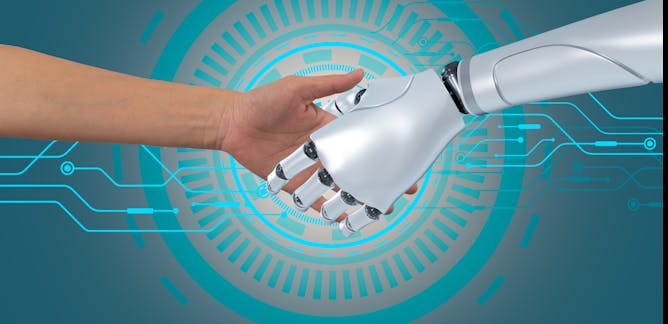
AI helps students skip right to the good stuff in this intro programming course
Leo Porter , University of California, San Diego and Daniel Zingaro , University of Toronto

AI can now attend a meeting and write code for you – here’s why you should be cautious
Simon Thorne , Cardiff Metropolitan University

From ancient Jewish texts to androids to AI, a just-right sequence of numbers or letters turns matter into meaning
Rhona Trauvitch , Florida International University

Ada Lovelace’s skills with language, music and needlepoint contributed to her pioneering work in computing
Corinna Schlombs , Rochester Institute of Technology

Why elementary and high school students should learn computer programming
Hugo G. Lapierre , Université du Québec à Montréal (UQAM) and Patrick Charland , Université du Québec à Montréal (UQAM)
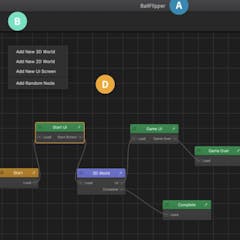
Nonprogrammers are building more of the world’s software – a computer scientist explains ‘ no-code ’
Tam Nguyen , University of Dayton

Ballet dancers should absolutely think about becoming computer programmers – here’s why
John Bryson , University of Birmingham

Curious Kids: who is Siri?
Allison Gardner , Keele University

The promise of the “learn to code” movement
Ivan Ruby , Concordia University and Ann-Louise Davidson , Concordia University

Taking a second look at the learn-to -code craze
Kate M. Miltner , USC Annenberg School for Communication and Journalism

Building privacy right into software code
Jean Yang , Carnegie Mellon University

Hunting hackers: An ethical hacker explains how to track down the bad guys
Timothy Summers , University of Maryland

Mobile phones offer a new way for Africa’s students to learn programming
Dr. Chao Mbogho , Kenya Methodist University
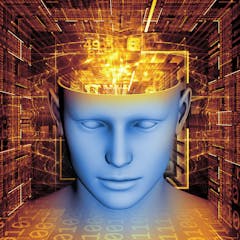
Moving toward computing at the speed of thought
Frances Van Scoy , West Virginia University

Ada Lovelace blazed a trail in science – we need more women to follow in her footsteps
Carron Shankland , University of Stirling


This little-known pioneering educator put coding in the classroom
Therese Keane , Swinburne University of Technology and Leon Sterling , Swinburne University of Technology

How to keep more girls in IT at schools if we’re to close the gender gap
Karin Verspoor , The University of Melbourne

Google wins in court, and so does losing party Oracle
Robert Harrison , Georgia State University

How computers broke science – and what we can do to fix it
Ben Marwick , University of Washington

In the push for marketable skills, are we forgetting the beauty and poetry of STEM disciplines?
Paul Myers , Trinity University
Related Topics
- Artificial intelligence (AI)
- Computer science
- Digital economy
- Programming
Top contributors
Professor Emeritus, Swinburne University of Technology
Head, The Cyber Academy, Edinburgh Napier University
Senior Lecturer in Applied Ethics & CyberSecurity, Griffith University
Assistant Lecturer in Software Engineering; PhD candidate in Computer Science Education, Monash University
Professor of IT, Southern Cross University
ESRC Future Research Leader Fellow, The University of Edinburgh
Professor of Cybersecurity, School of Computer Science and Informatics, De Montfort University
Professor of Enterprise and Competitiveness, University of Birmingham
Dean, School of Computing Technologies, RMIT University, RMIT University
Emeritus Professor, University of Nottingham, (currently CEO and Senior Vice President of the PETRA Group), University of Nottingham
Professor of Computer Networks and Distributed Systems, Bielefeld University
Lecturer in Software Engineering, Monash University
Professor of Reading and Children’s Development, The Open University
Professor in STEM Education, La Trobe University
Professor of AI, Research Group Leader, UNSW Sydney
- X (Twitter)
- Unfollow topic Follow topic
Using Python for Research
Take your introductory knowledge of Python programming to the next level and learn how to use Python 3 for your research.

Associated Schools

Harvard T.H. Chan School of Public Health
What you'll learn.
Python 3 programming basics (a review)
Python tools (e.g., NumPy and SciPy modules) for research applications
How to apply Python research tools in practical settings
Course description
This course bridges the gap between introductory and advanced courses in Python. While there are many excellent introductory Python courses available, most typically do not go deep enough for you to apply your Python skills to research projects. In this course, after first reviewing the basics of Python 3, we learn about tools commonly used in research settings.
Using a combination of a guided introduction and more independent in-depth exploration, you will get to practice your new Python skills with various case studies chosen for their scientific breadth and their coverage of different Python features. This run of the course includes revised assessments and a new module on machine learning.
Course Outline
Python Basics
Review of basic Python 3 language concepts and syntax.
Python Research Tools
Introduction to Python modules commonly used in scientific computation, such as NumPy.
Case Studies
This collection of six case studies from different disciplines provides opportunities to practice Python research skills.
Statistical Learning
Exploration of statistical learning using the scikit-learn library followed by a two-part case study that allows you to further practice your coding skills.
Instructors

Jukka-Pekka Onnela
You may also like.
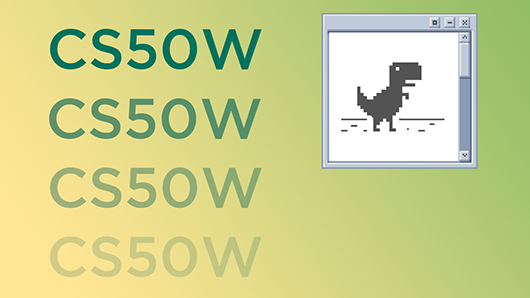
CS50's Web Programming with Python and JavaScript
This course picks up where CS50 leaves off, diving more deeply into the design and implementation of web apps with Python, JavaScript, and SQL using frameworks like Django, React, and Bootstrap.

CS50: Introduction to Computer Science
An introduction to the intellectual enterprises of computer science and the art of programming.

CS50's Understanding Technology
This is CS50’s introduction to technology for students who don’t (yet!) consider themselves computer persons.
Thank you for visiting nature.com. You are using a browser version with limited support for CSS. To obtain the best experience, we recommend you use a more up to date browser (or turn off compatibility mode in Internet Explorer). In the meantime, to ensure continued support, we are displaying the site without styles and JavaScript.
- View all journals
- Explore content
- About the journal
- Publish with us
- Sign up for alerts
Programming language articles within Scientific Reports
Article 12 February 2024 | Open Access
Navigating the nuances: comparative analysis and hyperparameter optimisation of neural architectures on contrast-enhanced MRI for liver and liver tumour segmentation
- Felix Quinton
- , Benoit Presles
- & Jean-Louis Alberini
Article 30 January 2024 | Open Access
Research on improved black widow algorithm for medical image denoising
- & Lina Zhang
Article 18 January 2024 | Open Access
GrowthPredict: A toolbox and tutorial-based primer for fitting and forecasting growth trajectories using phenomenological growth models
- Gerardo Chowell
- , Amanda Bleichrodt
- & Ruiyan Luo
Article 13 December 2023 | Open Access
A protein–protein interaction analysis tool for targeted cross-linking mass spectrometry
- Jongham Park
- , Ahrum Son
- & Hyunsoo Kim
Article 09 November 2023 | Open Access
An expandable voice user interface as lab assistant based on an improved version of Google’s speech recognition
- Maria Fernanda Avila Vazquez
- , Nicole Rupp
- & Thole Zuchner
Article 11 September 2023 | Open Access
Quantifying the impact of Wolbachia releases on dengue infection in Townsville, Australia
- Samson T. Ogunlade
- , Adeshina I. Adekunle
- & Emma S. McBryde
Article 18 May 2023 | Open Access
Diagnosis of autism spectrum disorder based on functional brain networks and machine learning
- Caroline L. Alves
- , Thaise G. L. de O. Toutain
- & Francisco A. Rodrigues
Article 11 April 2023 | Open Access
Targeting myeloid-derived suppressor cells in combination with tumor cell vaccination predicts anti-tumor immunity and breast cancer dormancy: an in silico experiment
- Reza Mehdizadeh
- , Seyed Peyman Shariatpanahi
- & Curzio Rüegg
Article 03 February 2023 | Open Access
Evaluation of the portability of computable phenotypes with natural language processing in the eMERGE network
- Jennifer A. Pacheco
- , Luke V. Rasmussen
- & WeiQi Wei
Article 28 January 2023 | Open Access
Improved downstream functional analysis of single-cell RNA-sequence data using DGAN
- Diksha Pandey
- & Perumal P. Onkara
Article 05 December 2022 | Open Access
Non-targeted detection of food adulteration using an ensemble machine-learning model
- Teresa Chung
- , Issan Yee San Tam
- & Lok-Ting Lau
Article 12 November 2022 | Open Access
Meta-analysis of the functional neuroimaging literature with probabilistic logic programming
- Majd Abdallah
- , Valentin Iovene
- & Demian Wassermann
Article 17 October 2022 | Open Access
Stacking ensemble learning model to predict 6-month mortality in ischemic stroke patients
- Lee Hwangbo
- , Yoon Jung Kang
- & Tae Hong Lee
Article 17 August 2022 | Open Access
Binary dose level classification of tumour microvascular response to radiotherapy using artificial intelligence analysis of optical coherence tomography images
- Anamitra Majumdar
- , Nader Allam
- & I. Alex Vitkin
Article 08 November 2021 | Open Access
Machine learning random forest for predicting oncosomatic variant NGS analysis
- Eric Pellegrino
- , Coralie Jacques
- & L’Houcine Ouafik
Article 04 November 2021 | Open Access
Design considerations for workflow management systems use in production genomics research and the clinic
- Azza E. Ahmed
- , Joshua M. Allen
- & Liudmila S. Mainzer
Article 06 July 2021 | Open Access
Prediction of individual COVID-19 diagnosis using baseline demographics and lab data
- Jimmy Zhang
- & Kuan-lin Huang
Article 22 June 2021 | Open Access
DotMotif: an open-source tool for connectome subgraph isomorphism search and graph queries
- Jordan K. Matelsky
- , Elizabeth P. Reilly
- & William Gray-Roncal
Article 22 October 2020 | Open Access
3D reconstruction of coronary artery bifurcations from coronary angiography and optical coherence tomography: feasibility, validation, and reproducibility
- , Saurabhi Samant
- & Yiannis S. Chatzizisis
Article 12 June 2019 | Open Access
Segmentation, Tracing, and Quantification of Microglial Cells from 3D Image Stacks
- Mahmoud Abdolhoseini
- , Murielle G. Kluge
- & Sarah J. Johnson
Article 14 March 2019 | Open Access
Segmentation of Heavily Clustered Nuclei from Histopathological Images
Browse broader subjects
- Computational biology and bioinformatics
- Systems biology
Quick links
- Explore articles by subject
- Guide to authors
- Editorial policies
Explore your training options in 10 minutes Get Started
- Graduate Stories
- Partner Spotlights
- Bootcamp Prep
- Bootcamp Admissions
- University Bootcamps
- Coding Tools
- Software Engineering
- Web Development
- Data Science
- Tech Guides
- Tech Resources
- Career Advice
- Online Learning
- Internships
- Apprenticeships
- Tech Salaries
- Associate Degree
- Bachelor's Degree
- Master's Degree
- University Admissions
- Best Schools
- Certifications
- Bootcamp Financing
- Higher Ed Financing
- Scholarships
- Financial Aid
- Best Coding Bootcamps
- Best Online Bootcamps
- Best Web Design Bootcamps
- Best Data Science Bootcamps
- Best Technology Sales Bootcamps
- Best Data Analytics Bootcamps
- Best Cybersecurity Bootcamps
- Best Digital Marketing Bootcamps
- Los Angeles
- San Francisco
- Browse All Locations
- Digital Marketing
- Machine Learning
- See All Subjects
- Bootcamps 101
- Full-Stack Development
- Career Changes
- View all Career Discussions
- Mobile App Development
- Cybersecurity
- Product Management
- UX/UI Design
- What is a Coding Bootcamp?
- Are Coding Bootcamps Worth It?
- How to Choose a Coding Bootcamp
- Best Online Coding Bootcamps and Courses
- Best Free Bootcamps and Coding Training
- Coding Bootcamp vs. Community College
- Coding Bootcamp vs. Self-Learning
- Bootcamps vs. Certifications: Compared
- What Is a Coding Bootcamp Job Guarantee?
- How to Pay for Coding Bootcamp
- Ultimate Guide to Coding Bootcamp Loans
- Best Coding Bootcamp Scholarships and Grants
- Education Stipends for Coding Bootcamps
- Get Your Coding Bootcamp Sponsored by Your Employer
- GI Bill and Coding Bootcamps
- Tech Intevriews
- Our Enterprise Solution
- Connect With Us
- Publication
- Reskill America
- Partner With Us
- Resource Center
- Bachelor’s Degree
- Master’s Degree
The Top 10 Most Interesting Computer Science Research Topics
Computer science touches nearly every area of our lives. With new advancements in technology, the computer science field is constantly evolving, giving rise to new computer science research topics. These topics attempt to answer various computer science research questions and how they affect the tech industry and the larger world.
Computer science research topics can be divided into several categories, such as artificial intelligence, big data and data science, human-computer interaction, security and privacy, and software engineering. If you are a student or researcher looking for computer research paper topics. In that case, this article provides some suggestions on examples of computer science research topics and questions.
Find your bootcamp match
What makes a strong computer science research topic.
A strong computer science topic is clear, well-defined, and easy to understand. It should also reflect the research’s purpose, scope, or aim. In addition, a strong computer science research topic is devoid of abbreviations that are not generally known, though, it can include industry terms that are currently and generally accepted.
Tips for Choosing a Computer Science Research Topic
- Brainstorm . Brainstorming helps you develop a few different ideas and find the best topic for you. Some core questions you should ask are, What are some open questions in computer science? What do you want to learn more about? What are some current trends in computer science?
- Choose a sub-field . There are many subfields and career paths in computer science . Before choosing a research topic, ensure that you point out which aspect of computer science the research will focus on. That could be theoretical computer science, contemporary computing culture, or even distributed computing research topics.
- Aim to answer a question . When you’re choosing a research topic in computer science, you should always have a question in mind that you’d like to answer. That helps you narrow down your research aim to meet specified clear goals.
- Do a comprehensive literature review . When starting a research project, it is essential to have a clear idea of the topic you plan to study. That involves doing a comprehensive literature review to better understand what has been learned about your topic in the past.
- Keep the topic simple and clear. The topic should reflect the scope and aim of the research it addresses. It should also be concise and free of ambiguous words. Hence, some researchers recommended that the topic be limited to five to 15 substantive words. It can take the form of a question or a declarative statement.
What’s the Difference Between a Research Topic and a Research Question?
A research topic is the subject matter that a researcher chooses to investigate. You may also refer to it as the title of a research paper. It summarizes the scope of the research and captures the researcher’s approach to the research question. Hence, it may be broad or more specific. For example, a broad topic may read, Data Protection and Blockchain, while a more specific variant can read, Potential Strategies to Privacy Issues on the Blockchain.
On the other hand, a research question is the fundamental starting point for any research project. It typically reflects various real-world problems and, sometimes, theoretical computer science challenges. As such, it must be clear, concise, and answerable.
How to Create Strong Computer Science Research Questions
To create substantial computer science research questions, one must first understand the topic at hand. Furthermore, the research question should generate new knowledge and contribute to the advancement of the field. It could be something that has not been answered before or is only partially answered. It is also essential to consider the feasibility of answering the question.
Top 10 Computer Science Research Paper Topics
1. battery life and energy storage for 5g equipment.
The 5G network is an upcoming cellular network with much higher data rates and capacity than the current 4G network. According to research published in the European Scientific Institute Journal, one of the main concerns with the 5G network is the high energy consumption of the 5G-enabled devices . Hence, this research on this topic can highlight the challenges and proffer unique solutions to make more energy-efficient designs.
2. The Influence of Extraction Methods on Big Data Mining
Data mining has drawn the scientific community’s attention, especially with the explosive rise of big data. Many research results prove that the extraction methods used have a significant effect on the outcome of the data mining process. However, a topic like this analyzes algorithms. It suggests strategies and efficient algorithms that may help understand the challenge or lead the way to find a solution.
3. Integration of 5G with Analytics and Artificial Intelligence
According to the International Finance Corporation, 5G and AI technologies are defining emerging markets and our world. Through different technologies, this research aims to find novel ways to integrate these powerful tools to produce excellent results. Subjects like this often spark great discoveries that pioneer new levels of research and innovation. A breakthrough can influence advanced educational technology, virtual reality, metaverse, and medical imaging.
4. Leveraging Asynchronous FPGAs for Crypto Acceleration
To support the growing cryptocurrency industry, there is a need to create new ways to accelerate transaction processing. This project aims to use asynchronous Field-Programmable Gate Arrays (FPGAs) to accelerate cryptocurrency transaction processing. It explores how various distributed computing technologies can influence mining cryptocurrencies faster with FPGAs and generally enjoy faster transactions.
5. Cyber Security Future Technologies
Cyber security is a trending topic among businesses and individuals, especially as many work teams are going remote. Research like this can stretch the length and breadth of the cyber security and cloud security industries and project innovations depending on the researcher’s preferences. Another angle is to analyze existing or emerging solutions and present discoveries that can aid future research.
6. Exploring the Boundaries Between Art, Media, and Information Technology
The field of computers and media is a vast and complex one that intersects in many ways. They create images or animations using design technology like algorithmic mechanism design, design thinking, design theory, digital fabrication systems, and electronic design automation. This paper aims to define how both fields exist independently and symbiotically.
7. Evolution of Future Wireless Networks Using Cognitive Radio Networks
This research project aims to study how cognitive radio technology can drive evolution in future wireless networks. It will analyze the performance of cognitive radio-based wireless networks in different scenarios and measure its impact on spectral efficiency and network capacity. The research project will involve the development of a simulation model for studying the performance of cognitive radios in different scenarios.
8. The Role of Quantum Computing and Machine Learning in Advancing Medical Predictive Systems
In a paper titled Exploring Quantum Computing Use Cases for Healthcare , experts at IBM highlighted precision medicine and diagnostics to benefit from quantum computing. Using biomedical imaging, machine learning, computational biology, and data-intensive computing systems, researchers can create more accurate disease progression prediction, disease severity classification systems, and 3D Image reconstruction systems vital for treating chronic diseases.
9. Implementing Privacy and Security in Wireless Networks
Wireless networks are prone to attacks, and that has been a big concern for both individual users and organizations. According to the Cyber Security and Infrastructure Security Agency CISA, cyber security specialists are working to find reliable methods of securing wireless networks . This research aims to develop a secure and privacy-preserving communication framework for wireless communication and social networks.
10. Exploring the Challenges and Potentials of Biometric Systems Using Computational Techniques
Much discussion surrounds biometric systems and the potential for misuse and privacy concerns. When exploring how biometric systems can be effectively used, issues such as verification time and cost, hygiene, data bias, and cultural acceptance must be weighed. The paper may take a critical study into the various challenges using computational tools and predict possible solutions.
Other Examples of Computer Science Research Topics & Questions
Computer research topics.
- The confluence of theoretical computer science, deep learning, computational algorithms, and performance computing
- Exploring human-computer interactions and the importance of usability in operating systems
- Predicting the limits of networking and distributed systems
- Controlling data mining on public systems through third-party applications
- The impact of green computing on the environment and computational science
Computer Research Questions
- Why are there so many programming languages?
- Is there a better way to enhance human-computer interactions in computer-aided learning?
- How safe is cloud computing, and what are some ways to enhance security?
- Can computers effectively assist in the sequencing of human genes?
- How valuable is SCRUM methodology in Agile software development?
Choosing the Right Computer Science Research Topic
Computer science research is a vast field, and it can be challenging to choose the right topic. There are a few things to keep in mind when making this decision. Choose a topic that you are interested in. This will make it easier to stay motivated and produce high-quality research for your computer science degree .
Select a topic that is relevant to your field of study. This will help you to develop specialized knowledge in the area. Choose a topic that has potential for future research. This will ensure that your research is relevant and up-to-date. Typically, coding bootcamps provide a framework that streamlines students’ projects to a specific field, doing their search for a creative solution more effortless.
Computer Science Research Topics FAQ
To start a computer science research project, you should look at what other content is out there. Complete a literature review to know the available findings surrounding your idea. Design your research and ensure that you have the necessary skills and resources to complete the project.
The first step to conducting computer science research is to conceptualize the idea and review existing knowledge about that subject. You will design your research and collect data through surveys or experiments. Analyze your data and build a prototype or graphical model. You will also write a report and present it to a recognized body for review and publication.
You can find computer science research jobs on the job boards of many universities. Many universities have job boards on their websites that list open positions in research and academia. Also, many Slack and GitHub channels for computer scientists provide regular updates on available projects.
There are several hot topics and questions in AI that you can build your research on. Below are some AI research questions you may consider for your research paper.
- Will it be possible to build artificial emotional intelligence?
- Will robots replace humans in all difficult cumbersome jobs as part of the progress of civilization?
- Can artificial intelligence systems self-improve with knowledge from the Internet?
About us: Career Karma is a platform designed to help job seekers find, research, and connect with job training programs to advance their careers. Learn about the CK publication .
What's Next?
Get matched with top bootcamps
Ask a question to our community, take our careers quiz.

Leave a Reply Cancel reply
Your email address will not be published. Required fields are marked *

77 Programming Essay Topics
🏆 best essay topics on programming, 🌶️ hot programming essay topics, 👍 good programming research topics & essay examples, 🎓 most interesting programming research titles.
- Programming Code for ATM Machine
- Transshipment Problem Solving with Linear Programming
- Software Engineering Management: Unified Software Development Process and Extreme Programming
- Linear Programming Operations Management
- Linear Programming and Sensitivity Analysis
- Programming Student Management System
- Classes and Objects in Java Programming
- Scheduling Problems Management: Linear Programming Models In the example of scheduling, linear programming models are used for identifying the optimal employment of limited resources, including human resources.
- Plan to Support Students Learning English and Programming Learning English and coding at the same time challenges for non-native English speakers when it came to reading educational content, communicating technically and writing software.
- Computer Programs: Programming Techniques For computers to execute their functions, specific programs with specific applications are used. Programs must be executable by any computer depending on the program instruction.
- JavaScript-Based AJAX, MVC, and Functional Programming This paper will describe JavaScript-based AJAX, MVC, and Functional Programming, discuss their pros, compares them, and find scenarios where they are appropriate
- Loops in Java Programming: FOR, WHILE, and DO…WHILE Java offers three basic types of loops: FOR, WHILE, and DO…WHILE. Their fundamental function is executing a block of code repeatedly, based on a Boolean condition.
- Java as a Programming Language: Creating an App This work is a short description of the general procedure for executing a Java program, including creating, compiling, and finally executing a product.
- Inheritance and Polymorphism in Programming This article defines the concepts of inheritance and polymorphism and provides examples of their use in object-oriented programming.
- Teaching Computer Science to Non-English Speakers Learning computer science presents many challenges. The paper investigates significant barriers to CS education and how the process could be improved.
- Challenges of Computer Programming for Non-English Speakers The initial idea was to choose a topic connected with the problems that some inexperienced programmers may face.
- Aspects of Coral Programming Using functions in coral is very useful when creating programs that require their specific input. Using the current case, breaking the program is necessary.
- Scrum: Extreme Programming Without Engineering The report contrasts XP and Scrum’s non-technical practices and claims that Scrum is just XP without the technical practices.
- Parallel Programming Analysis System performance from a hardware perspective cannot be infinitely improved due to limitations regarding heat dissipation and power consumption.
- Paired Programming Analysis In the engineering of software, the software methodology applied plays a significant role in the final product of the process.
- Object-Oriented vs Procedural Programming Paradigms Procedural programming and Object-oriented programming are fundamentally different in how they approach problem-solving and organizing programs.
- Programming: Personal Development Plans In the article, the author shares his impressions of the course on Java programming and reflects on his next steps, which will allow him to grow as a programmer.
- Technical Communication and Programming Modern computer programs written in high-level programming languages are often complex to use and understand, especially for users who are not familiar with the concept of software development.
- Access Risks in Application Programming Interface The paper overviews the security concerns of application programming interfaces and offers ways to mitigate identity and access management risks.
- Linear Programming Models Review The linear model addresses the challenge of forecasting the capacity of an e-commerce company to sell the maximum number of units possible.
- Linear Programming Usage and Analysis Linear programming (LP) is used to find the optimal solution for functions operating under known constraints
- The “Hour of Code” Project: Motivation to Programming The paper includes an analysis of some of the videos and explores the possible outcomes of the Hour of Code approach with a focus on the topics of creativity and success.
- Decision Problems Under Risk and Chance-Constrained Programming: Dilemmas in the Transition
- Linear and Nonlinear Separation of Patterns by Linear Programming
- Programming Capabilities and Application Software Comparison
- Bilevel Programming for the Continuous Transport Network Design Problem
- Computer Programming and Its Effect on Our Lives
- Sequence, Selection, and Iteration in Programming Language
- Aggregating Classifiers With Mathematical Programming
- Code Refactoring Using Slice-Based Cohesion Metrics and Aspect-Oriented Programming
- Agile Modeling, Agile Software Development, and Extreme Programming
- Chance Constrained Programming and Its Applications to Energy Management
- Capacity Planning With Technology Replacement by Stochastic Dynamic Programming
- Airline Network Revenue Management by Multistage Stochastic Programming
- How CAD Programming Helps the Architectural Plans and Design Firms
- Combining Linear Programming and Automated Planning to Solve Intermodal Transportation Problems
- Algorithms and Logic for Computer Programming
- Differences Between Procedural-Based and Object-Oriented Programming
- Can Programming Frameworks Bring Smartphones Into the Mainstream of Psychological Science?
- The Main Concept of a Programming Model
- Bill Gates and Nolan Bushnell: Pioneers of Computer Programming
- Comparison of Angular2 and Java Programming Frameworks
- Allocating Selling Effort Via Dynamic Programming
- Innovations and Programming Techniques for Risk Analysis
- Comparing the Factor-Rating System and the Transportation Method of Linear Programming
- Alternative Estimation Methods for Two-Regime Models: A Mathematical Programming Approach
- Computer Organization with Machine Level Programming
- Application Programming Interface for Radiofrequency Transceiver
- Integer Programming: Methods, Uses, Computations
- Degeneracy, Duality, and Shadow Prices in Linear Programming
- Pair Programming and Lean Principles of Software Development
- Branch-and-Bound Strategies for Dynamic Programming
- Compilers: Object-oriented Programming Language
- Integrating Combinatorial Algorithms Into a Linear Programming Solver
- Applying Integer Linear Programming to the Fleet Assignment Problem
- Comparing Extreme Programming and Waterfall Project Results
- Description and Occupational Outlook of Computer Programming
- Concepts, Techniques, and Models of Computer Programming
- Endogenizing the Rise and Fall of Urban Subcenters via Discrete Programming Models
- Complex Matrix Decomposition and Quadratic Programming
- Linear Programming: Advantages, Disadvantages, and Strategies
- Designing Reusable Class and Object-Oriented Programming
- Computer and Mathematical Sciences: Programming Paradigms
- How Grace Hopper Contributed to the Early Computer Programming Development
- Digital Circuit Optimization via Geometric Programming
- Inequalities for Stochastic Linear Programming Problems
- Computer Programming and Program Development
- Discrete Dynamic Programming and Capital Allocation
- Programming Techniques and Environments in a Technology Management Department
- Computer Science and Programming of the Mechanical Industry
- Dynamic Choice Theory and Dynamic Programming
- Continuous Reformulations for Zero-One Programming Problems
Cite this post
- Chicago (N-B)
- Chicago (A-D)
StudyCorgi. (2023, May 7). 77 Programming Essay Topics. https://studycorgi.com/ideas/programming-essay-topics/
"77 Programming Essay Topics." StudyCorgi , 7 May 2023, studycorgi.com/ideas/programming-essay-topics/.
StudyCorgi . (2023) '77 Programming Essay Topics'. 7 May.
1. StudyCorgi . "77 Programming Essay Topics." May 7, 2023. https://studycorgi.com/ideas/programming-essay-topics/.
Bibliography
StudyCorgi . "77 Programming Essay Topics." May 7, 2023. https://studycorgi.com/ideas/programming-essay-topics/.
StudyCorgi . 2023. "77 Programming Essay Topics." May 7, 2023. https://studycorgi.com/ideas/programming-essay-topics/.
These essay examples and topics on Programming were carefully selected by the StudyCorgi editorial team. They meet our highest standards in terms of grammar, punctuation, style, and fact accuracy. Please ensure you properly reference the materials if you’re using them to write your assignment.
This essay topic collection was updated on December 28, 2023 .
- Research & Faculty
- Offices & Services
- Information for:
- Faculty & Staff
- News & Events
- Contact & Visit
- About the Department
- Message from the Chair
- Computer Science Major (BS/BA)
- Computer Science Minor
- Data Science and Engineering Minor
- Combined BS (or BA)/MS Degree Program
- Intro Courses
- Special Programs & Opportunities
- Student Groups & Organizations
- Undergraduate Programs
- Undergraduate Research
- Senior Thesis
- Peer Mentors
- Curriculum & Requirements
- MS in Computer Science
- PhD in Computer Science
- Admissions FAQ
- Financial Aid
- Graduate Programs
- Courses Collapse Courses Submenu
- Research Overview
- Research Areas
- Systems and Networking
- Security and Privacy
- Programming Languages
- Artificial Intelligence
- Human-Computer Interaction
- Vision and Graphics
- Groups & Labs
- Affiliated Centers & Institutes
- Industry Partnerships
- Adobe Research Partnership
- Center for Advancing Safety of Machine Intelligence
- Submit a Tech Report
- Tech Reports
- Tenure-Track Faculty
- Faculty of Instruction
- Affiliated Faculty
- Adjunct Faculty
- Postdoctoral Fellows
- PhD Students
- Outgoing PhDs and Postdocs
- Visiting Scholars
- News Archive
- Weekly Bulletin
- Monthly Student Newsletter
- All Public Events
- Seminars, Workshops, & Talks
- Distinguished Lecture Series
- CS Colloquium Series
- CS + X Events
- Tech Talk Series
- Honors & Awards
- External Faculty Awards
- University Awards
- Department Awards
- Student Resources
- Undergraduate Student Resources
- MS Student Resources
- PhD Student Resources
- Student Organization Resources
- Faculty Resources
- Postdoc Resources
- Staff Resources
- Purchasing, Procurement and Vendor Payment
- Expense Reimbursements
- Department Operations and Facilities
- Initiatives
- Student Groups
- CS Faculty Diversity Committee
- Broadening Participation in Computing (BPC) Plan
- Northwestern Engineering
Research / Research Areas Programming Languages
In Programming Languages research, we explore the ways in which computations are expressed in written form. Our research focuses on three central ideas: the semantics of a particular piece of program and its relationships with surrounding parts, the efficiency of a program's execution, and the design of programming languages that enable people to express their ideas accurately.

Simone Campanoni
Associate Professor of Computer Science and (by courtesy) Electrical and Computer Engineering
Email Simone Campanoni

Christos Dimoulas
Assistant Professor of Computer Science
Email Christos Dimoulas

Robby Findler
Professor of Computer Science
Email Robby Findler

Eleanor O'Rourke
Assistant Professor of Education and Social Policy
Email Eleanor O'Rourke

Vincent St-Amour
Associate Professor of Instruction
Email Vincent St-Amour
More in this section
- Engineering Home
- CS Department
Related Links
- Research at McCormick
- Meet our Faculty
- Northwestern Research Overview
Contact Info
Robby Findler Associate Chair and Professor Email

Choose Your Test
Sat / act prep online guides and tips, 113 great research paper topics.
General Education

One of the hardest parts of writing a research paper can be just finding a good topic to write about. Fortunately we've done the hard work for you and have compiled a list of 113 interesting research paper topics. They've been organized into ten categories and cover a wide range of subjects so you can easily find the best topic for you.
In addition to the list of good research topics, we've included advice on what makes a good research paper topic and how you can use your topic to start writing a great paper.
What Makes a Good Research Paper Topic?
Not all research paper topics are created equal, and you want to make sure you choose a great topic before you start writing. Below are the three most important factors to consider to make sure you choose the best research paper topics.
#1: It's Something You're Interested In
A paper is always easier to write if you're interested in the topic, and you'll be more motivated to do in-depth research and write a paper that really covers the entire subject. Even if a certain research paper topic is getting a lot of buzz right now or other people seem interested in writing about it, don't feel tempted to make it your topic unless you genuinely have some sort of interest in it as well.
#2: There's Enough Information to Write a Paper
Even if you come up with the absolute best research paper topic and you're so excited to write about it, you won't be able to produce a good paper if there isn't enough research about the topic. This can happen for very specific or specialized topics, as well as topics that are too new to have enough research done on them at the moment. Easy research paper topics will always be topics with enough information to write a full-length paper.
Trying to write a research paper on a topic that doesn't have much research on it is incredibly hard, so before you decide on a topic, do a bit of preliminary searching and make sure you'll have all the information you need to write your paper.
#3: It Fits Your Teacher's Guidelines
Don't get so carried away looking at lists of research paper topics that you forget any requirements or restrictions your teacher may have put on research topic ideas. If you're writing a research paper on a health-related topic, deciding to write about the impact of rap on the music scene probably won't be allowed, but there may be some sort of leeway. For example, if you're really interested in current events but your teacher wants you to write a research paper on a history topic, you may be able to choose a topic that fits both categories, like exploring the relationship between the US and North Korea. No matter what, always get your research paper topic approved by your teacher first before you begin writing.
113 Good Research Paper Topics
Below are 113 good research topics to help you get you started on your paper. We've organized them into ten categories to make it easier to find the type of research paper topics you're looking for.
Arts/Culture
- Discuss the main differences in art from the Italian Renaissance and the Northern Renaissance .
- Analyze the impact a famous artist had on the world.
- How is sexism portrayed in different types of media (music, film, video games, etc.)? Has the amount/type of sexism changed over the years?
- How has the music of slaves brought over from Africa shaped modern American music?
- How has rap music evolved in the past decade?
- How has the portrayal of minorities in the media changed?

Current Events
- What have been the impacts of China's one child policy?
- How have the goals of feminists changed over the decades?
- How has the Trump presidency changed international relations?
- Analyze the history of the relationship between the United States and North Korea.
- What factors contributed to the current decline in the rate of unemployment?
- What have been the impacts of states which have increased their minimum wage?
- How do US immigration laws compare to immigration laws of other countries?
- How have the US's immigration laws changed in the past few years/decades?
- How has the Black Lives Matter movement affected discussions and view about racism in the US?
- What impact has the Affordable Care Act had on healthcare in the US?
- What factors contributed to the UK deciding to leave the EU (Brexit)?
- What factors contributed to China becoming an economic power?
- Discuss the history of Bitcoin or other cryptocurrencies (some of which tokenize the S&P 500 Index on the blockchain) .
- Do students in schools that eliminate grades do better in college and their careers?
- Do students from wealthier backgrounds score higher on standardized tests?
- Do students who receive free meals at school get higher grades compared to when they weren't receiving a free meal?
- Do students who attend charter schools score higher on standardized tests than students in public schools?
- Do students learn better in same-sex classrooms?
- How does giving each student access to an iPad or laptop affect their studies?
- What are the benefits and drawbacks of the Montessori Method ?
- Do children who attend preschool do better in school later on?
- What was the impact of the No Child Left Behind act?
- How does the US education system compare to education systems in other countries?
- What impact does mandatory physical education classes have on students' health?
- Which methods are most effective at reducing bullying in schools?
- Do homeschoolers who attend college do as well as students who attended traditional schools?
- Does offering tenure increase or decrease quality of teaching?
- How does college debt affect future life choices of students?
- Should graduate students be able to form unions?

- What are different ways to lower gun-related deaths in the US?
- How and why have divorce rates changed over time?
- Is affirmative action still necessary in education and/or the workplace?
- Should physician-assisted suicide be legal?
- How has stem cell research impacted the medical field?
- How can human trafficking be reduced in the United States/world?
- Should people be able to donate organs in exchange for money?
- Which types of juvenile punishment have proven most effective at preventing future crimes?
- Has the increase in US airport security made passengers safer?
- Analyze the immigration policies of certain countries and how they are similar and different from one another.
- Several states have legalized recreational marijuana. What positive and negative impacts have they experienced as a result?
- Do tariffs increase the number of domestic jobs?
- Which prison reforms have proven most effective?
- Should governments be able to censor certain information on the internet?
- Which methods/programs have been most effective at reducing teen pregnancy?
- What are the benefits and drawbacks of the Keto diet?
- How effective are different exercise regimes for losing weight and maintaining weight loss?
- How do the healthcare plans of various countries differ from each other?
- What are the most effective ways to treat depression ?
- What are the pros and cons of genetically modified foods?
- Which methods are most effective for improving memory?
- What can be done to lower healthcare costs in the US?
- What factors contributed to the current opioid crisis?
- Analyze the history and impact of the HIV/AIDS epidemic .
- Are low-carbohydrate or low-fat diets more effective for weight loss?
- How much exercise should the average adult be getting each week?
- Which methods are most effective to get parents to vaccinate their children?
- What are the pros and cons of clean needle programs?
- How does stress affect the body?
- Discuss the history of the conflict between Israel and the Palestinians.
- What were the causes and effects of the Salem Witch Trials?
- Who was responsible for the Iran-Contra situation?
- How has New Orleans and the government's response to natural disasters changed since Hurricane Katrina?
- What events led to the fall of the Roman Empire?
- What were the impacts of British rule in India ?
- Was the atomic bombing of Hiroshima and Nagasaki necessary?
- What were the successes and failures of the women's suffrage movement in the United States?
- What were the causes of the Civil War?
- How did Abraham Lincoln's assassination impact the country and reconstruction after the Civil War?
- Which factors contributed to the colonies winning the American Revolution?
- What caused Hitler's rise to power?
- Discuss how a specific invention impacted history.
- What led to Cleopatra's fall as ruler of Egypt?
- How has Japan changed and evolved over the centuries?
- What were the causes of the Rwandan genocide ?

- Why did Martin Luther decide to split with the Catholic Church?
- Analyze the history and impact of a well-known cult (Jonestown, Manson family, etc.)
- How did the sexual abuse scandal impact how people view the Catholic Church?
- How has the Catholic church's power changed over the past decades/centuries?
- What are the causes behind the rise in atheism/ agnosticism in the United States?
- What were the influences in Siddhartha's life resulted in him becoming the Buddha?
- How has media portrayal of Islam/Muslims changed since September 11th?
Science/Environment
- How has the earth's climate changed in the past few decades?
- How has the use and elimination of DDT affected bird populations in the US?
- Analyze how the number and severity of natural disasters have increased in the past few decades.
- Analyze deforestation rates in a certain area or globally over a period of time.
- How have past oil spills changed regulations and cleanup methods?
- How has the Flint water crisis changed water regulation safety?
- What are the pros and cons of fracking?
- What impact has the Paris Climate Agreement had so far?
- What have NASA's biggest successes and failures been?
- How can we improve access to clean water around the world?
- Does ecotourism actually have a positive impact on the environment?
- Should the US rely on nuclear energy more?
- What can be done to save amphibian species currently at risk of extinction?
- What impact has climate change had on coral reefs?
- How are black holes created?
- Are teens who spend more time on social media more likely to suffer anxiety and/or depression?
- How will the loss of net neutrality affect internet users?
- Analyze the history and progress of self-driving vehicles.
- How has the use of drones changed surveillance and warfare methods?
- Has social media made people more or less connected?
- What progress has currently been made with artificial intelligence ?
- Do smartphones increase or decrease workplace productivity?
- What are the most effective ways to use technology in the classroom?
- How is Google search affecting our intelligence?
- When is the best age for a child to begin owning a smartphone?
- Has frequent texting reduced teen literacy rates?

How to Write a Great Research Paper
Even great research paper topics won't give you a great research paper if you don't hone your topic before and during the writing process. Follow these three tips to turn good research paper topics into great papers.
#1: Figure Out Your Thesis Early
Before you start writing a single word of your paper, you first need to know what your thesis will be. Your thesis is a statement that explains what you intend to prove/show in your paper. Every sentence in your research paper will relate back to your thesis, so you don't want to start writing without it!
As some examples, if you're writing a research paper on if students learn better in same-sex classrooms, your thesis might be "Research has shown that elementary-age students in same-sex classrooms score higher on standardized tests and report feeling more comfortable in the classroom."
If you're writing a paper on the causes of the Civil War, your thesis might be "While the dispute between the North and South over slavery is the most well-known cause of the Civil War, other key causes include differences in the economies of the North and South, states' rights, and territorial expansion."
#2: Back Every Statement Up With Research
Remember, this is a research paper you're writing, so you'll need to use lots of research to make your points. Every statement you give must be backed up with research, properly cited the way your teacher requested. You're allowed to include opinions of your own, but they must also be supported by the research you give.
#3: Do Your Research Before You Begin Writing
You don't want to start writing your research paper and then learn that there isn't enough research to back up the points you're making, or, even worse, that the research contradicts the points you're trying to make!
Get most of your research on your good research topics done before you begin writing. Then use the research you've collected to create a rough outline of what your paper will cover and the key points you're going to make. This will help keep your paper clear and organized, and it'll ensure you have enough research to produce a strong paper.
What's Next?
Are you also learning about dynamic equilibrium in your science class? We break this sometimes tricky concept down so it's easy to understand in our complete guide to dynamic equilibrium .
Thinking about becoming a nurse practitioner? Nurse practitioners have one of the fastest growing careers in the country, and we have all the information you need to know about what to expect from nurse practitioner school .
Want to know the fastest and easiest ways to convert between Fahrenheit and Celsius? We've got you covered! Check out our guide to the best ways to convert Celsius to Fahrenheit (or vice versa).
These recommendations are based solely on our knowledge and experience. If you purchase an item through one of our links, PrepScholar may receive a commission.

Christine graduated from Michigan State University with degrees in Environmental Biology and Geography and received her Master's from Duke University. In high school she scored in the 99th percentile on the SAT and was named a National Merit Finalist. She has taught English and biology in several countries.
Ask a Question Below
Have any questions about this article or other topics? Ask below and we'll reply!
Improve With Our Famous Guides
- For All Students
The 5 Strategies You Must Be Using to Improve 160+ SAT Points
How to Get a Perfect 1600, by a Perfect Scorer
Series: How to Get 800 on Each SAT Section:
Score 800 on SAT Math
Score 800 on SAT Reading
Score 800 on SAT Writing
Series: How to Get to 600 on Each SAT Section:
Score 600 on SAT Math
Score 600 on SAT Reading
Score 600 on SAT Writing
Free Complete Official SAT Practice Tests
What SAT Target Score Should You Be Aiming For?
15 Strategies to Improve Your SAT Essay
The 5 Strategies You Must Be Using to Improve 4+ ACT Points
How to Get a Perfect 36 ACT, by a Perfect Scorer
Series: How to Get 36 on Each ACT Section:
36 on ACT English
36 on ACT Math
36 on ACT Reading
36 on ACT Science
Series: How to Get to 24 on Each ACT Section:
24 on ACT English
24 on ACT Math
24 on ACT Reading
24 on ACT Science
What ACT target score should you be aiming for?
ACT Vocabulary You Must Know
ACT Writing: 15 Tips to Raise Your Essay Score
How to Get Into Harvard and the Ivy League
How to Get a Perfect 4.0 GPA
How to Write an Amazing College Essay
What Exactly Are Colleges Looking For?
Is the ACT easier than the SAT? A Comprehensive Guide
Should you retake your SAT or ACT?
When should you take the SAT or ACT?
Stay Informed
Get the latest articles and test prep tips!
Looking for Graduate School Test Prep?
Check out our top-rated graduate blogs here:
GRE Online Prep Blog
GMAT Online Prep Blog
TOEFL Online Prep Blog
Holly R. "I am absolutely overjoyed and cannot thank you enough for helping me!”
224 Research Topics on Technology & Computer Science
Are you new to the world of technology? Do you need topics related to technology to write about? No worries, Custom-writing.org experts are here to help! In this article, we offer you a multitude of creative and interesting technology topics from various research areas, including information technology and computer science. So, let’s start!
Our specialists will write a custom essay specially for you!
- 🔝 Top 10 Topics
👋 Introduction
- 💾 Top 10 Computer Science Topics
⚙ Artificial Intelligence
💉 biotechnology, 📡 communications and media.
- 💻Computer Science & Engineering
🔋 Energy & Power Technologies
🍗 food technology, 😷 medical devices & diagnostics, 💊 pharmaceutical technologies.
- 🚈 Transportation
✋ Conclusion
🔍 references, 🔝 top 10 technology topics.
- The difference between VR and AR
- Is genetic engineering ethical?
- Can digital books replace print ones?
- The impact of virtual reality on education
- 5 major fields of robotics
- The risks and dangers of biometrics
- Nanotechnology in medicine
- Digital technology’s impact on globalization
- Is proprietary software less secure than open-source?
- The difference between deep learning and machine learning
Is it a good thing that technologies and computer science are developing so fast? No one knows for sure. There are too many different opinions, and some of them are quite radical! However, we know that technologies have changed our world once and forever. Computer science affects every single area of people’s lives.

Just think about Netflix . Can you imagine that 24 years ago it didn’t exist? How did people live without it? Well, in 2024, the entertainment field has gone so far that you can travel anywhere while sitting in your room. All you would have to do is just order a VR (virtual reality) headset. Moreover, personal computers give an unlimited flow of information, which has changed the entire education system.
Every day, technologies become smarter and smaller. A smartphone in your pocket may be as powerful as your laptop. No doubt, the development of computer science builds our future. It is hard to count how many research areas in technologies and computer science are there. But it is not hard to name the most important of them.
Artificial intelligence tops the charts, of course. However, engineering and biotechnology are not far behind. Communications and media are developing super fast as well. The research is also done in areas that make our lives better and more comfortable. The list of them includes transport, food and energy, medical, and pharmaceutical areas.
So check out our list of 204 most relevant computer science research topics below. Maybe one of them will inspire you to do revolutionary research!
Just in 1 hour! We will write you a plagiarism-free paper in hardly more than 1 hour
💾 Top 10 Computer Science Research Topics
💡 technologies & computer science: research ideas.
Many people probably picture robots from the movie “I, Robot” when they hear about artificial intelligence. However, it is far from the truth.
AI is meant to be as close to a rational way of thinking as possible. It uses binary logic (just like computers) to help solve problems in many areas. Applied AI is only aimed at one task. A generalized AI branch is looking into a human-like machine that can learn to do anything.

Applied AI already helps researchers in quantum physics and medicine. You deal with AI every day when online shops suggest some items based on your previous purchases. Siri and self-driving cars are also examples of applied AI.
Generalized AI is supposed to be a copy of multitasking human intelligence. However, it is still in the stage of development. Computer technology has yet to reach the level necessary for its creation.
One of the latest trends in this area is improving healthcare management. It is done through the digitalization of all the information in hospitals and even helping diagnose the patients.
Receive a plagiarism-free paper tailored to your instructions. Cut 15% off your first order!
Also, privacy issues and facial recognition technologies are being researched. For example, some governments collect biometric data to reduce and even predict crime.
Research Topics on Artificial Intelligence Technology
Since AI development is exceptionally relevant nowadays, it would be smart to invest your time and effort into researching it. Here are some ideas on artificial intelligence research topics that you can look into:
- What areas of life machine learning are the most influential?
- How to choose the right algorithm for machine learning ?
- Supervised vs. unsupervised machine learning: compare & contrast
- Reinforcement machine learning algorithms
- Deep learning as a subset of machine learning
- Deep learning & artificial neural networks
- How do artificial neural networks work?
- A comparison of model-free & model-based reinforcement learning algorithms
- Reinforcement learning: single vs. multi-agent
- How do social robots interact with humans?
- Robotics in NASA
- Natural language processing: chatbots
- How does natural language processing produce natural language?
- Natural language processing vs. machine learning
- Artificial intelligence in computer vision
- Computer vision application: autonomous vehicles
- Recommender systems’ approaches
- Recommender systems: content-based recommendation vs. collaborative filtering
- Internet of things & artificial intelligence: the interconnection
- How much data do the Internet of things devices generate?
Biotechnology uses living organisms to modify different products. Even the simple thing as baking bread is a process of biotechnology. However, nowadays, this area went as far as changing the organisms’ DNA. Genetics and biochemistry are also a part of the biotechnology area.
The development of this area allows people to cure diseases with the help of new medicines. In agriculture, more and more research is done on biological treatment and modifying plants. Biotechnology is even involved in the production of our groceries, household chemicals, and textiles.
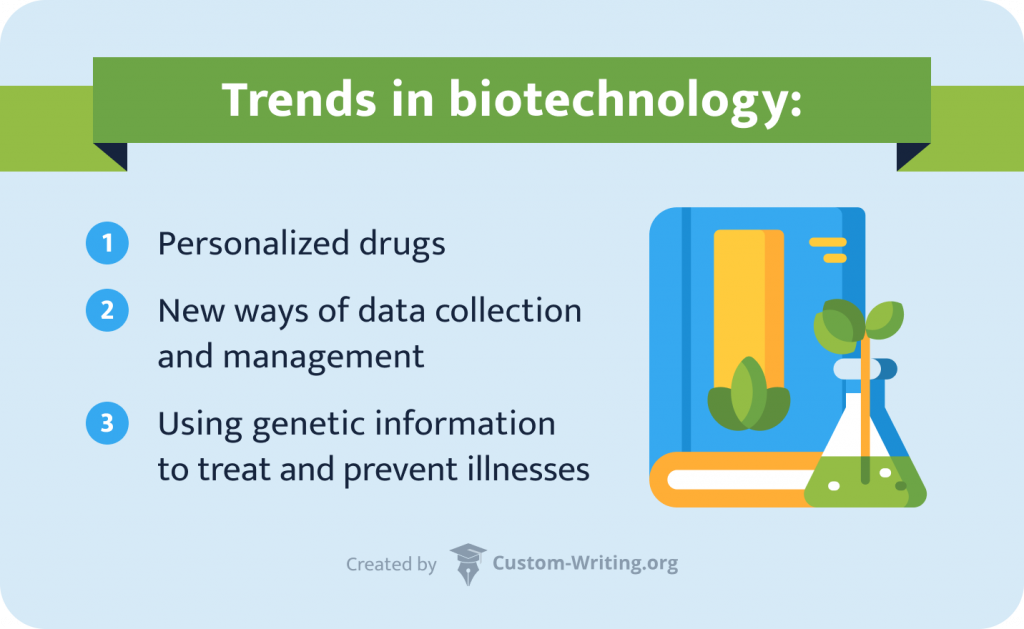
There are many exciting trends in biotechnology now that carry the potential of changing our world! For example, scientists are working on creating personalized drugs. This is feasible once they apply computer science to analyze people’s DNA.
Get an originally-written paper according to your instructions!
Also, thanks to using new technologies, doctors can collect exact data and provide the patients with correct diagnosis and treatment. Now, you don’t even need to leave your place to get a doctor’s check-up. Just use telehealth!
Data management is developing in the biotechnology area as well. Thanks to that, doctors and scientists can store and access a tremendous amount of information.
The most exciting is the fact that new technology enables specialists to assess genetic information to treat and prevent illnesses! It may solve the problem of some diseases that were considered untreatable before.
Research Topics on Biotechnology
You can use the following examples of research questions on biotechnology for presentation or even a PhD paper! Here is a wide range of topics on biotechnology and its relation to agriculture, nanotechnology, and many more:
- Self-sufficient protein supply and biotechnology in farming
- Evaporation vs. evapotranspiration
- DNA cloning and a southern blot
- Pharmacogenetics & personalized drugs
- Is cloning “playing God”?
- Pharmacogenetics: cancer medicines
- How much can we control our genetics, at what point do we cease to be human?
- Bio ethics and stem cell research
- Genetic engineering: gene therapy
- The potential benefits of genetic engineering
- Genetic engineering: dangers and opportunities
- Mycobacterium tuberculosis : counting the proteins
- Plant genetic enhancement: developing resistance to scarcity
- Y-chromosome genotyping: the case of South Africa
- Agricultural biotechnology: GMO crops
- How are new vaccines developed?
- Nanotechnology in treating HIV
- Allergenic potential & biotechnology
- Whole-genome sequencing in biotechnology
- Genes in heavy metal tolerance: an overview
- Food biotechnology & food-borne illnesses
- How to eliminate heat-resistant microorganisms with ultraviolet?
- High-throughput screening & biotechnology
- How do new food processing technologies affect bacteria related to Aspalathus Linearis?
- Is sweet sorghum suitable for the production of bioethanol in Africa?
- How can pesticides help to diagnose cancer?
- How is embelin used to prevent cancer?
One of the first areas that technologies affected was communications and media. People from the last century couldn’t have imagined how easy it would be to get connected with anyone! Internet connection starts appearing even in the most remote places.
Nowadays, media is used not only for social interaction but for business development and educational purposes as well. You can now start an entirely online business or use special tools to promote the existing one. Also, many leading universities offer online degrees.
In communications and media, AI has been playing the role of enhancement recently. The technology helps create personalized content for always demanding consumers.
Developing media also create numerous job opportunities. For instance, recently, an influencer has become a trending career. Influencers always use the most relevant communication tools available. At the moment, live videos and podcasting are on the top.
Now, you just need to reach your smartphone to access all the opportunities mentioned above! You can apply for a college, find a job, or reach out to all your followers online. It is hard to imagine how far communication and media can go…
Communications and Media Technology Research Topics
There are quite a few simple yet exciting ideas for media and communications technology research topics. Hopefully, you will find THE ONE amongst these Information and Communications Technology (ICT) research proposal topics:
- New media: the importance of ethics in the process of communication
- The development of computer-based communication over the last decade
- How have social media changed communication?
- Media during the disasters: increasing panic or helping reduce it?
- Authorities’ media representations in different countries: compare & contrast
- Do people start preferring newspapers to new media again?
- How has the Internet changed media?
- Communication networks
- The impact of social media on super bowl ads
- Communications: technology and personal contact
- New content marketing ideas
- Media exposure and its influence on adolescents
- The impact of mass media on personal socialization
- Internet and interactive media as an advertising tool
- Music marketing in a digital world
- How do people use hype in the media?
- Psychology of videoblog communication
- Media & the freedom of speech
- Is it possible to build trustful relationships in virtual communication?
- How to maintain privacy in social media ?
- Communication technologies & cyberbullying
- How has the interpersonal communication changed with the invention of computers?
- The future of the communication technologies
- Yellow journalism in new media
- How enterprises use ICT to get a competitive advantage?
- Healthcare and ICT
- Can we live without mass media ?
- Mass media and morality in the 21st century
💻 Computer Science & Engineering
If you have ever wondered how computers work, you better ask a professional in computer science and engineering. This major combines two different, yet interconnected, worlds of machines.
Computer science takes care of the computer’s brain. It usually includes areas of study, such as programming languages and algorithms. Scientists also recognize three paradigms in terms of the computer science field.
For the rationalist paradigm, computer science is a part of math. The technocratic paradigm is focused on software engineering, while the scientific one is all about natural sciences. Interestingly enough, the latter can also be found in the area of artificial intelligence!
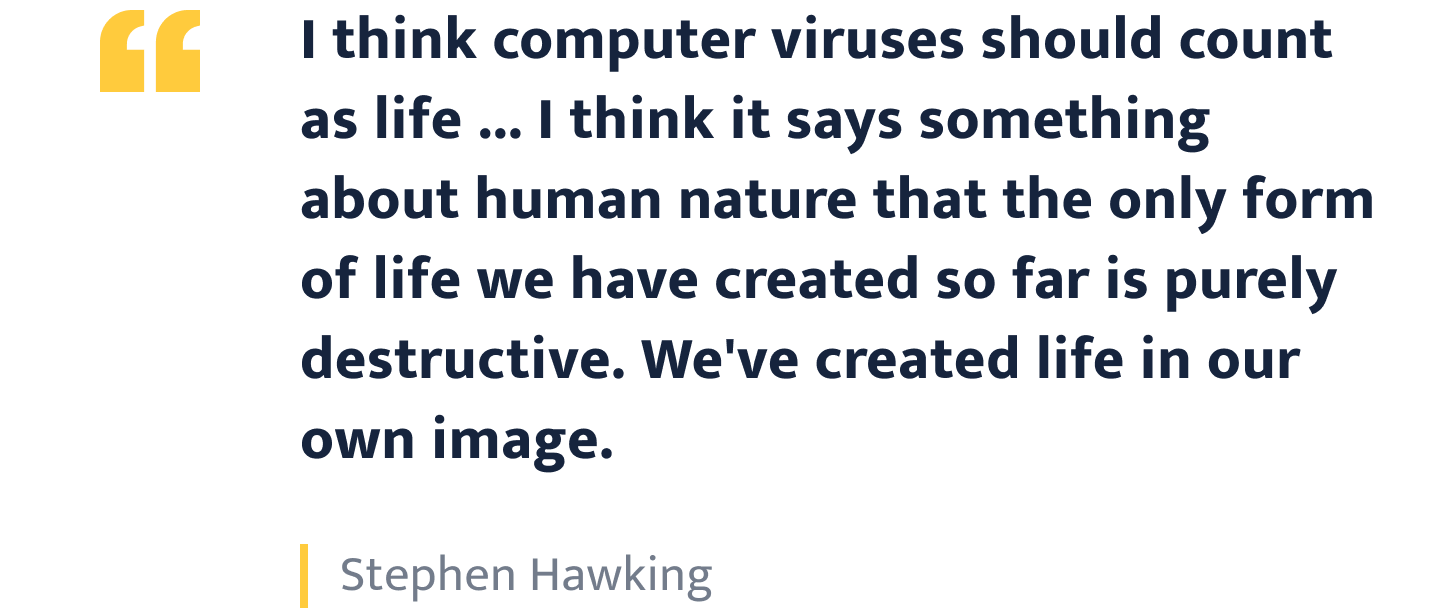
On the other hand, computer engineering maintains a computer’s body – hardware and software. It relies quite heavily on electrical engineering. And only the combination of computer science and engineering gives a full understanding of the machine.
If talking about trends and innovations, artificial intelligence development is probably the main one in the area of computer science technology. Big data is the field that has been extremely popular in recent years.
Cybersecurity is and will be one of the leading research fields in our Information Age. The latest trend in computer science and engineering is also virtual reality.
Computer Science Research Topics
If you want to find a good idea for your thesis or you are just preparing for a speech, check out this list of research topics in computer science and engineering:
- How are virtual reality & human perception connected?
- The future of computer-assisted education
- Computer science & high-dimensional data modeling
- Computer science: imperative vs. declarative languages
- The use of blockchain and AI for algorithmic regulations
- Banking industry & blockchain technology
- How does the machine architecture affect the efficiency of code?
- Languages for parallel computing
- How is mesh generation used for computational domains?
- Ways of persistent data structure optimization
- Sensor networks vs. cyber-physical system
- The development of computer graphics: non-photorealistic rendering case
- The development of the systems programming languages
- Game theory & network economics
- How can computational thinking affect science?
- Theoretical computer science in functional analysis
- The most efficient cryptographic protocols
- Software security types: an overview
- Is it possible to eliminate phishing?
- Floating point & programming language
Without energy, no technological progress is possible. Scientists are continually working on improving energy and power technologies. Recently, efforts have been aimed at three main areas.
Developing new batteries and fuel types helps create less expensive ways of storing energy. For example, fuel cells can be used for passenger buses. They need to be connected to a source of fuel to work. However, it guarantees the constant production of electricity as long as they have fuel.
One of the potential trends of the next years is hydrogen energy storage. This method is still in the stage of development. It would allow the use of hydrogen instead of electricity.
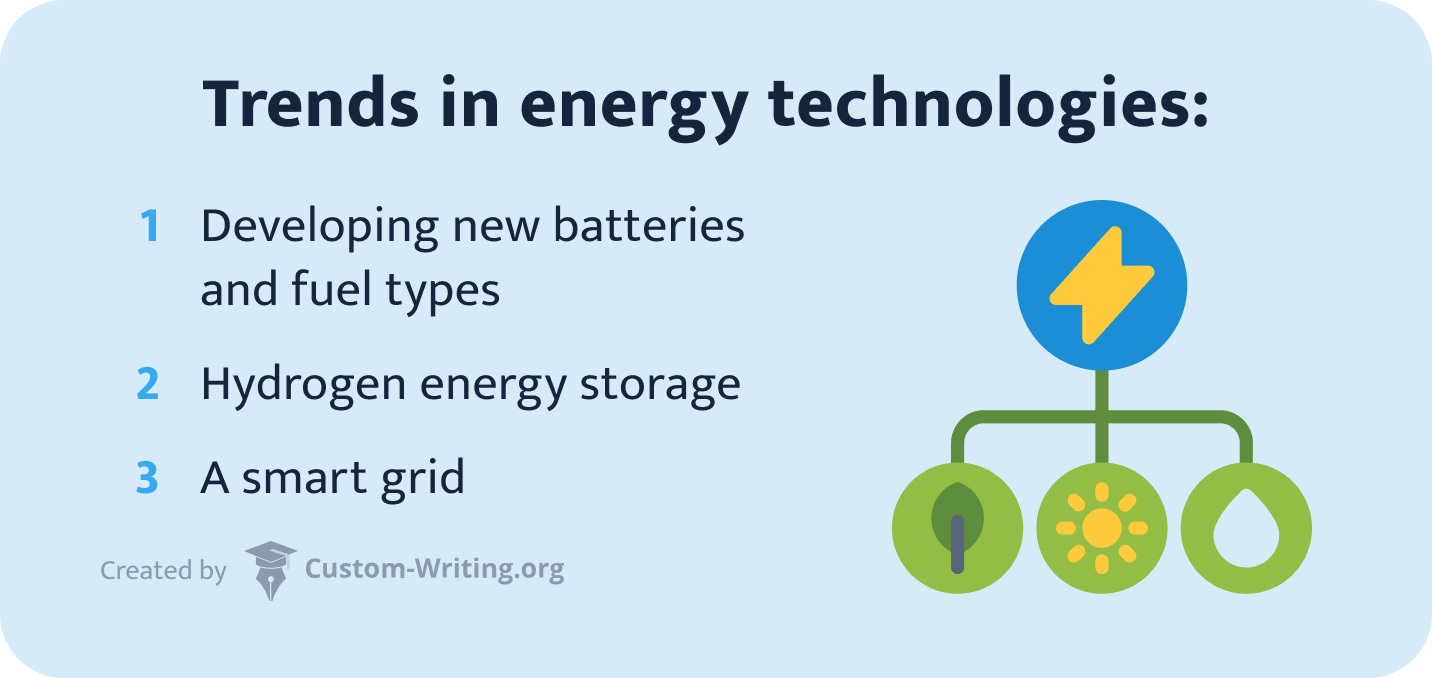
A smart grid is another area that uses information technology for the most efficient use of energy. For instance, the first-generation smart grid tracks the movement of electric energy on the go and sends the information back. It is a great way to correct the consumption of energy in real-time. More development is also done on the issue of electricity generation. It aims at technologies that can produce power from the sources that haven’t been used. The trends in this area include second-generation biofuels and photovoltaic glass.
Energy Technologies Research Topics
Since humanity cannot be using fossil fuels forever, the research in the area of energy can be extremely fruitful. The following list of energy and power technology research paper topics can give you an idea of where to dig:
- How can fuel cells be used for stationary power generation?
- Lithium-ion vs. lithium-air batteries: energy density
- Are lithium-air batteries better than gasoline?
- Renewable energy usage: advantages and disadvantages
- The nuclear power usage in the UAE
- India’s solar installations
- Gas price increasing and alternative energy sources
- How can methods of energy transformation be applied with hydrogen energy?
- Is hydrogen energy our future?
- Thermal storage & AC systems
- How to load balance using smart grid?
- Distributed energy generation to optimize power waste
- Is the smart energy network a solution to climate change ?
- The future of the tidal power
- The possibility of 3D printing of micro stirling engines
- How can robots be used to adjust solar panels to weather?
- Advanced biofuels & algae
- Can photovoltaic glass be fully transparent?
- Third-generation biofuels : algae vs. crop-based
- Space-based solar power: myth or reality of the future?
- Can smaller nuclear reactors be more efficient?
- Inertial confinement fusion & creal energy
- Renewable energy technologies: an overview
- How can thorium change the nuclear power field?
The way we get our food has changed drastically with the technological development. Manufacturers look for ways to feed 7.5 billion people more efficiently. And the demand is growing every year. Now technology is not only used for packaging, but for producing and processing food as well.
Introducing robots into the process of manufacturing brings multiple benefits to the producer. Not only do they make it more cost-efficient, but they also reduce safety problems.
Surprisingly enough, you can print food on the 3D printer now! This technology is applied to produce soft food for people who can’t chew. NASA decided to use it for fun as well and printed a pizza!
Drones now help farmers to keep an eye on crops from above. It helps them see the full picture and analyze the current state of the fields. For example, a drone can spot a starting disease and save the crop.
The newest eco trends push companies to become more environmentally aware. They use technologies to create safer packaging. The issue of food waste is also getting more and more relevant. Consumers want to know that nothing is wasted. Thanks to the new technologies, the excess food is now used more wisely.
Food Technology Research Topics
If you are looking for qualitative research topics about technology in the food industry, here is a list of ideas you don’t want to miss:
- What machines are used in the food industry?
- How do robots improve safety in butchery?
- Food industry & 3D printing
- 3D printed food – a solution to help people with swallowing disorder?
- Drones & precision agriculture
- How is robotics used to create eco-friendly food packaging ?
- Is micro packaging our future?
- The development of edible cling film

- Technology & food waste : what are the solutions?
- Additives and preservatives & human gut microbiome
- The effect of citric acid on the orange juice: physicochemical level
- Vegetable oils in mass production: compare & contrast
- Time-temperature indicators & food industry
- Conventional vs. hydroponic farming
- Food safety: a policy issue in agriculture today
- How to improve the detection of parasites in food?
- What are the newest technologies in the baking industry?
- Eliminating byproducts in edible oils production
- Cold plasma & biofilms
- How good are the antioxidant peptides derived from plants?
- Electronic nose in food industry and agriculture
- The harm of polyphenols in food
Why does the life expectancy of people get higher and higher every year? One of the main aspects of it is the promotion of innovation in the medical area. For example, the development of equipment helps medical professionals to save many lives.
Thanks to information technology, the work is much more structured now in the medical area. The hospitals use tablets and the method of electronic medical records. It helps them to access and share the data more efficiently.
If talking about medical devices, emerging technologies save more lives than ever! For instance, operations done by robots are getting more and more popular. Don’t worry! Doctors are still in charge; they just control the robots from the other room. It allows operations to be less invasive and precise.
Moreover, science not only helps treat diseases but also prevent them! The medical research aims for the development of vaccines against deadly illnesses like malaria.
Some of the projects even sound more like crazy ideas from the future. But it is all happening right now! Scientists are working on the creation of artificial organs and the best robotic prosthetics.
All the technologies mentioned above are critical for successful healthcare management.
Medical Technology Research Topics
If you feel like saving lives is the purpose of your life, then technological research topics in the medical area are for you! These topics would also suit for your research paper:
- How effective are robotic surgeries ?
- Smart inhalers as the new solution for asthma treatment
- Genetic counseling – a new way of preventing diseases?
- The benefits of the electronic medical records
- Erythrocytapheresis to treat sickle cell disease
- Defibrillator & cardiac resynchronization therapy
- Why do drug-eluting stents fail?
- Dissolvable brain sensors: an overview
- 3D printing for medical purposes
- How soon will we be able to create artificial organs?
- Wearable technologies & healthcare
- Precision medicine based on genetics
- Virtual reality devices for educational purposes in medical schools
- The development of telemedicine
- Clustered regularly interspaced short palindromic repeats as the way of treating diseases
- Nanotechnology & cancer treatment
- How safe is genome editing?
- The trends in electronic diagnostic tools development
- The future of the brain-machine interface
- How does wireless communication help medical professionals in hospitals?
In the past years, technologies have been drastically changing the pharmaceutical industry. Now, a lot of processes are optimized with the help of information technology. The ways of prescribing and distributing medications are much more efficient today. Moreover, the production of medicines itself has changed.
For instance, electronic prior authorization is now applied by more than half of the pharmacies. It makes the process of acquiring prior authorization much faster and easier.
The high price of medicines is the number one reason why patients stop using prescriptions. Real-time pharmacy benefit may be the solution! It is a system that gives another perspective for the prescribers. While working with individual patients, they will be able to consider multiple factors with the help of data provided.
The pharmaceutical industry also adopts some new technologies to compete on the international level. They apply advanced data analytics to optimize their work.
Companies try to reduce the cost and boost the effectiveness of the medicines. That is why they look into technologies that help avoid failures in the final clinical trials.
The constant research in the area of pharma is paying off. New specialty drugs and therapies arrive to treat chronic diseases. However, there are still enough opportunities for development.
Pharmaceutical Technologies Research Topics
Following the latest trends in the pharmaceutical area, this list offers a wide range of creative research topics on pharmaceutical technologies:
- Electronic prior authorization as a pharmacy technological trend
- The effectiveness of medication therapy management
- Medication therapy management & health information exchanges
- Electronic prescribing of controlled substances as a solution for drug abuse issue
- Do prescription drug monitoring programs really work?
- How can pharmacists help with meaningful use?
- NCPDP script standard for specialty pharmacies
- Pharmaceutical technologies & specialty medications
- What is the patient’s interest in the real-time pharmacy?
- The development of the vaccines for AIDS
- Phenotypic screening in pharmaceutical researches
- How does cloud ERP help pharmaceutical companies with analytics?
- Data security & pharmaceutical technologies
- An overview of the DNA-encoded library technology
- Pharmaceutical technologies: antibiotics vs. superbugs
- Personalized medicine: body-on-a-chip approach
- The future of cannabidiol medication in pain management
- How is cloud technology beneficial for small pharmaceutical companies?
- A new perspective on treatment: medicines from plants
- Anticancer nanomedicine: a pharmaceutical hope
🚈 Transportation Technologies
We used to be focused on making transportation more convenient. However, nowadays, the focus is slowly switching to ecological issues.
It doesn’t mean that vehicles can’t be comfortable at the same time. That is why the development of electric and self-driving cars is on the peak.
Transportation technologies also address the issues of safety and traffic jams. There are quite many solutions suggested. However, it would be hard for big cities to switch to the other systems fast.
One of the solutions is using shared vehicle phone applications. It allows reducing the number of private cars on the roads. On the other hand, if more people start preferring private vehicles, it may cause even more traffic issues.
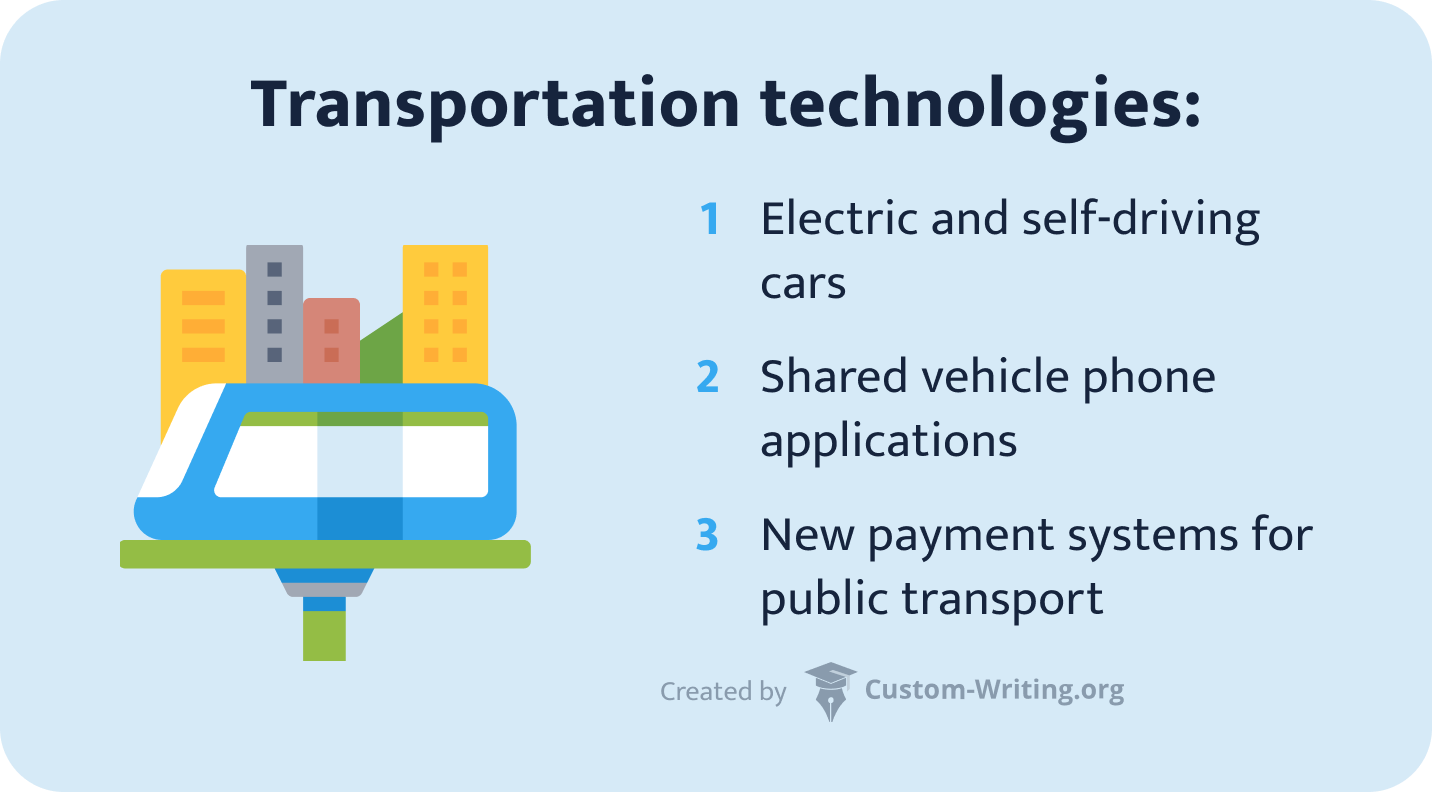
The most innovative cities even start looking for more eco-friendly solutions for public transport. Buses are being replaced by electric ones. At the same time, the latest trend is using private electric vehicles such as scooters and bikes.
So that people use public transport more, it should be more accessible and comfortable. That is why the payment systems are also being updated. Now, all you would need is to download an app and buy a ticket in one click!
Transportation Technologies Research Topics
Here you can find the best information technology research topics related to transportation technologies:
- How safe are self-driving cars ?
- Electric vs. hybrid cars : compare & contrast
- How to save your smart car from being hijacked?
- How do next-generation GPS devices adjust the route for traffic?
- Transportation technologies: personal transportation pods
- High-speed rail networks in Japan
- Cell phones during driving: threats and solutions
- Transportation: electric cars effects
- Teleportation: physics of the impossible
- How soon we will see Elon Musk’s Hyperloop?
- Gyroscopes as a solution for convenient public transportation
- Electric trucks: the effect on logistics
- Why were electric scooters banned in some cities in 2018?
- Carbon fiber as an optional material for unit load devices
- What are the benefits of the advanced transportation management systems?
- How to make solar roadways more cost-effective?
- How is blockchain applied in the transportation industry
- Transportation technologies: an overview of the freight check-in
- How do delivery companies use artificial intelligence?
- Water-fueled cars: the technology of future or fantasy?
- What can monitoring systems be used to manage curb space?
- Inclusivity and accessibility in public transport: an overview
- The development of the mobility-as-a-service
All in all, this article is a compilation of the 204 most interesting research topics on technology and computer science. It is a perfect source of inspiration for anyone who is interested in doing research in this area.
We have divided the topics by specific areas, which makes it easier for you to find your favorite one. There are 20 topics in each category, along with a short explanation of the most recent trends in the area.
You can choose one topic from artificial intelligence research topics and start working on it right away! There is also a wide selection of questions on biotechnology and engineering that are waiting to be answered.
Since media and communications are present in our everyday life and develop very fast, you should look into this area. But if you want to make a real change, you can’t miss on researching medical and pharmaceutical, food and energy, and transportation areas.
Of course, you are welcome to customize the topic you choose! The more creativity, the better! Maybe your research has the power to change something! Good luck, and have fun!
This might be interesting for you:
- 280 Good Nursing Research Topics & Questions
- 226 Research Topics on Criminal Justice & Criminology
- 178 Best Research Titles about Cookery & Food
- 497 Interesting History Topics to Research
- 180 Best Education Research Topics & Ideas
- 110+ Micro- & Macroeconomics Research Topics
- 417 Business Research Topics for ABM Students
- 190+ Research Topics on Psychology & Communication
- 512 Research Topics on HumSS
- 281 Best Health & Medical Research Topics
- 501 Research Questions & Titles about Science
- A List of Research Topics for Students. Unique and Interesting
- Good Research Topics, Titles and Ideas for Your Paper
- Databases for Research & Education: Gale
- The Complete Beginners’ Guide to Artificial Intelligence: Forbes
- 8 Best Topics for Research and Thesis in Artificial Intelligence: GeeksForGeeks
- Technology Is Changing Transportation, and Cities Should Adapt: Harvard Business Review
- Five Technology Trends: Changing Pharmacy Practice Today and Tomorrow (Pharmacy Times)
- Recent papers in Technology: Academia
- Research: Michigan Tech
- What 126 studies say about education technology: MIT News
- Top 5 Topics in Information Technology: King University Online
- Research in Technology Education-Some Areas of Need: Virginia Tech
- Undergraduate Research Topics: Department of Computer Science, Princeton University
- Student topics: QUT Science and Engineering
- Developing research questions: Monash University
- Biotechnology: Definition, Examples, & Applications (Britannica)
- Medical Laboratory Science Student Research Projects: Rush University
- Clinical Laboratory Science: Choosing a Research Topic (Library Resource Guide for FGCU Clinical Lab Science students)
- Share to Facebook
- Share to Twitter
- Share to LinkedIn
- Share to email
![best research topics programming Research Proposal Topics: 503 Ideas, Sample, & Guide [2024]](https://custom-writing.org/blog/wp-content/uploads/2021/01/woman-making-notes-284x153.jpg)
Do you have to write a research proposal and can’t choose one from the professor’s list? This article may be exactly what you need. We will provide you with the most up-to-date undergraduate and postgraduate topic ideas. Moreover, we will share the secrets of the winning research proposal writing. Here,...

A history class can become a jumble of years, dates, odd moments, and names of people who have been dead for centuries. Despite this, you’ll still need to find history topics to write about. You may have no choice! But once in a while, your instructor may let you pick...
![best research topics programming 150 Argumentative Research Paper Topics [2024 Upd.]](https://custom-writing.org/blog/wp-content/uploads/2021/01/close-up-magnifier-glass-yellow-background-284x153.jpg)
Argumentative research paper topics are a lot easier to find than to come up with. We always try to make your life easier. That’s why you should feel free to check out this list of the hottest and most controversial argumentative essay topics for 2024. In the article prepared by...

One of the greatest problems of the scholarly world is the lack of funny topics. So why not jazz it up? How about creating one of those humorous speeches the public is always so delighted to listen to? Making a couple of funny informative speech topics or coming up with...
![best research topics programming Gun Control Argumentative Essay: 160 Topics + How-to Guide [2024]](https://custom-writing.org/blog/wp-content/uploads/2021/01/bullets-gun-black-velvet-desk-284x153.jpg)
After the recent heartbreaking mass shootings, the gun control debate has reached its boiling point. Do we need stricter gun control laws? Should everyone get a weapon to oppose crime? Or should guns be banned overall? You have the opportunity to air your opinion in a gun control argumentative essay....
![best research topics programming Best Childhood Memories Essay Ideas: 94 Narrative Topics [2024]](https://custom-writing.org/blog/wp-content/uploads/2021/01/child-working-in-cambodia-284x153.jpg)
Many people believe that childhood is the happiest period in a person’s life. It’s not hard to see why. Kids have nothing to care or worry about, have almost no duties or problems, and can hang out with their friends all day long. An essay about childhood gives an opportunity...
![best research topics programming A List of 272 Informative Speech Topics: Pick Only Awesome Ideas! [2024]](https://custom-writing.org/blog/wp-content/uploads/2021/01/meeting-room-professional-meeting-284x153.jpg)
Just when you think you’re way past the question “How to write an essay?” another one comes. That’s the thing students desperately Google: “What is an informative speech?” And our custom writing experts are here to help you sort this out. Informative speaking is a speech on a completely new issue....
![best research topics programming 435 Literary Analysis Essay Topics and Prompts [2024 Upd]](https://custom-writing.org/blog/wp-content/uploads/2021/01/girl-having-idea-with-copy-space-284x153.jpg)
Literature courses are about two things: reading and writing about what you’ve read. For most students, it’s hard enough to understand great pieces of literature, never mind analyzing them. And with so many books and stories out there, choosing one to write about can be a chore. But you’re in...
![best research topics programming 335 Unique Essay Topics for College Students [2024 Update]](https://custom-writing.org/blog/wp-content/uploads/2021/01/smiling-students-walking-after-lessons1-284x153.jpg)
The success of any college essay depends on the topic choice. If you want to impress your instructors, your essay needs to be interesting and unique. Don’t know what to write about? We are here to help you! In this article by our Custom-Writing.org team, you will find 335 interesting...

Social studies is an integrated research field. It includes a range of topics on social science and humanities, such as history, culture, geography, sociology, education, etc. A social studies essay might be assigned to any middle school, high school, or college student. It might seem like a daunting task, but...

If you are about to go into the world of graduate school, then one of the first things you need to do is choose from all the possible dissertation topics available to you. This is no small task. You are likely to spend many years researching your Master’s or Ph.D....

Looking for a good argumentative essay topic? In need of a persuasive idea for a research paper? You’ve found the right page! Academic writing is never easy, whether it is for middle school or college. That’s why there are numerous educational materials on composing an argumentative and persuasive essay, for...
Thanks so much for this! Glad I popped by and I sure did find what I was looking for.

Thanks for your kind words, Sanny! We look forward to seeing you again!
Thank you very for the best topics of research across all science and art projects. The best thing that I am interested to is computer forensics and security specifically for IT students.
Computer science focuses on creating programs and applications, while information technology focuses on using computer systems and networks. What computer science jobs are there. It includes software developers, web developers, software engineers, and data scientists.
Research Topics & Ideas: Healthcare
100+ Healthcare Research Topic Ideas To Fast-Track Your Project

Finding and choosing a strong research topic is the critical first step when it comes to crafting a high-quality dissertation, thesis or research project. If you’ve landed on this post, chances are you’re looking for a healthcare-related research topic , but aren’t sure where to start. Here, we’ll explore a variety of healthcare-related research ideas and topic thought-starters across a range of healthcare fields, including allopathic and alternative medicine, dentistry, physical therapy, optometry, pharmacology and public health.
NB – This is just the start…
The topic ideation and evaluation process has multiple steps . In this post, we’ll kickstart the process by sharing some research topic ideas within the healthcare domain. This is the starting point, but to develop a well-defined research topic, you’ll need to identify a clear and convincing research gap , along with a well-justified plan of action to fill that gap.
If you’re new to the oftentimes perplexing world of research, or if this is your first time undertaking a formal academic research project, be sure to check out our free dissertation mini-course. In it, we cover the process of writing a dissertation or thesis from start to end. Be sure to also sign up for our free webinar that explores how to find a high-quality research topic.
Overview: Healthcare Research Topics
- Allopathic medicine
- Alternative /complementary medicine
- Veterinary medicine
- Physical therapy/ rehab
- Optometry and ophthalmology
- Pharmacy and pharmacology
- Public health
- Examples of healthcare-related dissertations
Allopathic (Conventional) Medicine
- The effectiveness of telemedicine in remote elderly patient care
- The impact of stress on the immune system of cancer patients
- The effects of a plant-based diet on chronic diseases such as diabetes
- The use of AI in early cancer diagnosis and treatment
- The role of the gut microbiome in mental health conditions such as depression and anxiety
- The efficacy of mindfulness meditation in reducing chronic pain: A systematic review
- The benefits and drawbacks of electronic health records in a developing country
- The effects of environmental pollution on breast milk quality
- The use of personalized medicine in treating genetic disorders
- The impact of social determinants of health on chronic diseases in Asia
- The role of high-intensity interval training in improving cardiovascular health
- The efficacy of using probiotics for gut health in pregnant women
- The impact of poor sleep on the treatment of chronic illnesses
- The role of inflammation in the development of chronic diseases such as lupus
- The effectiveness of physiotherapy in pain control post-surgery

Topics & Ideas: Alternative Medicine
- The benefits of herbal medicine in treating young asthma patients
- The use of acupuncture in treating infertility in women over 40 years of age
- The effectiveness of homoeopathy in treating mental health disorders: A systematic review
- The role of aromatherapy in reducing stress and anxiety post-surgery
- The impact of mindfulness meditation on reducing high blood pressure
- The use of chiropractic therapy in treating back pain of pregnant women
- The efficacy of traditional Chinese medicine such as Shun-Qi-Tong-Xie (SQTX) in treating digestive disorders in China
- The impact of yoga on physical and mental health in adolescents
- The benefits of hydrotherapy in treating musculoskeletal disorders such as tendinitis
- The role of Reiki in promoting healing and relaxation post birth
- The effectiveness of naturopathy in treating skin conditions such as eczema
- The use of deep tissue massage therapy in reducing chronic pain in amputees
- The impact of tai chi on the treatment of anxiety and depression
- The benefits of reflexology in treating stress, anxiety and chronic fatigue
- The role of acupuncture in the prophylactic management of headaches and migraines

Topics & Ideas: Dentistry
- The impact of sugar consumption on the oral health of infants
- The use of digital dentistry in improving patient care: A systematic review
- The efficacy of orthodontic treatments in correcting bite problems in adults
- The role of dental hygiene in preventing gum disease in patients with dental bridges
- The impact of smoking on oral health and tobacco cessation support from UK dentists
- The benefits of dental implants in restoring missing teeth in adolescents
- The use of lasers in dental procedures such as root canals
- The efficacy of root canal treatment using high-frequency electric pulses in saving infected teeth
- The role of fluoride in promoting remineralization and slowing down demineralization
- The impact of stress-induced reflux on oral health
- The benefits of dental crowns in restoring damaged teeth in elderly patients
- The use of sedation dentistry in managing dental anxiety in children
- The efficacy of teeth whitening treatments in improving dental aesthetics in patients with braces
- The role of orthodontic appliances in improving well-being
- The impact of periodontal disease on overall health and chronic illnesses

Tops & Ideas: Veterinary Medicine
- The impact of nutrition on broiler chicken production
- The role of vaccines in disease prevention in horses
- The importance of parasite control in animal health in piggeries
- The impact of animal behaviour on welfare in the dairy industry
- The effects of environmental pollution on the health of cattle
- The role of veterinary technology such as MRI in animal care
- The importance of pain management in post-surgery health outcomes
- The impact of genetics on animal health and disease in layer chickens
- The effectiveness of alternative therapies in veterinary medicine: A systematic review
- The role of veterinary medicine in public health: A case study of the COVID-19 pandemic
- The impact of climate change on animal health and infectious diseases in animals
- The importance of animal welfare in veterinary medicine and sustainable agriculture
- The effects of the human-animal bond on canine health
- The role of veterinary medicine in conservation efforts: A case study of Rhinoceros poaching in Africa
- The impact of veterinary research of new vaccines on animal health
Topics & Ideas: Physical Therapy/Rehab
- The efficacy of aquatic therapy in improving joint mobility and strength in polio patients
- The impact of telerehabilitation on patient outcomes in Germany
- The effect of kinesiotaping on reducing knee pain and improving function in individuals with chronic pain
- A comparison of manual therapy and yoga exercise therapy in the management of low back pain
- The use of wearable technology in physical rehabilitation and the impact on patient adherence to a rehabilitation plan
- The impact of mindfulness-based interventions in physical therapy in adolescents
- The effects of resistance training on individuals with Parkinson’s disease
- The role of hydrotherapy in the management of fibromyalgia
- The impact of cognitive-behavioural therapy in physical rehabilitation for individuals with chronic pain
- The use of virtual reality in physical rehabilitation of sports injuries
- The effects of electrical stimulation on muscle function and strength in athletes
- The role of physical therapy in the management of stroke recovery: A systematic review
- The impact of pilates on mental health in individuals with depression
- The use of thermal modalities in physical therapy and its effectiveness in reducing pain and inflammation
- The effect of strength training on balance and gait in elderly patients
Topics & Ideas: Optometry & Opthalmology
- The impact of screen time on the vision and ocular health of children under the age of 5
- The effects of blue light exposure from digital devices on ocular health
- The role of dietary interventions, such as the intake of whole grains, in the management of age-related macular degeneration
- The use of telemedicine in optometry and ophthalmology in the UK
- The impact of myopia control interventions on African American children’s vision
- The use of contact lenses in the management of dry eye syndrome: different treatment options
- The effects of visual rehabilitation in individuals with traumatic brain injury
- The role of low vision rehabilitation in individuals with age-related vision loss: challenges and solutions
- The impact of environmental air pollution on ocular health
- The effectiveness of orthokeratology in myopia control compared to contact lenses
- The role of dietary supplements, such as omega-3 fatty acids, in ocular health
- The effects of ultraviolet radiation exposure from tanning beds on ocular health
- The impact of computer vision syndrome on long-term visual function
- The use of novel diagnostic tools in optometry and ophthalmology in developing countries
- The effects of virtual reality on visual perception and ocular health: an examination of dry eye syndrome and neurologic symptoms
Topics & Ideas: Pharmacy & Pharmacology
- The impact of medication adherence on patient outcomes in cystic fibrosis
- The use of personalized medicine in the management of chronic diseases such as Alzheimer’s disease
- The effects of pharmacogenomics on drug response and toxicity in cancer patients
- The role of pharmacists in the management of chronic pain in primary care
- The impact of drug-drug interactions on patient mental health outcomes
- The use of telepharmacy in healthcare: Present status and future potential
- The effects of herbal and dietary supplements on drug efficacy and toxicity
- The role of pharmacists in the management of type 1 diabetes
- The impact of medication errors on patient outcomes and satisfaction
- The use of technology in medication management in the USA
- The effects of smoking on drug metabolism and pharmacokinetics: A case study of clozapine
- Leveraging the role of pharmacists in preventing and managing opioid use disorder
- The impact of the opioid epidemic on public health in a developing country
- The use of biosimilars in the management of the skin condition psoriasis
- The effects of the Affordable Care Act on medication utilization and patient outcomes in African Americans
Topics & Ideas: Public Health
- The impact of the built environment and urbanisation on physical activity and obesity
- The effects of food insecurity on health outcomes in Zimbabwe
- The role of community-based participatory research in addressing health disparities
- The impact of social determinants of health, such as racism, on population health
- The effects of heat waves on public health
- The role of telehealth in addressing healthcare access and equity in South America
- The impact of gun violence on public health in South Africa
- The effects of chlorofluorocarbons air pollution on respiratory health
- The role of public health interventions in reducing health disparities in the USA
- The impact of the United States Affordable Care Act on access to healthcare and health outcomes
- The effects of water insecurity on health outcomes in the Middle East
- The role of community health workers in addressing healthcare access and equity in low-income countries
- The impact of mass incarceration on public health and behavioural health of a community
- The effects of floods on public health and healthcare systems
- The role of social media in public health communication and behaviour change in adolescents
Examples: Healthcare Dissertation & Theses
While the ideas we’ve presented above are a decent starting point for finding a healthcare-related research topic, they are fairly generic and non-specific. So, it helps to look at actual dissertations and theses to see how this all comes together.
Below, we’ve included a selection of research projects from various healthcare-related degree programs to help refine your thinking. These are actual dissertations and theses, written as part of Master’s and PhD-level programs, so they can provide some useful insight as to what a research topic looks like in practice.
- Improving Follow-Up Care for Homeless Populations in North County San Diego (Sanchez, 2021)
- On the Incentives of Medicare’s Hospital Reimbursement and an Examination of Exchangeability (Elzinga, 2016)
- Managing the healthcare crisis: the career narratives of nurses (Krueger, 2021)
- Methods for preventing central line-associated bloodstream infection in pediatric haematology-oncology patients: A systematic literature review (Balkan, 2020)
- Farms in Healthcare: Enhancing Knowledge, Sharing, and Collaboration (Garramone, 2019)
- When machine learning meets healthcare: towards knowledge incorporation in multimodal healthcare analytics (Yuan, 2020)
- Integrated behavioural healthcare: The future of rural mental health (Fox, 2019)
- Healthcare service use patterns among autistic adults: A systematic review with narrative synthesis (Gilmore, 2021)
- Mindfulness-Based Interventions: Combatting Burnout and Compassionate Fatigue among Mental Health Caregivers (Lundquist, 2022)
- Transgender and gender-diverse people’s perceptions of gender-inclusive healthcare access and associated hope for the future (Wille, 2021)
- Efficient Neural Network Synthesis and Its Application in Smart Healthcare (Hassantabar, 2022)
- The Experience of Female Veterans and Health-Seeking Behaviors (Switzer, 2022)
- Machine learning applications towards risk prediction and cost forecasting in healthcare (Singh, 2022)
- Does Variation in the Nursing Home Inspection Process Explain Disparity in Regulatory Outcomes? (Fox, 2020)
Looking at these titles, you can probably pick up that the research topics here are quite specific and narrowly-focused , compared to the generic ones presented earlier. This is an important thing to keep in mind as you develop your own research topic. That is to say, to create a top-notch research topic, you must be precise and target a specific context with specific variables of interest . In other words, you need to identify a clear, well-justified research gap.
Need more help?
If you’re still feeling a bit unsure about how to find a research topic for your healthcare dissertation or thesis, check out Topic Kickstarter service below.

You Might Also Like:

15 Comments
I need topics that will match the Msc program am running in healthcare research please
Hello Mabel,
I can help you with a good topic, kindly provide your email let’s have a good discussion on this.
Can you provide some research topics and ideas on Immunology?
Thank you to create new knowledge on research problem verse research topic
Help on problem statement on teen pregnancy
This post might be useful: https://gradcoach.com/research-problem-statement/
can you provide me with a research topic on healthcare related topics to a qqi level 5 student
Please can someone help me with research topics in public health ?
Hello I have requirement of Health related latest research issue/topics for my social media speeches. If possible pls share health issues , diagnosis, treatment.
I would like a topic thought around first-line support for Gender-Based Violence for survivors or one related to prevention of Gender-Based Violence
Please can I be helped with a master’s research topic in either chemical pathology or hematology or immunology? thanks
Can u please provide me with a research topic on occupational health and safety at the health sector
Good day kindly help provide me with Ph.D. Public health topics on Reproductive and Maternal Health, interventional studies on Health Education
may you assist me with a good easy healthcare administration study topic
May you assist me in finding a research topic on nutrition,physical activity and obesity. On the impact on children
Submit a Comment Cancel reply
Your email address will not be published. Required fields are marked *
Save my name, email, and website in this browser for the next time I comment.
- Print Friendly
Purdue Online Writing Lab Purdue OWL® College of Liberal Arts
Welcome to the Purdue Online Writing Lab

Welcome to the Purdue OWL
This page is brought to you by the OWL at Purdue University. When printing this page, you must include the entire legal notice.
Copyright ©1995-2018 by The Writing Lab & The OWL at Purdue and Purdue University. All rights reserved. This material may not be published, reproduced, broadcast, rewritten, or redistributed without permission. Use of this site constitutes acceptance of our terms and conditions of fair use.
The Online Writing Lab at Purdue University houses writing resources and instructional material, and we provide these as a free service of the Writing Lab at Purdue. Students, members of the community, and users worldwide will find information to assist with many writing projects. Teachers and trainers may use this material for in-class and out-of-class instruction.
The Purdue On-Campus Writing Lab and Purdue Online Writing Lab assist clients in their development as writers—no matter what their skill level—with on-campus consultations, online participation, and community engagement. The Purdue Writing Lab serves the Purdue, West Lafayette, campus and coordinates with local literacy initiatives. The Purdue OWL offers global support through online reference materials and services.
A Message From the Assistant Director of Content Development
The Purdue OWL® is committed to supporting students, instructors, and writers by offering a wide range of resources that are developed and revised with them in mind. To do this, the OWL team is always exploring possibilties for a better design, allowing accessibility and user experience to guide our process. As the OWL undergoes some changes, we welcome your feedback and suggestions by email at any time.
Please don't hesitate to contact us via our contact page if you have any questions or comments.
All the best,
Social Media
Facebook twitter.
There’s a powerful story behind every headline at Ohio State Health & Discovery. As one of the largest academic health centers and health sciences campuses in the nation, we are uniquely positioned with renowned experts covering all aspects of health, wellness, science, research and education. Ohio State Health & Discovery brings this expertise together to deliver today’s most important health news and the deeper story behind the most powerful topics that affect the health of people, animals, society and the world. Like the science and discovery news you find here? You can support more innovations fueling advances across medicine, science, health and wellness by giving today.
BROUGHT TO YOU BY
- The Ohio State University
- College of Dentistry
- College of Medicine
- College of Nursing
- College of Optometry
- College of Pharmacy
- College of Public Health
- College of Veterinary Medicine
- Ohio State Wexner Medical Center
- Ohio State's Comprehensive Cancer Center – James Cancer Hospital and Solove Research Institute
Subscribe. The latest from Ohio State Health & Discovery delivered right to your inbox.
New Healthy Community Center transforms historic library into beacon of wellness
Senior Staff Writer, Photographer Ohio State Wexner Medical Center
- Share on Facebook
- Share on Linkedin
- Share via Email
- Share this page

On a bright, sunny afternoon in early May , nearly 300 members of Columbus’ Near East Side gathered to celebrate their new community center. Among the first to arrive was Ann B. Walker, a centenarian deeply woven into the fabric of the neighborhood.

Seated in the front row at the ribbon-cutting ceremony of The Ohio State University Wexner Medical Center Healthy Community Center, Walker looked thoughtfully at the transformation of the building located on Long Street in the historically Black neighborhood. Once bustling with readers as the Martin Luther King Jr. branch of the Columbus Metropolitan Library, the structure has been turned into a hub of health and wellness, thanks to a $5.1 million investment from The Ohio State University Wexner Medical Center , which will operate the community center.
Walker, who will turn 101 this year, had good reason to reminisce. As an award-winning TV journalist, she once interviewed Rev. Martin Luther King Jr.
“I was just thinking about how much things have changed,” Walker shares, her gaze lingering on an image of King Jr. installed in the building. “It’s great that it can now be used as a health center. There are people in the area who need services and don’t have access to them.”
The Healthy Community Center is more than just a building: it’s a hub for the neighborhood, focusing on promoting healthier lifestyles. With plans to host dietary and exercise workshops, health screenings and educational health programming, it’s a gathering space that’s geared to meet the real needs of the community.
From books to health: A legacy reimagined
“The history of this place begins with a longing to learn,” says Joshua Joseph, MD , the center’s medical director, at the opening ceremony.
He shared the center’s journey from its origin as the city’s East Side library in the 1960s. He recalled the words of Martin Luther King Sr., who spoke at the library’s dedication in 1969:
“You have a beautiful space conducive to reading, but books are worth nothing unless you read them.”

Dr. Joseph says those words are reflected in the building’s new purpose: “It’s a beautiful building, but it means nothing if it’s not filled every day with programming and people improving health and wellness."
Read about the events and programming taking place at the Healthy Community Center
Programming geared for a healthy community
The transformation was a true community effort, says the center’s director, Javonte McDonald. It required a commitment to understanding and meeting community needs, which influenced every aspect of the center, from the state-of-the-art teaching kitchen for nutrition classes to the café that supports local entrepreneurs to an art gallery that spotlights area artists.
“It will help address pressing needs in creative and collaborative ways to improve the health of the communities that we serve,” says John J. Warner, MD, chief executive officer of the Ohio State Wexner Medical Center and executive vice president at Ohio State.

Local artists contribute artwork displayed in the Healthy Community Center.

The Healthy Community Center helps fill a gap in providing access to healthy foods to area residents.

A demonstration kitchen will be used to teach healthy cooking and nutrition skills to community members.

Members of the community and leaders from the Ohio State Wexner Medical Center cut the ribbon for the grand opening of the Healthy Community Center.

The Healthy Community Center honors the legacy of the building's former use as the Martin Luther King Jr. branch of the Columbus Metropolitan Library.

Community members at the grand opening of the Healthy Community Center.
Dr. Joseph says his team is working closely with community partners to match services with community needs. “Ohio State has a vested interest in supporting healthy lifestyle changes so everyone has the opportunity to lead longer, healthier lives,” he says.
The Healthy Community Center will have a café with indoor and outdoor seating. The space will serve as a business incubator for an independent restaurant owner. The center’s partners include the Mid-Ohio Food Collective, Partners Achieving Community Transformation and the Growing and Growth Collective.
Longtime resident Pamela Shields, who founded the Urban Aging Residents Coalition, emphasized the center’s role in bridging health disparities .
“Our focus is health, wealth and wellness. We aim to get African Americans, people of color and marginalized groups healthy, attending their medical appointments and involved in research studies,” she says.

A neighborhood cornerstone
As the community looks ahead, the Healthy Community Center is set to become a bedrock of the Near East Side.

“My greatest hope is that the entire community sees this center as a resource,” says Julialynne Walker, with the Bronzeville Growers Market. She’s also Ann B. Walker’s daughter. “If everyone welcomes, embraces and uses it fully, we will see a change in our community’s health over time.”
Support initiatives that change lives like the Healthy Community Center
Your funding of the Ohio State Wexner Medical Center directly impacts our community.

- Community Health Care ,
- Community Outreach ,
- Community Resources ,
- Community Transformation ,
- Health and Wellness Center ,
- Healthy Communities ,
- Healthy Community Center ,
- Community Health
- Health and Society
Related websites
Articles on community health.

Making health equity more than a dream
By Alayna DeMartini
Obstacles along his life’s path made Chyke Doubeni, MD, MPH, dedicate his career to helping removing barriers so all people, regardless of their race or income, can be healthy.

Parenting’s new crisis: the loneliness epidemic
Survey points to a growing epidemic of loneliness among parents.
Family’s passion fuels healthy transitions for adults with autism
By Rebecca Walters
How Ohio State celebrates organ transplants as ‘Buckeyes for Life’
By Susannah Kistler
Our best pharmacy tips on insurance, prescriptions, discount cards and more
By Rebecca Lahrman, PharmD, MS, BCACP
Get articles and stories about health, wellness, medicine, science and education delivered right to your inbox from the experts at Ohio State.
Required fields
Tell us more about yourself
By clicking "Subscribe" you agree to our Terms of Use . Learn more about how we use your information by reading our Privacy Policy .

IMAGES
VIDEO
COMMENTS
This section offers a well-organized and extensive list of 1000 computer science thesis topics, designed to illuminate diverse pathways for academic inquiry and innovation. Whether your interest lies in the emerging trends of artificial intelligence or the practical applications of web development, this assortment spans 25 critical areas of ...
If you're searching for the best project topics for computer science students that will stand out in a journal, check below: Developments in human-computer interaction. Applications of computer science in medicine. Developments in artificial intelligence in image processing. Discuss cryptography and its applications.
Finding and choosing a strong research topic is the critical first step when it comes to crafting a high-quality dissertation, thesis or research project. If you've landed on this post, chances are you're looking for a computer science-related research topic, but aren't sure where to start.Here, we'll explore a variety of CompSci & IT-related research ideas and topic thought-starters ...
Neuron networks and machine learning. Big data analysis. Virtual reality and its connection to human perception. The success of computer-assisted education. Computer assistance in support services. Database architecture and management. Human-computer interactions. The importance of usability. The limits of computation and communication.
It is not so easy to get your hands on the best research topics for computer science; spend some time and read about the following mind-boggling ideas before selecting one. 1. Integrated Blockchain and Edge Computing Systems: A Survey, Some Research Issues, and Challenges.
Research areas: programming languages, program analysis, program verification, automated reasoning ... Software and best practices for computer science education and study, especially Princeton's 126/217/226 sequence or MOOCs development ... Independent Research Topics: Any other interesting project that involves humanitarian hacking ...
Computer Science Research Topics are as follows: Using machine learning to detect and prevent cyber attacks. Developing algorithms for optimized resource allocation in cloud computing. Investigating the use of blockchain technology for secure and decentralized data storage. Developing intelligent chatbots for customer service.
A programming language is a set of symbols whose strings are governed by rules apt to communicate instructions to a particular machine. Such strings may be concatenated into longer code and ...
Ben Marwick, University of Washington. Virtually every researcher relies on computers to collect or analyze data. But when computers are opaque black boxes that manipulate data, it's impossible ...
Using a combination of a guided introduction and more independent in-depth exploration, you will get to practice your new Python skills with various case studies chosen for their scientific breadth and their coverage of different Python features. This run of the course includes revised assessments and a new module on machine learning.
Mahmoud Abdolhoseini. , Murielle G. Kluge. & Sarah J. Johnson. Read the latest Research articles in Programming language from Scientific Reports.
These topics attempt to answer various computer science research questions and how they affect the tech industry and the larger world. Computer science research topics can be divided into several categories, such as artificial intelligence, big data and data science, human-computer interaction, security and privacy, and software engineering.
About the journal. Science of Computer Programming is dedicated to the distribution, via publication of papers and software, of research results in the areas of software systems development, use and maintenance, including the software aspects of hardware design. The journal has a wide scope ranging from the many facets of methodological ...
Looking for the best Programming topic for your essay or research? 💡 StudyCorgi has plenty of fresh and unique titles available for free. 👍 Check out this page! ... 👍 Good Programming Research Topics & Essay Examples. On-time delivery! Get your 100% customized paper done in as little as 1 hour.
1. Introduction. To learn computer programming is part of many study programmes in higher education. A multitude of reports of high failure and dropout rates (Ben-Ari Citation 1998; McCracken et al. Citation 2001; Robins, Rountree, and Rountree Citation 2003; Lister et al. Citation 2004; Kinnunen and Malmi Citation 2006; Kinnunen Citation 2009; Sorva Citation 2013) indicate that students ...
In Programming Languages research, we explore the ways in which computations are expressed in written form. Our research focuses on three central ideas: the semantics of a particular piece of program and its relationships with surrounding parts, the efficiency of a program's execution, and the design of programming languages that enable people to express their ideas accurately.
This article presents a review of research trends in programming education. It is based on examining 162 empirical research articles published in eminent educational science journals. The novelty of this work is represented by programming education research in the context of demographic, methodological, and study results.
There's certainly no shortage of opportunities to develop real-world applications of the technology, and there's immense scope for break-through moments in this field. 2. Big data analytics. Back in 2012, the Harvard Business Review branded data science the 'sexiest job' of the 21 century. Yes, you read that correctly.
1000+ FREE Research Topics & Title Ideas. If you're at the start of your research journey and are trying to figure out which research topic you want to focus on, you've come to the right place. Select your area of interest below to view a comprehensive collection of potential research ideas. AI & Machine Learning. Blockchain & Cryptocurrency.
113 Great Research Paper Topics. One of the hardest parts of writing a research paper can be just finding a good topic to write about. Fortunately we've done the hard work for you and have compiled a list of 113 interesting research paper topics. They've been organized into ten categories and cover a wide range of subjects so you can easily ...
3. System Design. This is another crucial topic you need to prepare well for your programming job interviews, especially at big tech companies like Google, Microsoft, Amazon, and Facebook.You need ...
Communications and media are developing super fast as well. The research is also done in areas that make our lives better and more comfortable. The list of them includes transport, food and energy, medical, and pharmaceutical areas. So check out our list of 204 most relevant computer science research topics below.
Finding and choosing a strong research topic is the critical first step when it comes to crafting a high-quality dissertation, thesis or research project. If you've landed on this post, chances are you're looking for a healthcare-related research topic, but aren't sure where to start. Here, we'll explore a variety of healthcare-related research ideas and topic thought-starters across a ...
Mission. The Purdue On-Campus Writing Lab and Purdue Online Writing Lab assist clients in their development as writers—no matter what their skill level—with on-campus consultations, online participation, and community engagement. The Purdue Writing Lab serves the Purdue, West Lafayette, campus and coordinates with local literacy initiatives.
Ohio State Wexner Medical Center. May 14, 2024. On a bright, sunny afternoon in early May, nearly 300 members of Columbus' Near East Side gathered to celebrate their new community center. Among the first to arrive was Ann B. Walker, a centenarian deeply woven into the fabric of the neighborhood. Seated in the front row at the ribbon-cutting ...